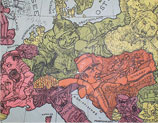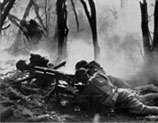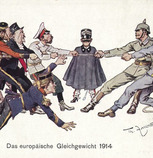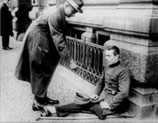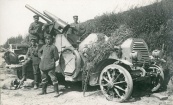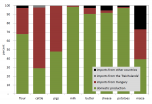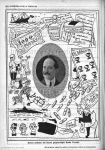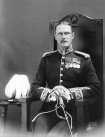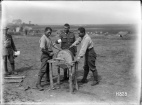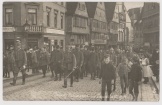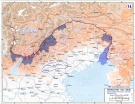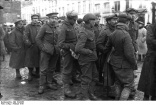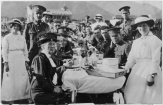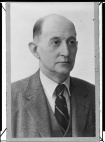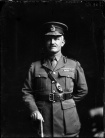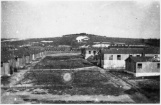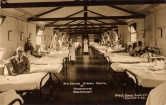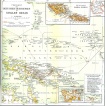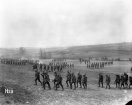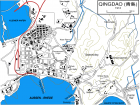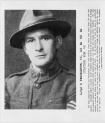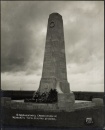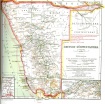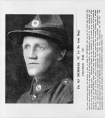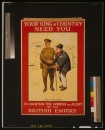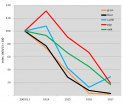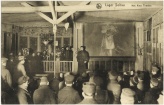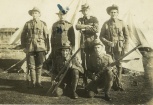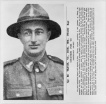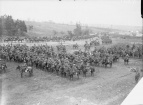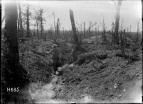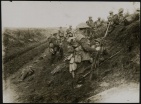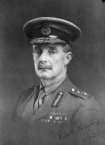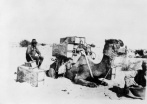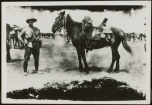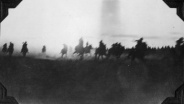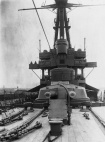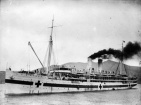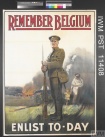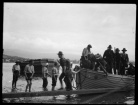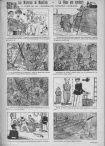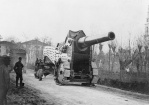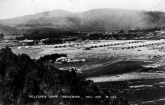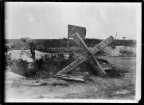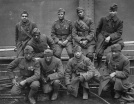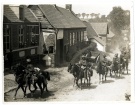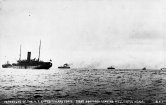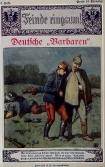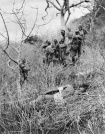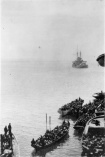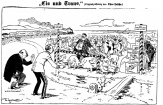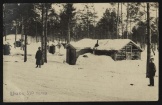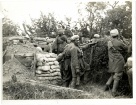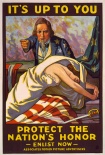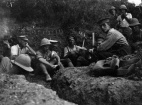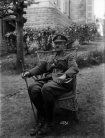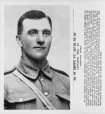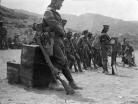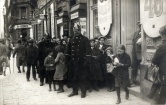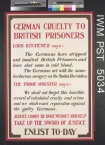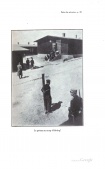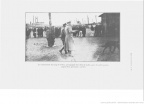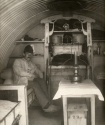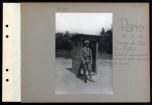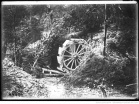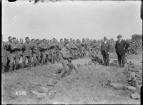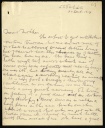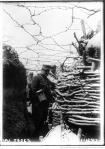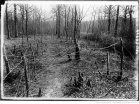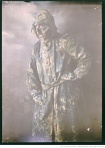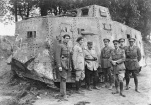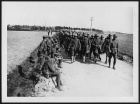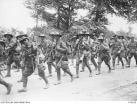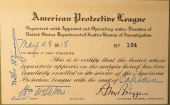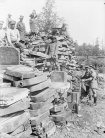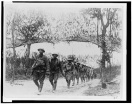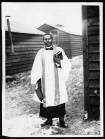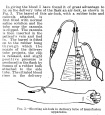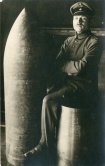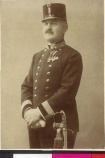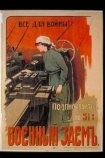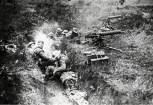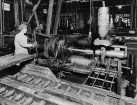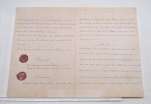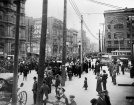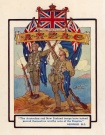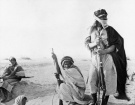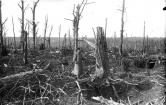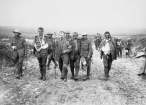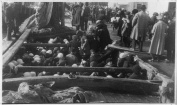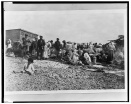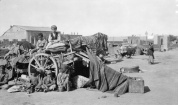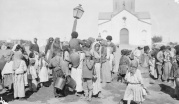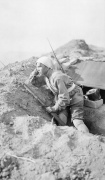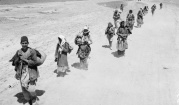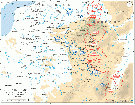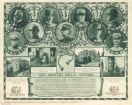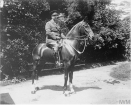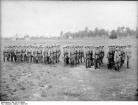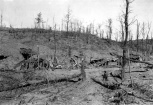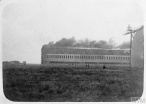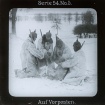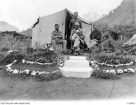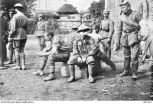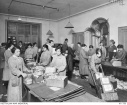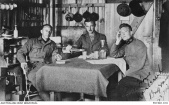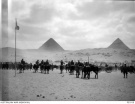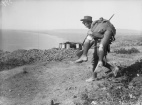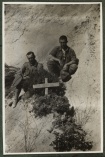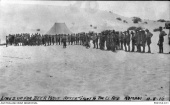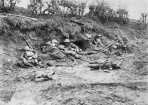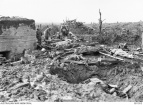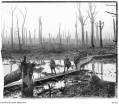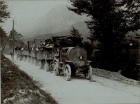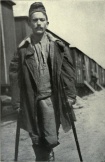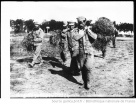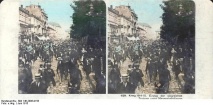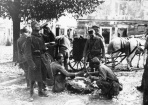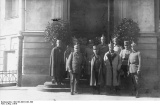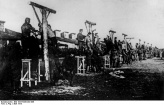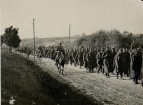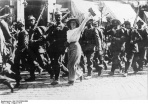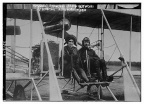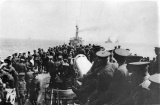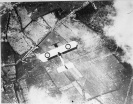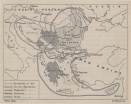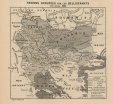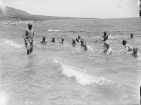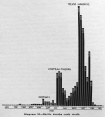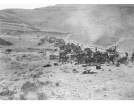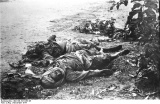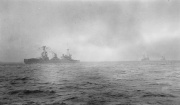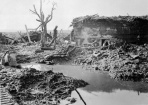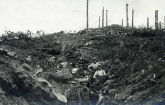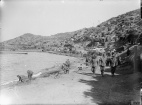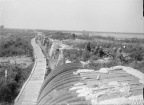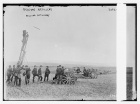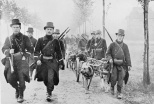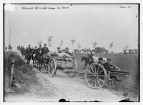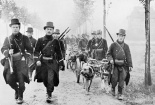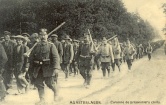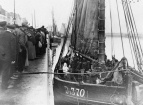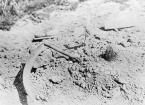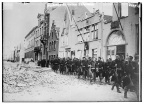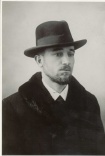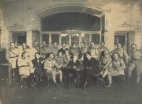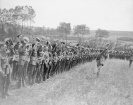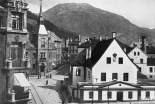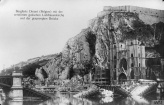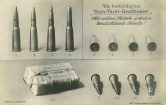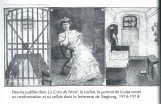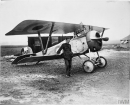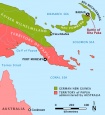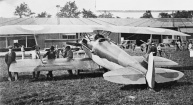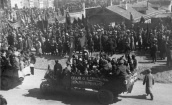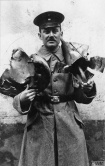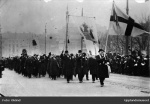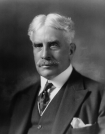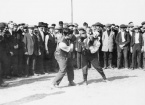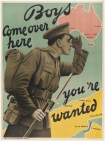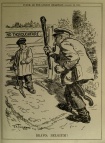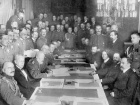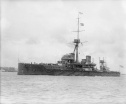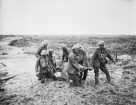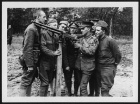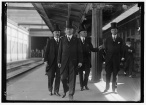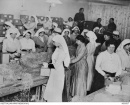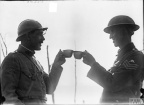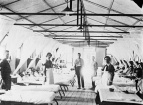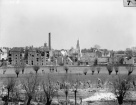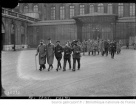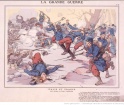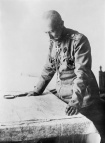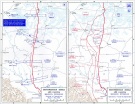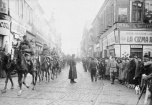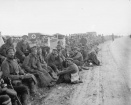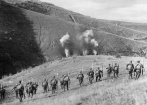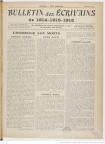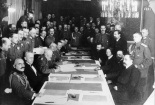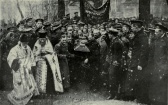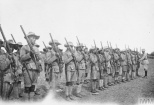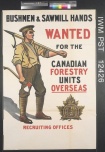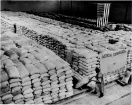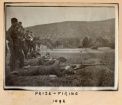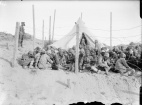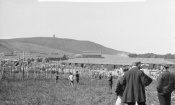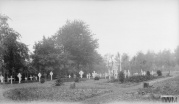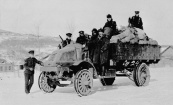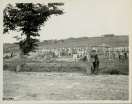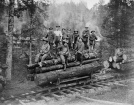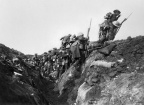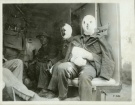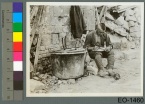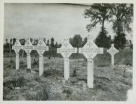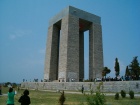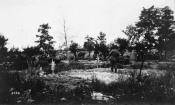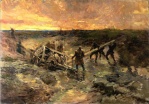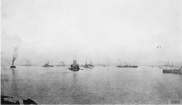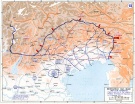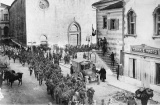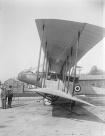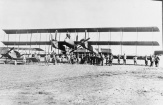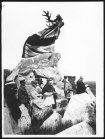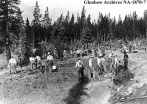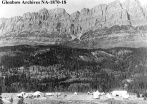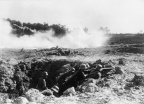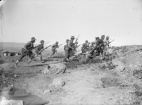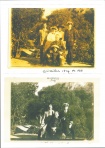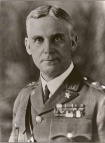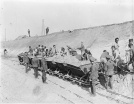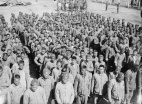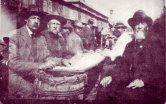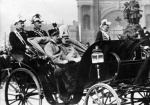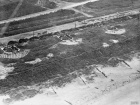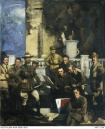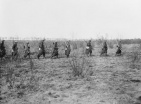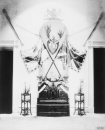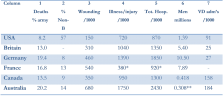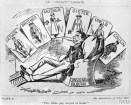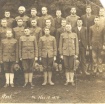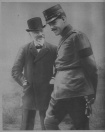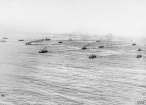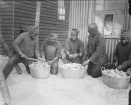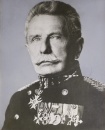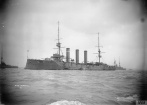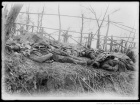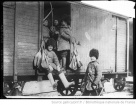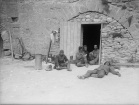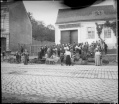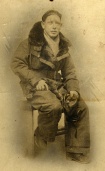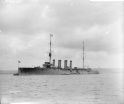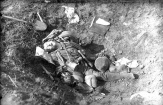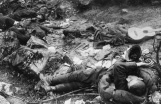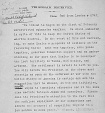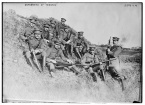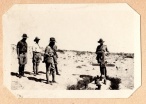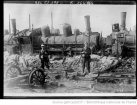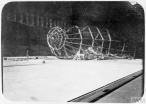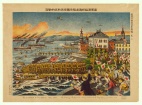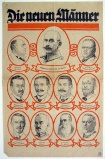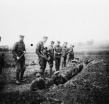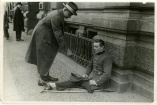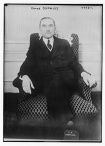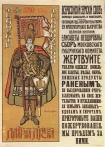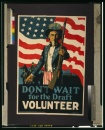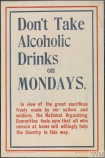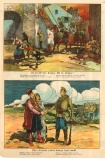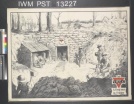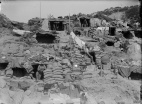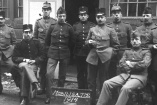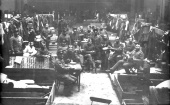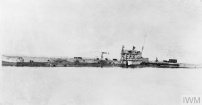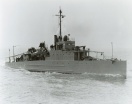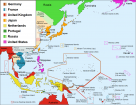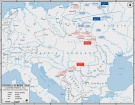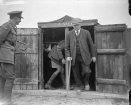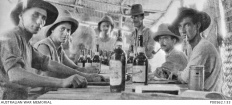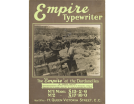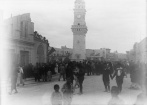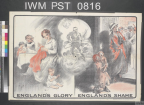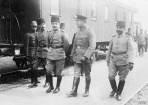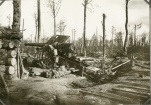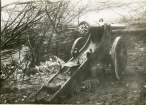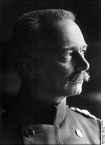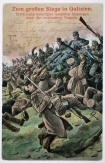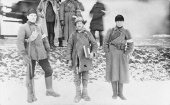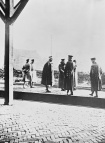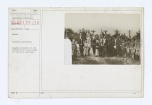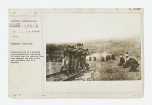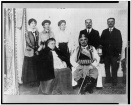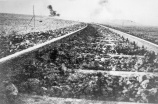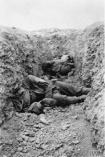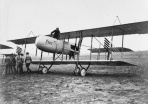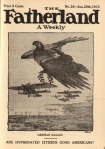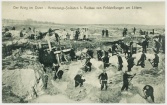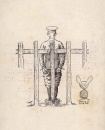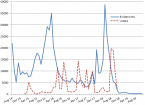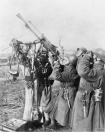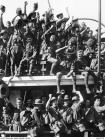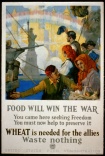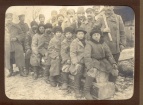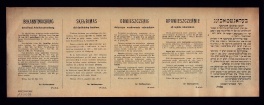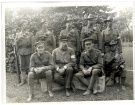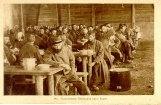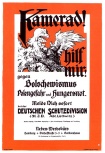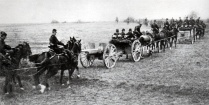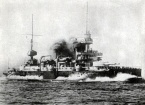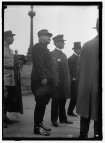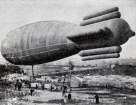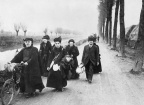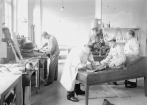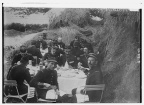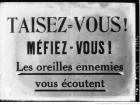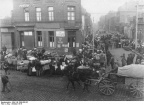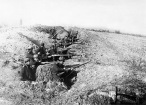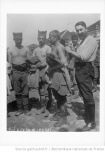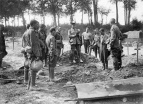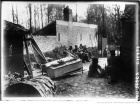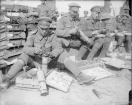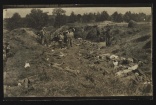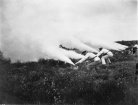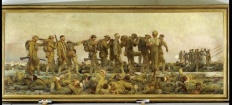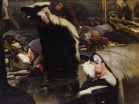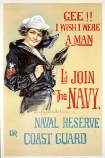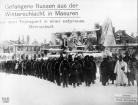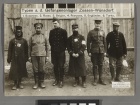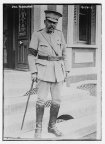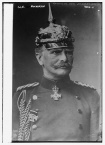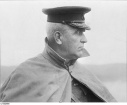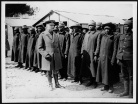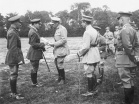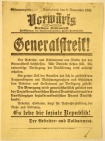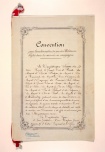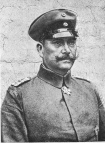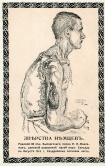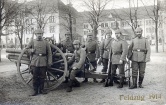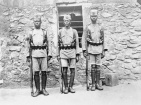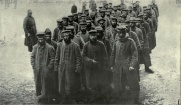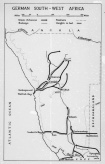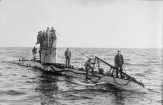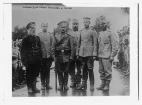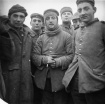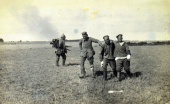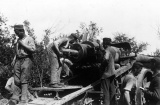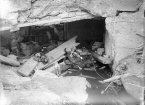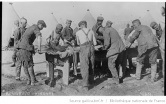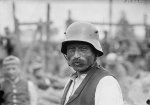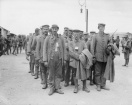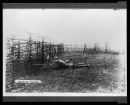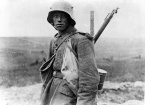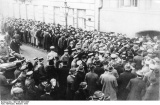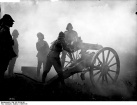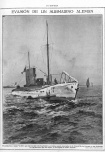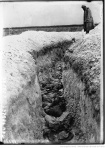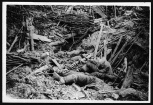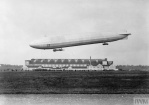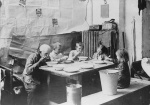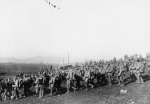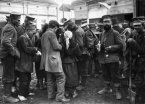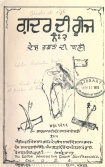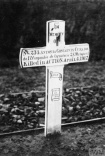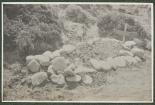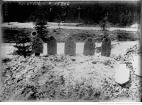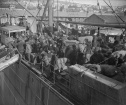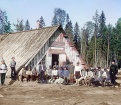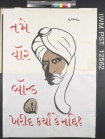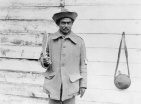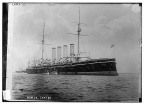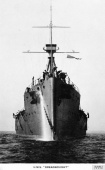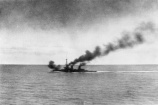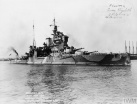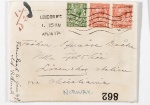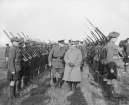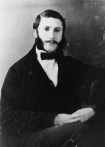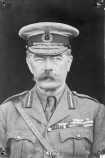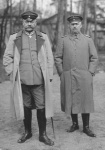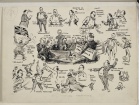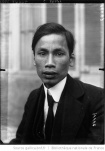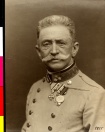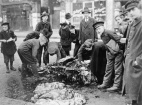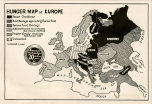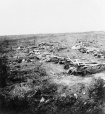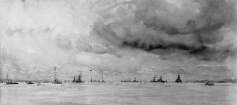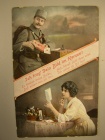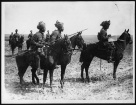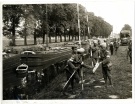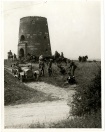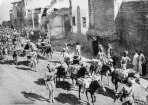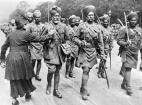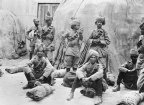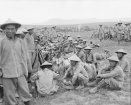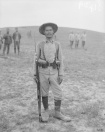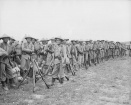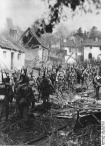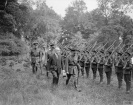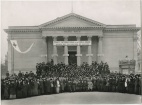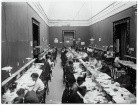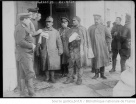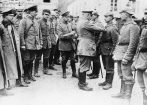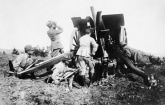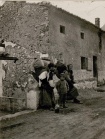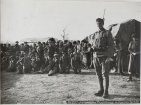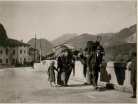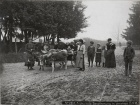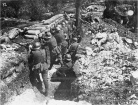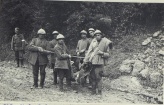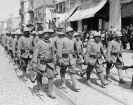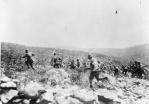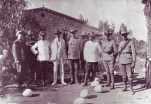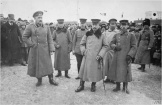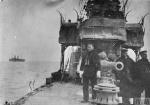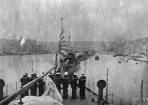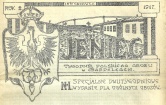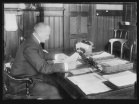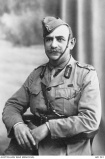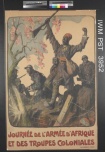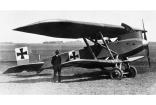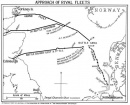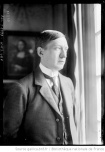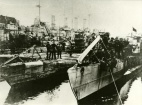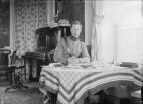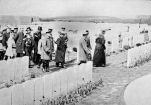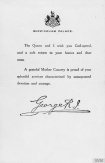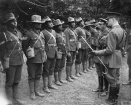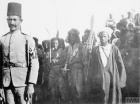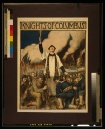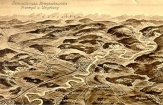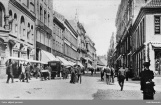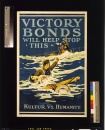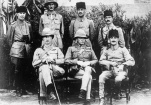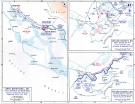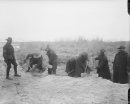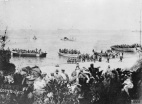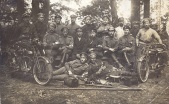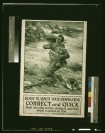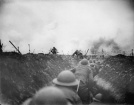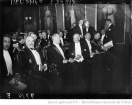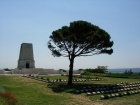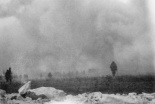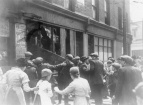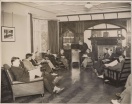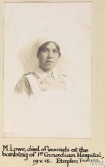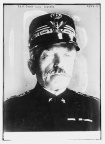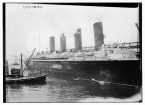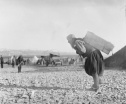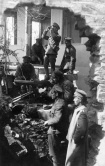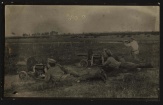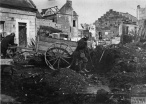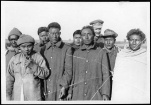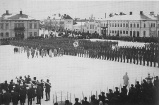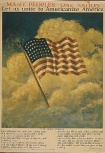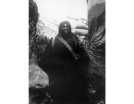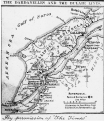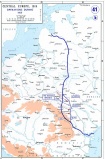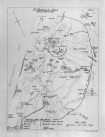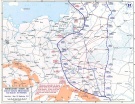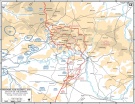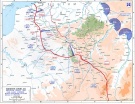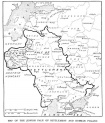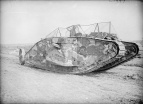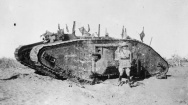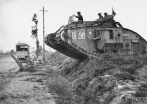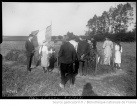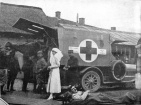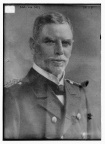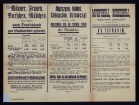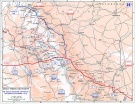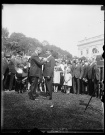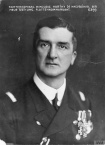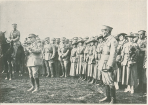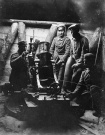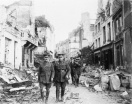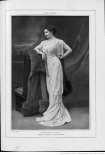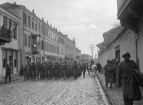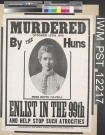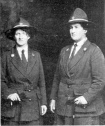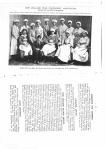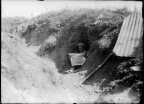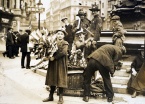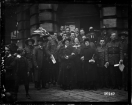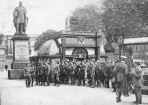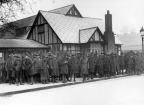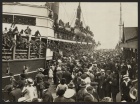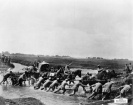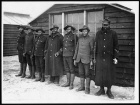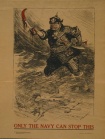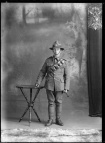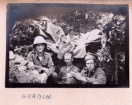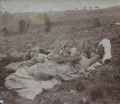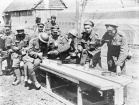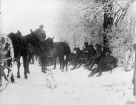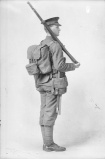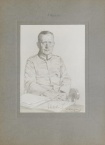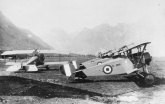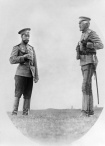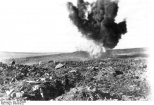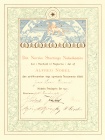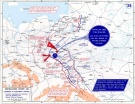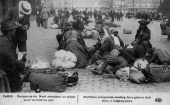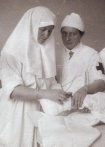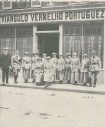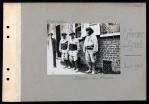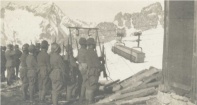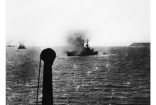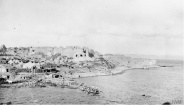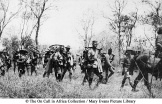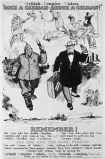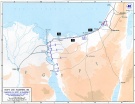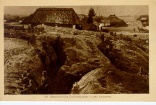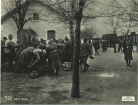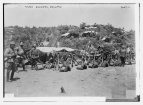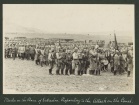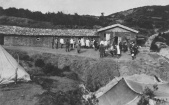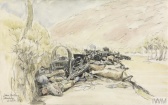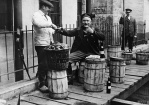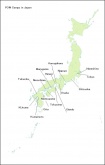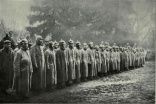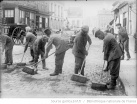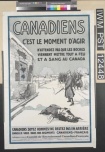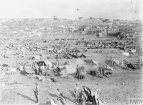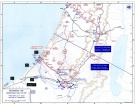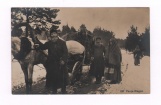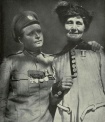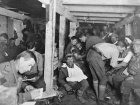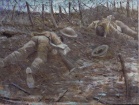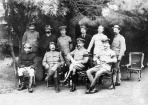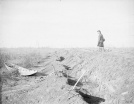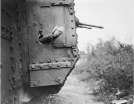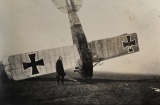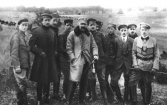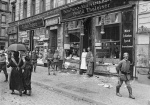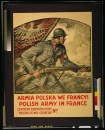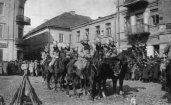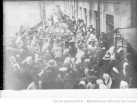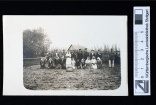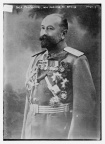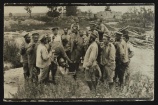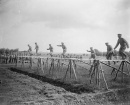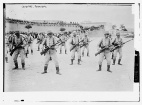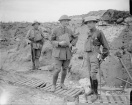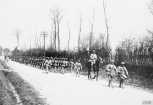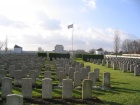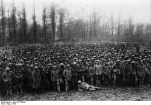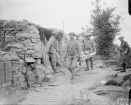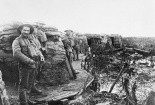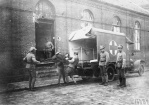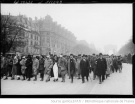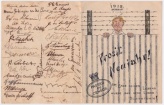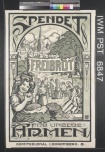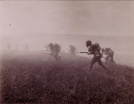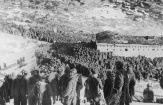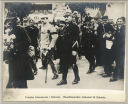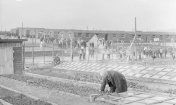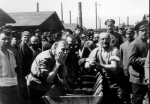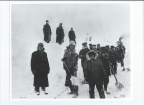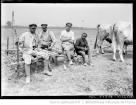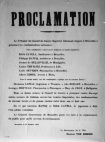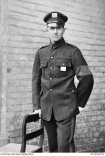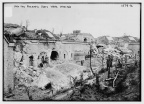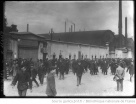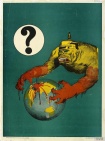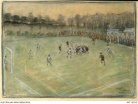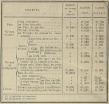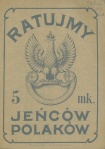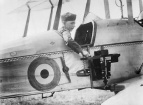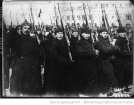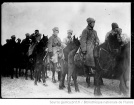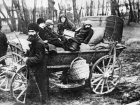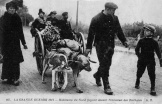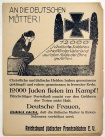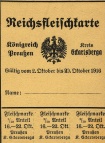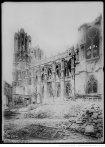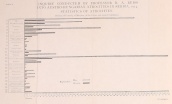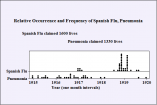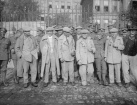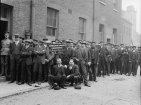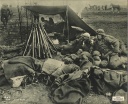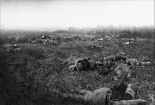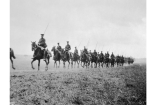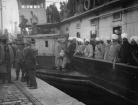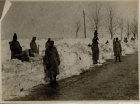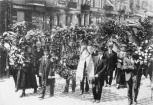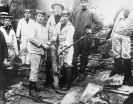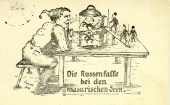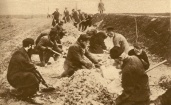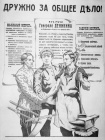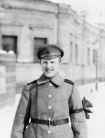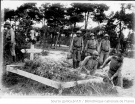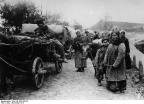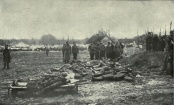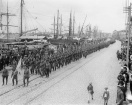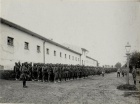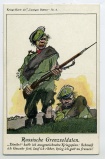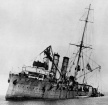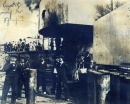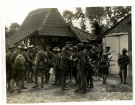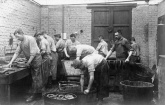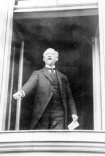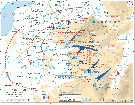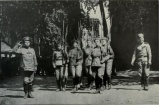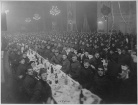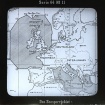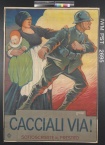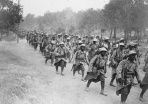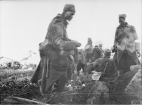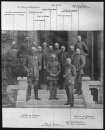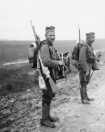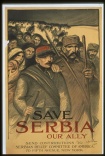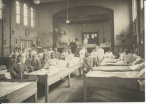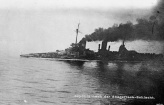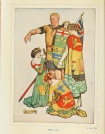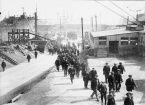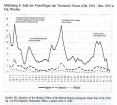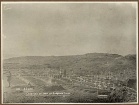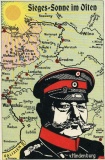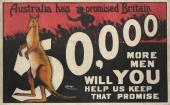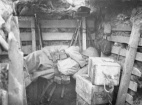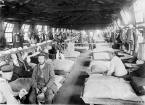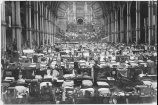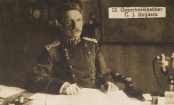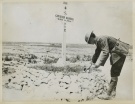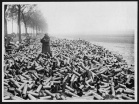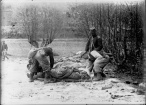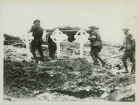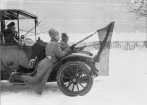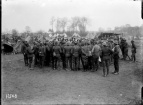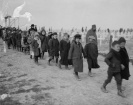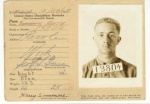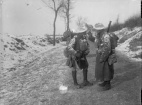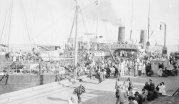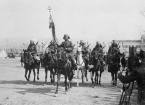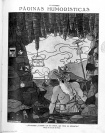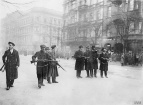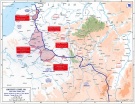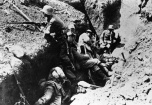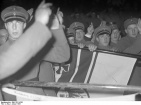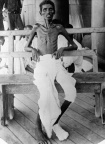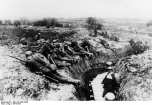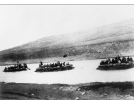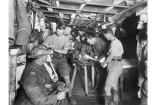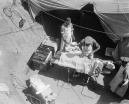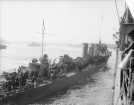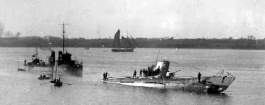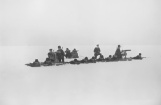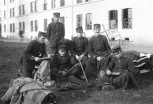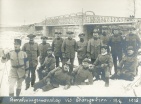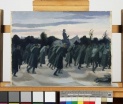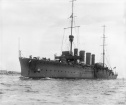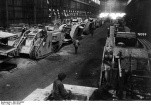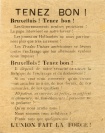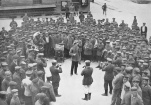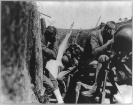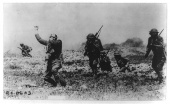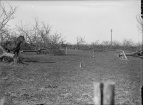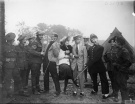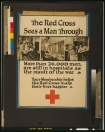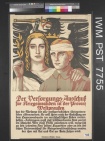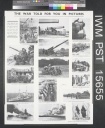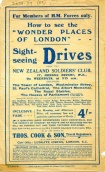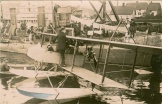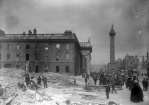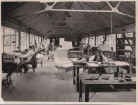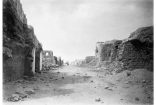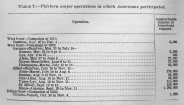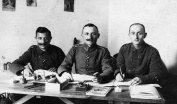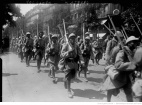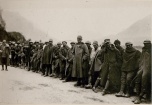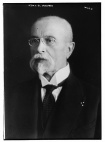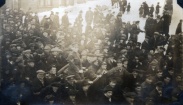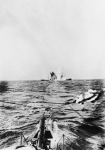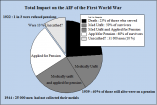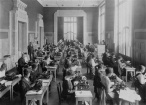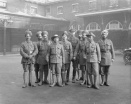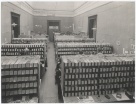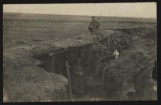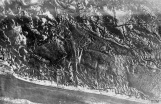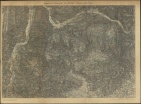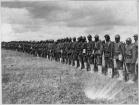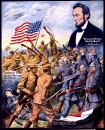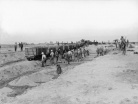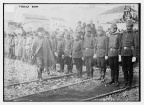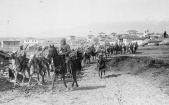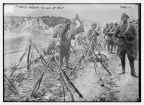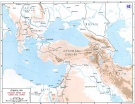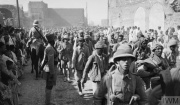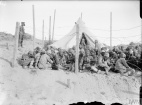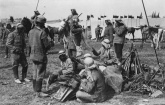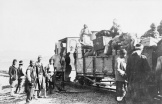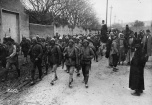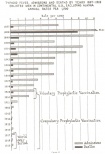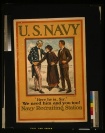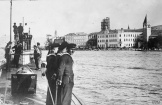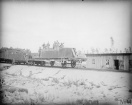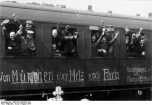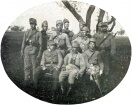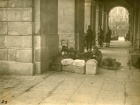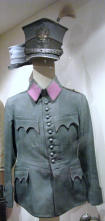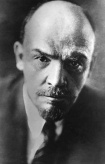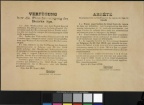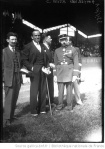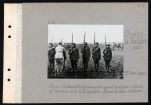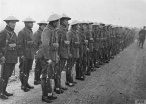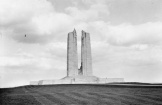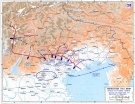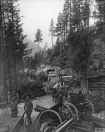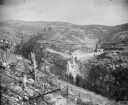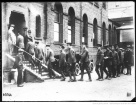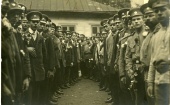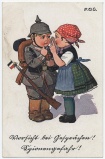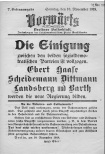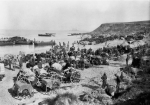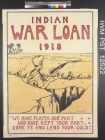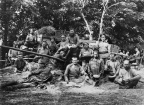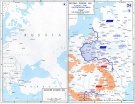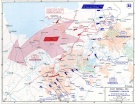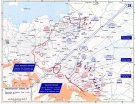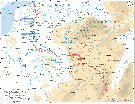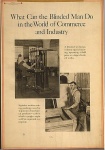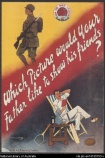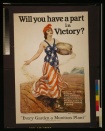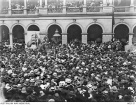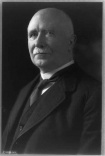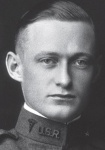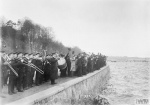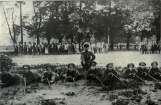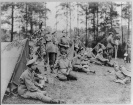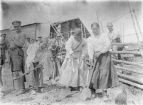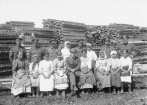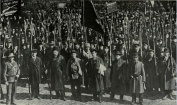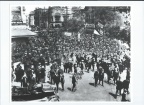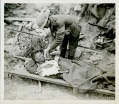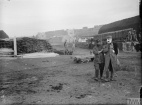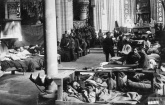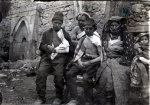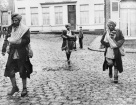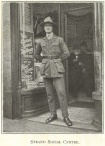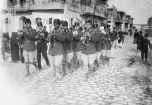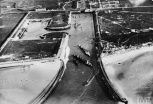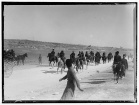Themes Violence
Survey Articles (Thematic)
- Air Warfare
- Animals
- Armenian Genocide
- Atrocities
- Between Acceptance and Refusal - Soldiers' Attitudes Towards War
- Centenary (Battlefield Tourism)
- Colonial Policy, Colonial Conflicts and War before 1914
- Destruction of the Ecosystem
- Drugs
- Eastern Front
- Espionage
- Extra-European Theatres of War
- Food and Nutrition
- Forced Labour
- Italian Front
- Life and Death of Soldiers
- Medicine and Medical Service
- Military Developments of World War I
- Military Justice
- Military Lessons of the First World War
- Military Socialization
- Mutilation and Disfiguration
- Naval Warfare
- Negotiating and Mediating Conduct of War
- Non-European Soldiers
- On the Road to Modern War
- Paramilitary Violence
- Prisoners of War
- Refugees
- Shifts and Tensions in Ethnic/National Groups
- The Military Collapse of the Central Powers
- Warfare 1914-1918
- War in the Balkans
- War Losses
- War Psychiatry and Shell Shock
- Weapons
- Western Front
Regional Thematic Articles
- African American Soldiers (USA)
- African Colonies (Portugal)
- Afrikaner (Boer) Rebellion (Union of South Africa)
- Air Warfare (Italy)
- Anzac (Australia)
- Between Acceptance and Refusal - Soldiers' Attitudes Towards War (Africa)
- Between Acceptance and Refusal - Soldiers' Attitudes Towards War (Australia)
- Between Acceptance and Refusal - Soldiers' Attitudes Towards War (Austria-Hungary)
- Between Acceptance and Refusal - Soldiers' Attitudes Towards War (Belgium)
- Between Acceptance and Refusal - Soldiers' Attitudes Towards War (Canada)
- Between Acceptance and Refusal - Soldiers' Attitudes Towards War (France)
- Between Acceptance and Refusal - Soldiers' Attitudes Towards War (Germany)
- Between Acceptance and Refusal - Soldiers' Attitudes Towards War (Great Britain and Ireland)
- Between Acceptance and Refusal - Soldiers' Attitudes Towards War (Indochina)
- Between Acceptance and Refusal - Soldiers' Attitudes Towards War (Italy)
- Between Acceptance and Refusal - Soldiers' Attitudes Towards War (New Zealand)
- Between Acceptance and Refusal - Soldiers' Attitudes Towards War (Ottoman Empire/ Middle East)
- Between Acceptance and Refusal - Soldiers' Attitudes Towards War (Portugal)
- Between Acceptance and Refusal - Soldiers' Attitudes Towards War (Russian Empire)
- Between Acceptance and Refusal - Soldiers' Attitudes Towards War (USA)
- Civil-Military Relations during World War I (Portugal)
- Civil-Military Relations during World War I (Russian Empire)
- Colonial Military Participation in Europe (Africa)
- Commemoration, Cult of the Fallen (Newfoundland)
- Conscription (Australia)
- Discipline and Military Justice (Italy)
- Dominions’ Military Relationship to Great Britain 1902-1914 (British Dominions)
- Dominion Soldiers on Leave in Europe (New Zealand)
- Ethnic Minorities at War (USA)
- French Canada and the War (Canada)
- Indigenous Experience of War (British Dominions)
- Indigenous Experiences of War (USA)
- Intelligence and Espionage (Denmark)
- Intelligence and Espionage (Norway)
- Intelligence and Espionage (Spain)
- Intelligence and Espionage (Sweden)
- Intelligence and Espionage (The Netherlands)
- International Committee of the Red Cross
- International Responses to the Russian Civil War (Russian Empire)
- Internees (Switzerland)
- Internment (Canada)
- Jewish Responses to the War (East Central Europe)
- Military and Strategy (Denmark)
- Military and Strategy (Norway)
- Military and Strategy (Sweden)
- Military and Strategy (Switzerland)
- Military and Strategy (The Netherlands)
- Military Planning and Wartime Recruitment (India)
- Minorities (Ottoman Empire/Middle East)
- Mutilation and Disfiguration (France)
- Naval Warfare (USA)
- Post-war Military Action and Violence (East Central Europe)
- Prisoners of War (Africa)
- Prisoners of War and Internees (Great Britain)
- Prisoners of War and Internees (South East Europe)
- Prisoners of War and Internees (Union of South Africa)
- Prisoners of War (Australia)
- Prisoners of War (Austria-Hungary)
- Prisoners of War (Belgium and France)
- Prisoners of War (East Central Europe)
- Prisoners of War (Germany)
- Prisoners of War (India)
- Prisoners of War (Italy)
- Prisoners of War (Japan)
- Prisoners of War (Ottoman Empire/Middle East)
- Prisoners of War (Portugal)
- Prisoners of War (Russian Empire)
- Propaganda War/Espionage (Switzerland)
- Recruitment and Conscription (Canada)
- Recruitment to the Army (Great Britain and Ireland)
- Refugees (Italy)
- Religion (Portugal)
- Religion (USA)
- South Africa and the German East Africa Campaign (Union of South Africa)
- South African Invasion of German South West Africa (Union of South Africa)
- South African Troops in Europe and the Middle East (Union of South Africa)
- Tactics, Army (Austria-Hungary)
- The Internment of Russophiles in Austria-Hungary
- Warfare 1914-1918 (Australia)
- Warfare 1914-1918 (Belgium)
- Warfare 1914-1918 (Canada)
- Warfare 1914-1918 (East Central Europe)
- Warfare 1914-1918 (France)
- Warfare 1914-1918 (Germany)
- Warfare 1914-1918 (Great Britain and Ireland)
- Warfare 1914-1918 (India)
- Warfare 1914-1918 (Italy)
- Warfare 1914-1918 (Japan)
- Warfare 1914-1918 (Newfoundland)
- Warfare 1914-1918 (New Zealand)
- Warfare 1914-1918 (Ottoman Empire/Middle East)
- Warfare 1914-1918 (Portugal)
- Warfare 1914-1918 (Russian Empire)
- Warfare 1914-1918 (South East Europe)
- Warfare 1917-1918 (USA)
- War Losses (Africa)
- War Losses and Reparations (China)
- War Losses (Australia)
- War Losses (Austria-Hungary)
- War Losses (Belgium)
- War Losses (Canada)
- War Losses (France)
- War Losses (Germany)
- War Losses (Great Britain and Ireland)
- War Losses (India)
- War Losses (Italy)
- War Losses (Middle East)
- War Losses (Ottoman Empire/Middle East)
- War Losses (Portugal)
- War Losses (Russian Empire)
- War Losses (USA)
- Women's Mobilization for War (Russian Empire)
Encyclopedic Entries
- Abteilung III b
- Ağa, Topal Osman
- Aircraft, Fighter and Pursuit
- Aircraft, Reconnaissance and Bomber
- Alekseyev, Mikhail Vasilʹevich
- Allenby, Edmund Henry Hynman Allenby, Viscount
- American Expeditionary Forces
- Amiens, Battle of
- Amphibious Raids on Ostend and Zeebrugge
- Amritsar, Massacre of
- Antisemitism and Pogroms in the Military (Russian Empire)
- Arab Officers in the Ottoman Army
- Arab Supporters of the Belligerent Countries
- Arditi
- Army of Islam
- Army of the Orient
- Artillery
- Askari
- Askerî Bey, Süleymân
- Atlantic U-boat Campaign
- Attrition Warfare
- Australian Naval and Military Expeditionary Force
- Azmi, Jemal
- Baku, Battle of
- Balkan Wars 1912-1913
- Baltenregiment
- Baltische Landeswehr
- Baracca, Francesco
- Barbed Wire
- Barkley, John Lewis
- Barthas, Louis
- Battisti, Cesare
- Bauer, Max
- Beatty, David Beatty, Earl
- Beersheba-Gaza Line
- Belarus
- Belgian Soldiers
- Bell, Gertrude
- Berlin, 9 November 1918
- Beseler, Hans von
- Bissing, Moritz Ferdinand Freiherr von
- Black and Tans and Auxiliaries
- Black Hand
- Border Occupation (Switzerland)
- Border Occupation (Switzerland)
- Bosniak Regiments (Austria-Hungary)
- Botha, Louis
- Brazil
- Brazilian Naval Division for War Operations (DNOG)
- British Expeditionary Force
- Bronsart von Schellendorf, Friedrich
- Brusilov, Alekseĭ Alekseevich
- Brussels
- Bullard, Robert Lee
- Çabuk, Seyit Ali
- Cadorna, Luigi
- Camouflage
- Capello, Luigi
- Caporetto, Battle of
- Carrier Corps
- Carrier Pigeons (Portugal)
- Cattaro, Mutiny of
- Caucasus Front
- Cavalry
- Cemal Paşa, Ahmed
- Cēsis, Battle of
- Champagne Offensives
- Charleroi, Battle of
- Chetniks
- Christmas Truce
- Close Combat Weapons
- Collins, Michael
- Communication Technology
- Compagnie Franche
- Comradeship (France)
- Conner, Fox
- Conrad von Hötzendorf, Franz Xaver Josef Graf
- Conscientious Objectors
- Coronel, Battle of
- Cru, Jean Norton
- Daniels, Josephus
- Deimling, Berthold von
- Delvert, Charles
- Denikin, Anton Ivanovich
- De Valera, Éamon
- Diaz, Armando, Duke of Victory
- Dicke Bertha
- Dickman, Joseph T.
- Donovan, William J.
- Dreadnought, HMS
- Drum, Hugh Aloysius
- Dunsterforce
- Egyptian Expeditionary Force
- Emden, SMS
- Enver Pasha, Ismail
- Eritrea
- Evrenoszade, Rahmi Bey
- Expanding Bullets
- Falkenhausen, Ludwig Alexander Friedrich August Philipp Freiherr von
- Falkenhayn, Erich von
- Falklands, Battle of the
- Fall of Baghdad
- Fayolle, Émile
- Faysal I, King of Iraq
- Fear
- Fisher, John Arbuthnot, Baron Fisher
- Flamethrower
- Foch, Ferdinand
- Force Publique
- Formation of the Royal Air Force
- Forts
- Foulois, Benjamin
- Franchet d'Espèrey, Louis Félix Marie François
- Freiburg
- Freikorps
- French, John Denton Pinkstone, Earl of Ypres
- Frontin, Pedro Max Fernando
- Gallieni, Joseph-Simon
- Gallipoli, Campaign and Battle of
- Garde Civique
- Garros, Roland
- Gas Warfare
- Gaulle, Charles de
- General Headquarters (Germany)
- General Headquarters (Great Britain)
- General Headquarters (Russian Empire)
- Georgia
- German Spring Offensives 1918
- Giardino, Gaetano Ettore
- Goeben, SMS and Breslau, SMS
- Goltz, Colmar Freiherr von der
- Goltz, Rüdiger Graf von der
- Göring, Hermann
- Gorizia, Battle of
- Gouraud, Henri
- Grand Fleet
- Greco-Turkish War 1919-1922
- Grigorovich, Ivan Konstantinovich
- Groener, Wilhelm
- Gurkha
- Gurko, Vasiliĭ Iosifovich
- Guynemer, Georges
- Haig, Douglas
- Haller, Józef
- Hand Grenade
- Harbord, James Guthrie
- High Seas Fleet
- High Voltage Fence (The Netherlands and Belgium)
- Hindenburg, Paul von
- Hitler, Adolf
- Hoff, Heinrich Leonhard Emanuel von
- Howell, Evelyn Berkeley, Sir
- Humann, Hans
- Hundred Days Offensive
- Husen, Bayume Mohamed
- Ideologies of Sport
- Indian Expeditionary Force
- Indian Labour Corps
- Infantry
- Intimate Relations between Occupiers and Occupied (Belgium and France)
- Invincible, HMS
- Iron Cross
- Isonzo, Battles of
- Italo-Turkish War 1911-1912
- Izmir/Smyrna
- Jabotinsky, Vladimir
- Jäger Movement
- Jellicoe, John Rushworth Jellicoe, Earl
- Jihad, Holy War (Ottoman Empire)
- Joffre, Joseph Jacques Césaire
- Jutland, Battle of
- Kemal, Mustafa (Atatürk)
- Keyes, Roger John Brownlow, Baron
- Kiel Mutiny
- Killigil, Nuri
- King's African Rifles
- Kitchener, Horatio Herbert Kitchener, Earl
- Kolchak, Aleksandr Vasil'evich
- Königsberg (ship)
- Kornilov, Lavr Georgievich
- Kostiuchnówka, Battle of
- Kreß von Kressenstein, Friedrich Freiherr
- Kuhl, Hermann Joseph von
- Kuşçubaşı, Eşref Sencer
- Kut al-Amara
- Kut, Halil
- Labour Battalions (Ottoman Empire/Middle East)
- La Courtine, Mutiny of
- Lafayette Escadrille
- Laidoner, Johan
- Langemarck Myth
- Lanrezac, Charles Louis Marie
- Latvian Riflemen
- Lawrence, Thomas Edward
- Légion étrangère
- Leipzig War Crimes Trials
- Lejeune, John Archer
- Le Poilu
- Lettow-Vorbeck, Paul von
- Liddell Hart, Basil Henry, Sir
- Liggett, Hunter
- Liman von Sanders, Otto Viktor Karl
- London, Bombing of
- Lovćen
- Luckner, Felix, Graf von
- Ludendorff, Erich
- Lusitania, Sinking of
- Lyautey, Louis Hubert Gonzalve
- Lys, Battle of the
- MacArthur, Douglas
- Machine Gun
- Mackensen, August von
- Makhno, Nestor Ivanovich
- Mangin, Charles
- Mannerheim, Carl Gustaf Emil
- March, Peyton Conway
- Markl Internment Camp
- Marne, Battles of the
- Marshall, George Catlett
- Martial Races, Theory of
- Medals and Decorations
- Medina, Siege of
- Mediterranean Theater, Naval Operations
- Mesopotamian Front
- Metaxas, Ioannis
- Mexican Revolution
- Military Board of Allied Supply
- Military Justice (Switzerland)
- Military Volunteers (Italy)
- Mine Warfare
- Mitchell, William
- Mobilization (Ottoman Empire/Middle East)
- Moltke, Helmuth Johannes Ludwig von
- Monash, John
- Mons
- Monte Grappa, Battle of
- Morgenthau, Henry, Sr.
- Mudros, Armistice of
- Murray, Archibald James, Sir
- Muslim Soldiers in the Russian Army
- Mussolini, Benito
- Naval Race between Germany and Great Britain, 1898-1912
- Naval Warfare (Italy)
- Navy Squadron in the Mediterranean (Japan)
- Nivelle, Robert Georges
- Nolan, Dennis E.
- No Man's Land
- Noske, Gustav
- Oberste Heeresleitung (OHL)
- Occupation of Luxembourg
- Offensive, Gorlice-Tarnow
- Operation Alberich
- Ozanian, Antranik
- Pacific Islands
- Palmer Raids
- Pals Battalions
- Paris, Bombing of
- Paris Guns
- Pasha, Cavit
- Pasha, Esat
- Patton, George Smith
- Pershing, John J.
- Persian Campaign
- Pétain, Philippe
- Petrov, Racho Stoi︠a︡nov
- Pézard, André
- Piave, Battles of
- Piłsudski, Józef
- Plan H
- Polish Army in France
- Polish Legions
- Polish National Units in Russia
- Polish Paramilitary Organisations before 1914
- Portuguese Expeditionary Corps
- Prager, Robert
- Prussian War Ministry
- Punjab Disturbances 1919
- Qingdao, Siege of/German-Japanese War
- Racism in the Armed Forces (USA)
- Rape
- Rear Area on the Western Front
- Reconnaissance and Observation
- Refugees (Austria-Hungary)
- Refugees (Russian Empire)
- Reshid, Mehmed
- Richert, Dominik
- Richthofen, Manfred, Freiherr von
- Rickenbacker, Eddie
- Rifles
- Robertson, William Robert
- Roçadas, José Augusto Alves
- Role of German Officers in the Gallipoli Campaign
- Room 40
- Rosado, Tomás Garcia
- Ruanda and Urundi
- Ruggera, Camillo
- Ruhleben Internment Camp
- Rupprecht, Crown Prince of Bavaria
- Russian Expeditionary Force
- Russian Expeditionary Force
- Russian Occupation of the Eastern Ottoman Empire
- Russo-Japanese War
- Said Nursi
- Sarajevo Incident
- Sarıkamış, Battle of
- Sarkotić von Lovćen, Stephan Freiherr
- Sarre, Friedrich Paul Theodor
- Schlieffen, Alfred, Graf von
- Schutztruppe (East Africa, Southwest Africa, Cameroon)
- Sea Power
- Seeckt, Hans von
- Sepoy
- Shakir, Bahaeddin
- Shell
- Siberian Intervention 1918-1922
- Sich Riflemen
- Sims, William Sowden
- Smuts, Jan Christian
- Soldiers' Equipment
- Soldiers on Leave
- Somalia
- Somme, Battles of
- Stalin, Joseph
- Steel Helmet
- Stellvertretendes Generalkommando
- Stereotypes
- Stormtrooper
- Submarines and Submarine Warfare
- Summerall, Charles Pelot
- Supreme War Council
- Tamagnini de Abreu e Silva, Fernando
- Tampere, Battle of
- Tanga, Battle of
- Tanks and Tank Warfare
- Tannenberg, Battle of
- Tannenberg Myth
- Taveta, Occupation of
- Temporary Committee for the Study of Military Matters (1915-1922)
- Terauchi, Masatake
- Tirailleurs Sénégalais
- Tirpitz, Alfred von
- Toller, Ernst
- "Total War Thinking" in Japan
- Townshend, Charles Vere Ferrers, Sir
- Trotsky, Leon
- Turkestan
- Udet, Ernst
- Uehara, Yūsaku
- Ukraine
- U.S. Race Riots
- Vācietis, Jukums
- Verdun, Battles of
- Viribus Unitis, SMS
- Vittorio Veneto, Battle of
- Wangenheim, Hans von
- War in the Alps (Italy)
- Weddigen, Otto Eduard
- Whittlesey, Charles White
- Wild von Hohenborn, Adolf
- Wilhelm, Crown Prince of Germany
- Wille, Ulrich
- Wrangel, Petr Nikolaevich, Baron
- Yildirim Army Group
- York, Alvin Cullum
- Young Men's Christian Association (YMCA)
- Ypres, Battles of
- Yuan, Shikai
- Yudenich, Nikolaĭ Nikolayevich
- Zeppelin (Airship)
See also
- Albania
- Australia
- Austria-Hungary
- Baltic States and Finland
- Belgium
- Bulgaria
- Burma
- Canada
- China
- Denmark
- East and Central Africa
- France
- Germany
- Great Britain
- Greece
- Greece
- Ireland
- Latin America
- Luxembourg
- Montenegro
- Naval Blockade (of Germany)
- Newfoundland
- New Zealand
- Northern Africa
- Norway
- Ottoman Empire/Middle East
- Persia/Iran
- Poland
- Portugal
- Romania
- Russian Empire
- Serbia
- Siam
- Southern Africa
- Spain
- The Netherlands
- Union of South Africa
- United States of America
- West Africa
- Yugoslavia
Survey Articles (Thematic)
-
Air Warfare
By Ross Mahoney and James Pugh
This article considers the use and evolution of air power during the First World War. By focusing on the principal air power roles – control of the air, tactical, strategic, and naval and maritime aviation – the article acknowledges the national, … READ MORE
Thematic -
During the First World War millions of animals were utilised for war work, and creatures great and small were a day-to-day part of most soldiers’ lives. Horses, dogs, and pigeons were used extensively in communication and transportation roles, whilst … READ MORE
Thematic -
In early 1915 the Young Turk government of the Ottoman Empire decided to deport hundreds of thousands of Armenians and Assyrians from their homes into distant parts of the Empire, eventually into the deserts of Syria. Armenian soldiers in the Ottoman Army … READ MORE
Thematic -
The term "atrocity" describes an act of violence condemned by contemporaries as a breach of morality or the laws of war. "Atrocities" are culturally constructed; by 1914, an international discourse on "civilized" war had defined "atrocities" as acts … READ MORE
Thematic -
Soldiers’ attitudes towards the Great War are a controversial issue, as they prove difficult to assess and raise complex methodological questions. They evolved during the course of the conflict, from a broad acceptance of a defensive war in the summer … READ MORE
Thematic -
The centenary of the First World War has been a catalyst for battlefield tourism. The creation of new museums, memorials, statues, commemorative trails and the like has strengthened the Great War’s profile in the cultural landscape of the countries that … READ MORE
Thematic -
While there were no major wars between European great powers in the decades preceding 1914, their militaries were constantly engaged, fighting in their expanding colonial empires in Africa, Asia, Oceania, and the Americas. This article explains why … READ MORE
Thematic -
This article examines the First World War’s ecological impact and shows that protracted environmental transformations resulted more from expanded industrial modes of production than heavy combat. These developments accelerated 19th-century … READ MORE
Thematic -
Throughout history, intoxicants were an important part of the war experience. The First World War was by no means an exception in that respect: its main “war drugs” were alcohol (mostly beer, brandy, rum, schnapps, wine, and vodka), morphine, and … READ MORE
Thematic -
Until recently, the eastern theater of the First World War was what Winston Churchill called “the Unknown War.” It was not overlooked, as other fronts were, but unknown; while people knew of some battles (Tannenberg), the assumption was that the … READ MORE
Thematic -
During the entire war, warring powers used the “secret war” to try to break the balance of the battlefield. Generally created in the previous few decades, intelligence and security services saw strong development during the war: the warring sides were … READ MORE
Thematic -
The extra-European theatres of World War I have received far less scholarly attention than the war in Europe. This state of affairs is hardly surprising given the sheer magnitude of the Western Front experience. Still, the violence of 1914-1918 also had … READ MORE
Thematic -
During the First World War, food became a major issue for military and civilian matters. This contribution aims to discuss the food situation in the belligerent countries in connection with global issues. It focuses on food supply both on the military and … READ MORE
Thematic -
This article examines the conditions, forms and consequences of forced labor and recruitment during the First World War, especially in German-occupied northern France, Belgium, Russian-Poland and Lithuania. It will offer an explanation of the extent to … READ MORE
Thematic -
In May 1915, Italy attacked Austria-Hungary along the Isonzo River and in the Trentino, hoping to conquer territory which it believed to be rightfully Italian. An immobile, entrenched war of attrition quickly developed with neither side able to break … READ MORE
Thematic -
While public memory of the First World War in Europe often focusses on the deaths caused by the conflict, soldiers who served not only died in the war; they also lived. That process of living included work, leisure, care for body and mind and contending … READ MORE
Thematic -
It is impossible to talk about “the” medical care or “the” medical service of World War I. Medical care varied greatly, depending on geography, strategy, and national, social, or economic differences, and so did the people providing it. … READ MORE
Thematic -
Despite World War I’s reputation as a senseless bloodbath whose military operations were devoid of any intelligent thought, the period 1914-1918 was history’s single largest revolution in military tactics and technologies. Virtually nothing about … READ MORE
Thematic -
This essay offers a comparative survey of the practice of military justice among several of the key belligerent powers. Accused soldiers enjoyed little in the way of legal protection, and punishment was generally swift and often harsh. Decisions about the … READ MORE
Thematic -
This article examines the lessons derived by the military organizations that participated in the First World War on land, at sea, and in the air. It demonstrates that while military and naval officers generally agreed that the human and economic costs of … READ MORE
Thematic -
The First World War created disfigured and mutilated bodies on a grand scale. Never before had the bodies of soldiers been so devastated by a conflict. Developments in established weapons such as cannons and machine guns, and terrifying innovations such … READ MORE
Thematic -
All of the great belligerent states of World War I were naval powers and engaged in operations around the globe. While the course of the war did not unfold as predicted by naval officials, it did produce a grave threat to the Allies through Germany’s … READ MORE
Thematic -
Many issues surrounding the conduct of war in the years 1914-1918 were impervious to international negotiation or mediation, due either to a complete lack of consensus or to an absence of trust and goodwill. However, there were some important exceptions, … READ MORE
Thematic -
This article examines the use by Great Britain and France of colonial subjects from their empires to fight during the First World War. Other Great War soldiers hailed from locations outside of Europe, but these men stood apart not only for their … READ MORE
Thematic -
The Great War was never considered the “war to end all wars” by the states and armed forces in conflict. The war’s legacies were processed in a wide variety of ways depending on forms of government, geostrategic situations, moral/material … READ MORE
Thematic -
While World War I featured the largest armies ever assembled, it was also fought by unprecedented numbers of paramilitary fighters. In a situation where the line between combatant and non-combatant was fluid, so was the line between paramilitary fighter … READ MORE
Thematic -
The First World War marked the shift from a 19th century, relatively ''ad hoc'' management of prisoners of war, to the 20th century’s sophisticated prisoner of war camp systems, with their bureaucratic management, rationalization … READ MORE
Thematic -
This article addresses the scale of wartime population displacement in continental Europe, the relief efforts made on behalf of refugees, their impact on host communities, and the cultural representation of refugees. It discusses the political issues … READ MORE
Thematic -
This article examines the changing dynamics of national tensions in the Habsburg, Romanov, and Ottoman empires during three distinct phases of the Great War. The outbreak and early months of the war witnessed a rise in imperial patriotism. Imperial … READ MORE
Thematic -
October 1918 witnessed the collapse of the German and Austro-Hungarian armies, both greatly affected by war-weariness and starvation. The Austro-Hungarian monarchy lost any remaining loyalty from its multi-national populace when President Woodrow Wilson … READ MORE
Thematic -
Static “trench warfare” belied a dynamic transformation in warfare between 1914 and 1918. Every army grappled with the same issues: how to end a strategic stalemate occasioned by their ability to draw on huge manpower reserves to refill their ranks; … READ MORE
Thematic -
The Balkan Wars erupted in South Eastern Europe in October 1912. Fighting continued intermittently in the region until July 1914. As the First World War expanded into much of Europe, fighting continued throughout the South East until the autumn of 1918. … READ MORE
Thematic -
Military sources provide the primary statistics of war losses and casualties during World War I. In order to review and eventually revise their figures, one must understand how military statistics were produced. This enquiry reveals the limits of … READ MORE
Thematic -
During the First World War soldiers from all combatant nations suffered from a wide range of debilitating nervous complaints as a result of the stresses and strains of modern warfare. War psychiatrists struggled to manage these complaints and … READ MORE
Thematic -
To understand the Great War, one has to understand weapons. Weapons are linked to bodies, to attacks on bodily integrity, to suffering. Hand weapons form an extension of the body while at the same time determining its range of movement. Handling weapons … READ MORE
Thematic -
The Western Front, a 400-plus mile stretch of land weaving through France and Belgium from the Swiss border to the North Sea, was the decisive front during the First World War. Whichever side won there – either the Central Powers or the Entente – … READ MORE
Thematic
Regional Thematic Articles
-
The beginning of the First World War signaled a rise in tensions within the United States over the meaning of democracy and the role of the democratic nation-state in the defense of both the human and civil rights of African Americans. The question of how … READ MORE
Regional Thematic -
The South African government’s decision to actively support Britain in the war against Germany led to much dissatisfaction within the white Afrikaans-speaking community. By the second week of October 1914, open rebellion erupted in certain areas. 11,476 … READ MORE
Regional Thematic -
Italy entered the war in 1915 with just a few dozen airplanes and more or less the same number of pilots, however, during the conflict, the accelerated development of the force made it necessary to build thousands of airplanes and to train thousands of … READ MORE
Regional Thematic -
This article briefly outlines the origins, development and significance of the Anzac legend for Australians since 1915. The initial reception of Anzac as symbolizing “the birth of a nation” is followed by an outline of the development of the concept … READ MORE
Regional Thematic -
All belligerent colonial powers enlisted Africans for fighting, and as carriers and war workers in African, European and Middle Eastern theatres of war. Despite the fact that universal compulsory military service did not apply to African subjects, a … READ MORE
Regional Thematic -
The attitudes and behaviours of men of the Australian Imperial Force (AIF) were the consequence of them serving as volunteers in the particular circumstances of a distant and costly war. But they also substantially came out of the background and culture … READ MORE
Regional Thematic -
Since the end of World War One it has generally been accepted that the collapse of the Habsburg Monarchy was primarily caused by friction among its ethnic groups. It has furthermore been alleged that this inter-ethnic conflict had a disastrous effect on … READ MORE
Regional Thematic -
This article discusses the war experiences of Belgian soldiers: how did they endure four years of war and how did the Army Command keep up morale and maintain discipline? Insights into the morale of soldiers during the war can be found in the military … READ MORE
Regional Thematic -
This essay organizes its discussion of soldiers’ reactions to war into three sections. The first accounts for patterns in the response to the call to arms and circumstances on the home front. The second considers the effects of trench warfare on … READ MORE
Regional Thematic -
German soldiers' attitudes toward the war neither were static nor did they develop in a linear fashion. They were as complex as they were contradictory, differing according to front, deployment and the status of the war. The conviction of leading a war of … READ MORE
Regional Thematic -
Between Acceptance and Refusal - Soldiers' Attitudes Towards War (Great Britain and Ireland)
By Jessica Meyer
This article examines British soldiers’ attitudes towards the First World War. It looks at what motivated men to enlist and the strategies employed by the military for enforcing discipline and maintaining morale in a force made up of citizen-soldiers. … READ MORE
Regional Thematic -
This paper provides a brief account of the experiences of the Vietnamese who went to Europe as soldiers during World War I. It shows that, contrary to a common belief among many historians that they were conscripted laborers, most were volunteers. Their … READ MORE
Regional Thematic -
During the First World War, Italian soldiers’ attitudes varied widely, from enthusiasm to outright rejection of military service thanks to diverse political opinions, socioeconomic backgrounds and conceptions of national identity. The majority were … READ MORE
Regional Thematic -
Their war experience changed the attitudes of New Zealand soldiers dramatically – from enthusiasm to a cynicism about war, from an identification with the British to a mateship with Australians, and from a hostility towards the enemy to an acceptance of … READ MORE
Regional Thematic -
Between Acceptance and Refusal - Soldiers' Attitudes Towards War (Ottoman Empire/ Middle East)
By Mehmet Beşikçi
This article addresses resistance to military mobilization in the Ottoman Empire during the Great War, with a specific focus on desertion. The article first explores how desertions from the army became a major military and social problem in the Ottoman … READ MORE
Regional Thematic -
Between Acceptance and Refusal - Soldiers' Attitudes Towards War (Portugal)
By Filipe Ribeiro de Meneses
Establishing the attitude of Portuguese soldiers towards the First World War and their role in it is a difficult task. Largely illiterate men left relatively little trace of their opinion in the shape of letters and diaries – while officers, politically … READ MORE
Regional Thematic -
Between Acceptance and Refusal - Soldiers' Attitudes Towards War (Russian Empire)
By Aleksandr Borisovich Astashov
The goal of this article is to uncover the causes, dynamics, and transformation of attitudes in the Russian army during the First World War. The contingents of the Russian army constantly changed during the course of military operations, and its … READ MORE
Regional Thematic -
This article examines coercion and consent within the First World War – why did men fight – were they manipulated and intimidated into war, or were they willing to engage in combat. American soldiers, similar to their European brethren, fought for a … READ MORE
Regional Thematic -
Portugal went to war in March 1916 with a government and an army that did not sit comfortably with each other. The young republican regime’s relationship with its armed forces was difficult despite its popularity among a small number of officers and a … READ MORE
Regional Thematic -
This article examines the mechanisms, results, and characteristics of the national mobilization in Russia in the conditions of the First World War. Moreover, it considers the forms of cooperation between the government and the public, the … READ MORE
Regional Thematic -
This article analyzes the deployment of about half a million African soldiers in Europe, where most of them fought in the French army. It first outlines the numbers and origins of African soldiers as well as the ways they were deployed in Europe. Then it … READ MORE
Regional Thematic -
In Newfoundland, the cult of the fallen followed the military disaster that befell the Newfoundland Regiment at Beaumont Hamel on 1 July 1916. Newfoundland and imperial officials portrayed the tragedy as a glorious sacrifice, beginning a wartime tradition … READ MORE
Regional Thematic -
Conscription was the most divisive issue in Australian politics during the First World War. The expeditionary force which the Australian government offered to Britain in August 1914 was composed only of volunteers, since earlier legislation forbade the … READ MORE
Regional Thematic -
The article illustrates the soldiers’ attitudes to the war, highlighting both the inadequacy of the work of involving the combatants in the reasons for the conflict and the decision to deal with the demonstrations of dissent, both individually and … READ MORE
Regional Thematic -
The dominions of Australia, Canada, Newfoundland, New Zealand, and South Africa shared an ambiguous constitutional relationship with Britain. The self-governing dominions were free to implement their own policies in matters of defence, but their limited … READ MORE
Regional Thematic -
This article considers the experiences of New Zealand soldiers on leave in Britain. In particular it focuses on the efforts of voluntary organizations like the YMCA to construct London as a ‘home away from home’ for the New Zealand soldier. Though … READ MORE
Regional Thematic -
The First World War was a watershed experience for the ethnic minorities who had come to the United States in record numbers at the turn of the last century. Though the overwhelming majority of immigrants supported their adoptive country both on the … READ MORE
Regional Thematic -
In 1917, with tens of thousands of Canadian soldiers killed and wounded, the end of the war was nowhere in sight. As the supply of volunteers dried up, conscription became the dominant issue in Canada. French Canadians were singled out and accused of not … READ MORE
Regional Thematic -
Policymakers in the British Dominions of Australia, Canada, Newfoundland, New Zealand and South Africa confronted the common questions about Indigenous service in the First World War but with diverse approaches: Under what circumstances (if at all) should … READ MORE
Regional Thematic -
In 1917, as America entered into the Great War, Indigenous responses to the war effort were diverse and complex. The Great War tested Native Americans’ ambiguous position both inside and outside the American nation. Assimilationists read the massive … READ MORE
Regional Thematic -
Denmark’s geographical position offered easy ingress to and egress from Germany, while direct telegraph cables to Russia, Great Britain, France, and Germany offered the quickest possible despatch of information. This small neutral country was therefore … READ MORE
Regional Thematic -
Before 1914, foreign intelligence activity in Norway was limited, reflecting its status as peaceful and non-aligned. This changed with the outbreak of the First World War, as Norway’s importance for the warring powers increased due to its natural … READ MORE
Regional Thematic -
This article deals with operations carried out by belligerent secret services in Spain, challenging the declaration of neutrality issued by Madrid in August 1914. Its primary aim is to internationalize the Spanish experience as a peripheral but … READ MORE
Regional Thematic -
Intelligence activities in Sweden during the war were largely influenced by the same set of factors as in other neutral countries. Due to relative accessibility and limited surveillance, Sweden was a useful base for intelligence activities by foreign … READ MORE
Regional Thematic -
From the first days of the war, the neutral Netherlands, because of its geographical position, was turned into a transit area for information and a variety of agents from the Entente and Germany. Their activities were mostly directed against each other, … READ MORE
Regional Thematic -
This article seeks to analyze how the International Committee of the Red Cross (ICRC), the oldest existing humanitarian organization, coped with the outbreak of the First World War and its aftermath. By using innovative methods of work and by deploying an … READ MORE
Regional Thematic -
The Russian Civil War of 1917-20 was closely related to the World War in terms of its cause, conduct, and results. This article discusses the two distinct phases of the Civil War, which were divided by the collapse of the Central Powers. It examines the … READ MORE
Regional Thematic -
Swiss governmental and non-governmental organizations were intensely involved in humanitarian activities for the victims of World War I. From 1916 on, the country opened its borders to a select number of sick or injured prisoners of war from Germany, … READ MORE
Regional Thematic -
How did Canada, as a self-governing country within the British Empire, deal with the internal security challenges of the First World War? Not surprisingly, this question has elicited many different scholarly responses, particularly in terms of Canada’s … READ MORE
Regional Thematic -
The Danish government let two elements guide its hesitant use of the armed forces. Firstly, it should be acceptable to Germany. Secondly, a response to violations should never lapse into destructive defensive warfare. These two elements were not … READ MORE
Regional Thematic -
The Russian navy was suspicious of Swedish neutrality in 1914, as Sweden had been arming itself for many years, and almost unwittingly dragged the country into the war. Russia was seen as the main threat to Sweden, but Germany and Britain were also … READ MORE
Regional Thematic -
Since the middle of the 19th century, armed neutrality had been the pillar of Dutch military strategy. From 1900, this was implemented not only by the purely defensive concept of “Fortress Holland” on the country's western borders, but also … READ MORE
Regional Thematic -
In 1914, the Indian army was a modest colonial force of 159,134 serving Indian troops (officers and men), alongside 2,333 British officers. The Indian army proved to be unprepared for a major war. The article will consider how India adapted to the … READ MORE
Regional Thematic -
The Ottoman Empire was the most religiously diverse empire in Europe and Asia. Macedonia, the southernmost Balkan regions and Asia Minor, which formed historically and in the minds of late Ottoman elites the territorial core of the empire, housed large … READ MORE
Regional Thematic -
This article explores the issue of suffering through two distinct categories of those mutilated during the Great War: amputees, who were the most numerous, and the disfigured, who were the most emblematic of the violence inflicted on the body. Amputees … READ MORE
Regional Thematic -
The United States Navy made its greatest contribution to the Allies by providing destroyers at a critical moment in the submarine war. Its material contribution in terms of mining, aviation and shipbuilding grew slowly and would have been even more … READ MORE
Regional Thematic -
The armistices of 1918 officially ended the First World War in Europe, but violence did not cease with the signing of the peace treaties. Fighting continued not only on the periphery, in Archangelsk or Siberia, but also at the very heart of the continent … READ MORE
Regional Thematic -
During the First World War Africans served as combatants, porters, and labourers in Africa and Europe where many became prisoners of war. POWs in Africa were generally swiftly incorporated into their captor’s forces as soldiers or non-combatants. Those … READ MORE
Regional Thematic -
During the First World War, hundreds of thousands of men found themselves interned in Britain. These were made up of: civilians already present in the country in August 1914; civilians brought to Britain from all over the world; and combatants, primarily … READ MORE
Regional Thematic -
This article analyzes the treatment and living conditions of prisoners of war (POWs) and civilian internees from Serbia, Montenegro and Romania in Austro-Hungarian, Bulgarian and German camps during the First World War. The article also addresses the … READ MORE
Regional Thematic -
A comparatively small number of German residents were interned as “enemy subjects” in the Union of South Africa. Most of them were accommodated at an abandoned military fort, Fort Napier, in Pietermaritzburg. Imprisonment caused disruptions and … READ MORE
Regional Thematic -
Prisoners of war are central to the public memory of Australian involvement in the Second World War, but very little historical scholarship has been dedicated to the national experience of captivity in the First World War. This is partly because only a … READ MORE
Regional Thematic -
The following article offers an overview of the central fields of research concerning Prisoners of war (POWs) in the Habsburg Empire during World War One, including living conditions in war camps, propaganda campaigns, forced labour, repatriation and the … READ MORE
Regional Thematic -
During the First World War, France was faced with creating a system of mass captivity for German prisoners of war and German civilian internees, both at home and in its overseas Empire. It largely succeeded in retaining civilian government control over … READ MORE
Regional Thematic -
During the war, hundreds of thousands of East Central Europeans mobilised to the imperial armies of Austro-Hungary, Russia, and Germany were taken prisoner. Beyond the ordinary problems of POWs such as malnutrition, hunger, infectious diseases, insects, … READ MORE
Regional Thematic -
Long overlooked, the prisoner of war experience of the estimated 2.4 million combatants held in German captivity during the Great War has recently been the subject of significant new research. Historians now emphasise the scale of captivity, the modern … READ MORE
Regional Thematic -
During the First World War South Asian combatants and non-combatants were taken prisoner in France, Belgium, Mesopotamia, East Africa and other theatres of war. The conditions under which POWs were captured differed enormously in terms of housing, food, … READ MORE
Regional Thematic -
In the first part of the article, the salient features of the experiences of the Italian prisoners of war are highlighted: the high number of soldiers captured and the high number of deaths among the prisoners. Then consideration is given to the suffering … READ MORE
Regional Thematic -
After Germany and its allies were defeated in Tsingtao, their soldiers were captured and sent to Japan. More than 4,600 combatant prisoners of war (POWs) were interned in temporary camps in cities throughout Japan. In 1915, after it became clear that the … READ MORE
Regional Thematic -
During the Great War, at least 217,746 Ottomans were taken captive by the Entente on one of the various fronts where Ottomans fought. About 150,000 of them were captured by the British. The Ottomans captured more than 34,000 Entente soldiers - mainly … READ MORE
Regional Thematic -
This article explores the particularities of the situation of prisoners of war (POWs) in Russia and the implications of the domestic political situation in Russia on the fate of POWs. The upheaval in Russia during the First World War resulted in … READ MORE
Regional Thematic -
Critical analysis of Canada’s recruitment for the war effort can be grouped around three main themes. The first is the government’s attempt to raise an expeditionary force that proved too large to be maintained by voluntary enlistment. As a result, … READ MORE
Regional Thematic -
During World War I, about 630,000 people found refuge in the interior of the Kingdom of Italy. They left their homes for different reasons. Some of them were Italian citizens repatriated from Austria-Hungary, Germany and France. Others were … READ MORE
Regional Thematic -
World War One represented a turning point in the relationship between churches and the Portuguese state. Both Catholics and Protestants perceived the conflict as an opportunity to expand their scope of influence in a society then dominated by a sector … READ MORE
Regional Thematic -
This article charts the contours of the Great War as an American religious experience, focusing on the ways in which the study of religion and the Great War in America forces an examination of what is meant by “religion.” American clergy and American … READ MORE
Regional Thematic -
South Africa’s contribution to the East Africa campaign extended beyond 1916, the year most South Africans served there under General Jan Smuts. South Africans of all racial groups served in different capacities from February 1915 to the departure of … READ MORE
Regional Thematic -
The South African invasion of German South West Africa (GSWA) in September 1914 was specifically aimed at securing several strategic British war objectives. The invasion was the first time that the Union Defence Force (UDF) was deployed operationally in … READ MORE
Regional Thematic -
Like other dominions of the British Empire, the Union of South Africa’s participation in war was varied. South African volunteers served in various geographical campaigns, ranging from the Western Front (1916-1918), Egypt (1916), and Palestine … READ MORE
Regional Thematic -
The development of Austria-Hungary’s combat doctrine started in 1914 at a typical peacetime level, ignoring more or less most of the modern experiences in Africa and Asia in the early 19th century. Even worse, the Imperial and Royal … READ MORE
Regional Thematic -
The internment of “suspicious persons” became a widespread practice and an important component of home front actions during WWI. This entry discusses the Austro-Hungarian internment of parts of the population in the northeastern Habsburg lands … READ MORE
Regional Thematic -
Although popular memory in Australia places a large emphasis on the Gallipoli campaign in the history of the First World War, the Australian military contribution was much more extensive than one nine-month campaign in 1915. Australian divisions fought … READ MORE
Regional Thematic -
Between August 1914 and November 1918 the Belgian army took part in the First World War against the German aggressor. This article describes the way the Belgian army fought this war that began disastrously for Belgium, with 95 percent of the territory … READ MORE
Regional Thematic -
Canada’s large-scale contribution to the Great War generated wartime pride and post-war nationalism. The scale of effort and its resulting costs also bred deep social cleavages that marked the country for generations to come. The army, at first … READ MORE
Regional Thematic -
Unlike the war on the Western Front, warfare in East Central Europe during the First World War was characterised by comparatively rapid movements, especially in 1915 and 1917/18. This manifested itself in a lower degree of trench warfare and the increased … READ MORE
Regional Thematic -
Germany entered the First World War as one of the era’s mightiest military powers. In 1914, Germany’s understanding of war was strongly influenced by four decades of peace and by its geostrategic situation. The army’s and navy’s expectations and … READ MORE
Regional Thematic -
The British Expeditionary Force (BEF) participated from the outset in the fighting in France and Belgium. But compared to Germany and France, Britain’s main strength at the start of the conflict was her navy rather than her army. While she was more than … READ MORE
Regional Thematic -
This article reconsiders the military role and performance of the British Empire’s Indian Army overseas in the First World War. It argues that the Indian soldiers were adaptive within a global network of Indian expeditionary forces that learned and … READ MORE
Regional Thematic -
The Italian Army faced the conflict in an inferior position compared to the opposing Austro-Hungarian forces which, in addition to skillfully exploiting the mountainous terrain for defensive purposes, had greater combat experience in trench warfare. The … READ MORE
Regional Thematic -
Japan’s participation in the Great War opened up a new chapter in the country’s military history. For the first time, Japanese military forces operated on a global scale, facing new challenges of transport, supply, and communication; for the first … READ MORE
Regional Thematic -
In 1914 Newfoundland raised and maintained a regiment that over the next four years was kept at battlefield strength through voluntary enlistment. The Regiment was integrated with the British army, serving mainly with the 29th British Division. … READ MORE
Regional Thematic -
Between August 1914 and November 1918 approximately 102,000 New Zealand soldiers fought alongside Australian troops as part of the British army’s campaigns at Gallipoli in 1915, on the Western Front from 1916 to 1918, and in Sinai-Palestine from 1916 to … READ MORE
Regional Thematic -
When the Ottoman Empire entered the war, the potential Middle Eastern theater of operations was regarded as a mere sideshow. Widely viewed as an inferior fighting force, the Ottoman Army was simply tasked with drawing on itself as many enemy forces as … READ MORE
Regional Thematic -
Though safely removed from the main European conflict zones, Portugal was nevertheless an active belligerent during the First World War. Its forces engaged the enemy on land, at sea, and in the air. The Portuguese armed forces underwent intensive training … READ MORE
Regional Thematic -
In late summer 1914 the Russian, German and Austrian armies engaged in intense battles from East Prussia to Galicia. After a prolonged siege through the winter of 1914-15 at the Austrian fortress of Przemysl, one where the Russians prevailed, the Germans … READ MORE
Regional Thematic -
The main intention of this article is to chronologically present major events on the battlegrounds of South East Europe in the Great War and to demonstrate how it actually represented a continuation of previous conflicts, or a "war within a war". Warfare … READ MORE
Regional Thematic -
In 1917 and 1918, the United States raised the largest combat force in its history to date and deployed it to Europe. By November 1918, the American Expeditionary Forces (AEF) contained two million soldiers, organized into twenty-nine massive combat … READ MORE
Regional Thematic -
Human resources in Africa were exploited during the First World War for imperial ends. Men were sent to Europe to augment the manpower of the combatants, and soldiers and labourers were mobilized to aid in the conquest or defense of Germany’s colonies. … READ MORE
Regional Thematic -
China’s war losses during World War I were primarily composed of 1) public and private losses amounting to approximately 21.5 million yuan, caused by the Japanese army during its passage across Shandong in the assault on Qingdao (Japan refused to pay … READ MORE
Regional Thematic -
The official numbers of casualties suffered by the Australian Imperial Force (AIF) in the First World War are underestimated in multiple categories. These official figures comprise the limited statistics of 60,000 dead and 155,000 woundings, impacting … READ MORE
Regional Thematic -
Estimates of the total losses of the Austro-Hungarian armed forces range from 1.1 to 1.2 million in addition to 450,000 deceased prisoners of war and 300,000 soldiers who stayed missed after war. The number of direct and indirect civilian losses is … READ MORE
Regional Thematic -
The Belgian situation was unique in the sense that military losses were relatively limited compared to neighbouring countries due to the wait-and-see strategy pursued by King Albert I and a less successful mobilisation of the army in the first weeks of … READ MORE
Regional Thematic -
The Canadian casualty figures are difficult to determine in part because of incomplete sources and the normal vagaries of record-keeping in times of war. As best as can be determined now, Canada’s total wartime military dead for those who served in a … READ MORE
Regional Thematic -
When the fighting came to an end in late 1918, military losses for France were in keeping with a prolonged industrial conflict involving the loss of a huge number of combatants on extremely deadly battlefields. In this context, the way the state handled … READ MORE
Regional Thematic -
2,037,000 German soldiers were killed in World War I. These losses were a military and demographic catastrophe which had enormously important political, social, economic, and cultural … READ MORE
Regional Thematic -
Some 1.5 million Indians served in the Indian Army during World War I and, of those, slightly more than one million deployed to battlefronts spanning Europe, Africa, and the Middle East. At the war’s end, India had suffered more than 120,000 total … READ MORE
Regional Thematic -
The article examines the Italian losses in the Great War 1914-1918. Regarding the military, indications are given about the losses in relation to the population and the number of men mobilized, the distribution per year, the causes, the different war … READ MORE
Regional Thematic -
The Ottoman Empire’s entry into the First World War turned out to be disastrous for the Empire and its people as a whole. The Empire was underdeveloped, with a primitive economy and a sparse population. It lacked the most vital communication and supply … READ MORE
Regional Thematic -
Many figures have been presented over the years to quantify the human losses that Portugal suffered during the Great War. Data available online beginning in April 2014 in the virtual ''Memorial to the Fallen in the Great War'', collected in several … READ MORE
Regional Thematic -
With about 5.5 million out of 16 million soldiers killed and wounded, the Russian Empire appears to have suffered less than France and Germany. But that does not take into account some other facts: 500,000 soldiers missing, 3 million prisoners of war, 1.1 … READ MORE
Regional Thematic -
American losses in World War I were modest compared to those of other belligerents, with 116,516 deaths and approximately 320,000 sick and wounded of the 4.7 million men who served. The USA lost more personnel to disease (63,114) than to combat (53,402), … READ MORE
Regional Thematic -
As a total war, the First World War precipitated the involvement of thousands of Russian women, often in capacities that transcended previous war experiences, created new opportunities and challenges, and blurred boundaries of gendered behavior and … READ MORE
Regional Thematic
Encyclopedic Entries
-
Founded in 1889, ''Sektion IIIb'' (1915-1918: ''Abteilung IIIb'') was the military intelligence component of the Prussian-German general staff. During the First World War, ''IIIb'' developed into a hybrid security organization that had to handle a mixed … READ MORE
Entry -
The general trend in aircraft development during World War I was towards better-engined, stronger, higher flying, more heavily armed, and more capable airplanes. Strictly speaking, pure maneuverability became less important than greater overall utility … READ MORE
Entry -
Much like fighter aircraft, World War I reconnaissance and bomber technology advanced rapidly throughout the war. As aircraft designs that combined lift, range, and stability were key to both successful reconnaissance and bombing, many World War I … READ MORE
Entry -
Mikhail Alekseyev was a Russian general who was the chief of staff of the general headquarters (''Stavka'') of the Russian army from August 1915 until May 1917. Yet, the military contribution of this capable strategist remains largely under-researched, … READ MORE
Entry -
Field Marshal Edmund Allenby was a British army officer who commanded a variety of formations on the Western Front, including the Third Army (October 1915 - June 1917) and the Egyptian Expeditionary Force in Palestine from June 1917 until the end of the … READ MORE
Entry -
Beginning in April 1917, the United States (US) army rapidly transformed from a diminutive constabulary force to a 4 million man draftee army, from which was formed the 2 million strong American Expeditionary Forces (AEF) that decisively tipped the … READ MORE
Entry -
The Battle of Amiens, 8-12 August 1918, was a decisive British-led victory that marked the start of the Allied counteroffensive of the Hundred Days campaign, leading to the defeat of the German army on the Western … READ MORE
Entry -
On the night of 22-23 April 1918, the Royal Navy attacked the German occupied towns of Ostend and Zeebrugge in an effort to block the canals that linked the two cities to the German naval base at … READ MORE
Entry -
This entry explains the Amritsar Massacre of 13 April 1919. It charts the events of the Massacre itself and the colonialist and nationalist imaginings of the Massacre that … READ MORE
Entry -
During World War I, the Russian military command was overtly anti-Semitic. Russian commanders pointed to the alleged disloyalty of Russia’s Jewish population. The Russian army expelled Jews from areas near the front lines, restricted their movements, … READ MORE
Entry -
Perhaps 30 percent of the World War I Ottoman officer corps hailed from Arab regions. Such people had often been the recipients of fully subsidized, comprehensive state education. Ex-officers figured prominently in all states that emerged from the Ottoman … READ MORE
Entry -
There were a number of Arab intellectuals who actively cooperated with the Entente and Central Powers during the Great War through their actions, writings and speeches. The entry focuses on the actions of Shakib Arslan, Muhammed Kurd Ali and the al-Khatib … READ MORE
Entry -
''Arditi'' were elite assault troops in the Italian army. They also emerged on Italy’s post-war political scene thanks to newly formed associations. Even though many of them had ties to fascism, ''Arditi''’s active involvement in politics … READ MORE
Entry -
The Army of Islam, which was created by the order of Enver Pasha dated 5 April 1918, was a military force that performed operations in the summer of 1918 which resulted in the expansion of Ottoman military and political power in the Caucasus. Commanded by … READ MORE
Entry -
The French Army of the Orient is a military unit, which was created after the disaster of the Dardanelles Campaign (1915). Established at Thessaloniki with allied forces to fight against pro-German Bulgaria, this unit crushed the Bulgarian Army in … READ MORE
Entry -
Artillery consisted of the military’s heavy firearms. As a branch of the armed forces, its purpose was to fire explosive-filled projectiles across relatively large distances. In contrast to the infantry and the cavalry, the artillery could not enter … READ MORE
Entry -
''Askari'' is a word that means “soldier” or “police” in Kiswahili, Arabic, Turkish and a number of other languages. Colonial powers in many parts of eastern, central and southern Africa used the term widely to refer to the African soldiers who … READ MORE
Entry -
After service in the Balkans and in Libya, Süleyman Askerî was chosen by Enver Pasha to lead the “Special Organization” before World War I. Sent to Iraq to organize the defense against the British Mesopotamian campaign, he was seriously wounded and … READ MORE
Entry -
Between February 1915 and the Armistice, Germany conducted three submarine campaigns against British, Entente and neutral merchant shipping. The final unrestricted campaign that started in early 1917 came close to choking the British economy, but the … READ MORE
Entry -
Attrition warfare is the term used to describe the sustained process of wearing down an opponent so as to force their physical collapse through continuous losses in personnel, equipment and supplies or to wear them down to such an extent that their will … READ MORE
Entry -
On the outbreak of the First World War, the German presence in the Pacific, in particular its wireless transmitting stations, were seen as a strategic threat to both Britain and Australia. The Australian Naval and Military Expeditionary Force, during its … READ MORE
Entry -
Cemal Azmi was an Ottoman official who served during the Great War as governor (''vali'') of the province (''vilayet'') of Trebizond. Being the mastermind of the Armenian genocide in this province he earned the surname of the butcher of Trebizond. His … READ MORE
Entry -
The Battle of Baku was the conclusive battle that ended the war between the anti-Ottoman/anti-Musavatist forces in Baku and the Ottoman-Azerbaijani forces. The Army of Islam under the command of Nuri Pasha defeated the armed forces of the Baku Soviet in … READ MORE
Entry -
The Balkan Wars were two sharp conflicts that heralded the onset of World War I. In the First Balkan War a loose alliance of Balkan States eliminated the Ottoman Empire from most of Europe. In the Second Balkan War, the erstwhile allies fought among … READ MORE
Entry -
During the Estonian War of Independence, the Baltic Germans - despite their relatively small numbers - established their own military forces, the ''Baltenregiment'', in order to support the struggle. The regiment continued to exist until the general … READ MORE
Entry -
When Latvia felt endangered by the Bolsheviks they called for German help, since Germany had assisted in clearing the country from the Bolsheviks before. However, very soon tensions between the Latvians and their helpers became apparent and the Allies … READ MORE
Entry -
Francesco Baracca was the most famous Italian aviator, and shot down thirty-four enemy airplanes. He began his career in 1910 as a cavalry officer and became an air-fighter in 1912. He fought in the skies of all the Austro-Italian fronts, and died during … READ MORE
Entry -
Invented in France in 1860, barbed wire was further developed in the United States, where it was used to restrict cattle and secure territory. Acquiring far more menacing qualities in the First World War, where it became an essential feature of trench … READ MORE
Entry -
John Lewis Barkley grew up in west-central Missouri, where he became a skilled outdoorsman. During the First World War, he served in an intelligence platoon in the 3rd Division of the American Expeditionary Forces (AEF). For valor during the … READ MORE
Entry -
A barrelmaker in a French village and corporal at war in an infantry regiment, Louis Barthas was considered the spokesman of his squad. He wrote a reliable testimony about his experience fighting in the trenches. His book was the first of many published … READ MORE
Entry -
Cesare Battisti was the leader of the socialist party of the Italian Tirol (Trentino) and, from 1911, a member of the Austrian parliament. At the outbreak of war he went to Italy to engage in pro-intervention propaganda. In 1915 he joined the Italian … READ MORE
Entry -
Max Bauer was a German artillery expert and a key suborndinate in the German Supreme Command. A loyal suporter of Ludendorff, Bauer intrigued against Falkenhayn and consistently pushed for the further militarisation of German everyday life. He played a … READ MORE
Entry -
David Beatty was a British admiral. He is best known for leading Britain’s Battlecruiser Fleet in its disastrous rendezvous with Germany’s High Seas Fleet at the Battle of Jutland. An audacious officer whose actions at Jutland remain controversial, … READ MORE
Entry -
The Beersheba-Gaza Line (or Defenses) are the three battles fought between the Ottoman Empire and British forces in the Gaza region of Palestine from March to November 1917 that ended Ottoman rule in Palestine and initiated the British Mandate of … READ MORE
Entry -
The Great War was a severe trial for Belarus and its population. It ruined the local economy and caused a massive exodus of refugees. An attempt to establish Belarusian statehood was made during the chaos caused by the collapse of the Russian Empire, … READ MORE
Entry -
This article briefly describes the 320,000 Belgian soldiers of the Great War. Who were they and what was special about the way they experienced the war compared to other … READ MORE
Entry -
Gertrude Bell’s earlier travels and intellectual interests, alongside her wartime intelligence-gathering activities, prefigured the role she would play in administering the new Iraqi state. In recent years, scholars have drawn more attention to her … READ MORE
Entry -
This article discusses the 9th of November 1918 in Berlin and its commemoration. The events of the day brought the Kaiser’s abdication and the proclamation of a Republic in … READ MORE
Entry -
Hans Hartwig von Beseler was a German general and military engineer who oversaw the conquest of several fortresses early in the war. He was then named commander of German-occupied Poland, a post he held until the end of the … READ MORE
Entry -
Moritz von Bissing was born on 30 January 1844, in Bellmannsdorf, Silesia, then part of the German Empire. He served as governor general of the Prussian Army from December 1914 until his death on 18 April 1917 in Trois Fontaines, a village in … READ MORE
Entry -
The "Black and Tans" were British ex-soldiers recruited to reinforce the United Kingdom’s police force in Ireland. The "Auxiliaries" were a temporary force of paramilitary police, composed of British ex-officers. Both the Black and Tans and Auxiliaries … READ MORE
Entry -
This article looks at the Black Hand from its origins to the demise of its leader, Dragutin Dimitrijević "Apis", in the Salonika Trial of 1917, focussing on the role the association played in Serbia’s foreign and domestic affairs before and during the … READ MORE
Entry -
Shortly after the outbreak of the First World War, the Swiss army moved into a staggered defensive position in the northwest of the country, facing the Franco-German front. The southern border was only secured by weak units with a slight strengthening of … READ MORE
Entry -
Shortly after the outbreak of the First World War, the Swiss army moved into a staggered defensive position in the northwest of the country, facing the Franco-German front. The southern border was only secured by weak units with a slight strengthening of … READ MORE
Entry -
Following the decisions of the Congress of Berlin in 1878, Austria-Hungary occupied the provinces of Bosnia and Herzegovina. From 1882 onwards, members of all ethnicities in Bosnia-Herzegovina were equally conscripted to military service. … READ MORE
Entry -
Louis Botha, Boer General and Prime Minister of the Union of South Africa, served throughout the war. Following the 1914 Afrikaner rebellion, he commanded the troops in German South West Africa, won the 1915 general election and organized contingents for … READ MORE
Entry -
Brazil was the only South American country that participated actively in the First World War. Before the war, the country was economically dependent on European and North American markets and modelled itself on Western culture and science. After the war, … READ MORE
Entry -
Created some months after Brazil's declaration of war against Germany, the Naval Division for War Operations (''Divisão Naval em Operações de Guerra'' – DNOG), active between May and November of 1918, consisted of a mission whose objective was to … READ MORE
Entry -
Between 1914 and 1918 the British Expeditionary Force grew from a small professional striking force into a mass army, which was not only bigger than any in Britain’s history, but was also capable of fighting and winning a modern, industrialised war on a … READ MORE
Entry -
Friedrich Bronsart von Schellendorf was a Prussian-German lieutenant general. As Chief of Staff of the Ottoman Army, he was one of the closest collaborators of Enver Pasha during the First World War. In this role, he was also involved in the Ottoman … READ MORE
Entry -
Aleksei Alekseevich Brusilov was a Russian general in the First World War, successively holding the posts of commander of the 8th Army, commander the south-western front and supreme commander in chief. After the Bolshevik’s ascent to power, … READ MORE
Entry -
The Belgian capital was spared the anguish of combat, but the city suffered four long years of occupation. In fact, it became the most important occupied city during the First World War. For the population, these were times of scarcity, repression, and … READ MORE
Entry -
Robert Lee Bullard, born in Alabama and educated at West Point, served in the U.S. Army from 1885–1925. He was in the Geronimo Campaign, the Philippines, Cuba, and on the Mexican border, and he commanded First Division, III Corps and Second Army, AEF, … READ MORE
Entry -
Seyit Onbaşı (Corporal Seyit) is an iconic figure and symbol of the Turkish naval victory at the Dardanelles on 18 March 1915. He allegedly carried a 275 kg heavy shell to the … READ MORE
Entry -
Luigi Cadorna was a career military man, the son of a major general in the army of Piedmont. He quickly climbed the military hierarchy to become chief of staff of the Italian army from July 1914 until November 1917. Cadorna was known for imposing severe … READ MORE
Entry -
A technique of concealment and protection, a means to deceive but not kill, camouflage was significantly developed during the First World War. The technique enabled many artists to put their talents at the service of their … READ MORE
Entry -
Luigi Capello was an Italian general who took part in the war on the Gorizia front. As commander-in-chief of the Second Army, many held him to be chiefly to blame for the defeat of Caporetto. Having aligned himself at the outset with fascism, he later … READ MORE
Entry -
The Battle of Caporetto, also known as the Twelfth Battle of the Isonzo, remains the worst defeat suffered by the Italian army to date. It began at two o’clock in the morning on 24 October 1917 on the Isonzo front and was fought between the Italian army … READ MORE
Entry -
The Carrier Corps were a conscripted labour force used by all belligerent sides in the First World War in East Africa. The numbers recruited and the subsequent displacement of populations was one of the biggest effects of the war in East … READ MORE
Entry -
Since ancient times, carrier pigeons have been used successfully in various armed conflicts. After the Franco-Prussian War of 1870/71, several European armies created a pigeon service. During World War I the losses of killed, wounded or missing carrier … READ MORE
Entry -
The mutiny of the sailors on Cattaro, the Austrian-Hungarian Navy Base, occurred on 1 February 1918. The incident ended with the mutineers surrendering. Even if the revolt did not significantly impact the balance of power in the Adriatic, its memory … READ MORE
Entry -
The Caucasus Front was the area where combat operations between the Russian and Ottoman Empires were conducted from October 1914 until December 1917 as part of the Caucasus Campaign, one of the military campaigns in the Middle Eastern theatre of war and … READ MORE
Entry -
By the beginning of the 20th century, field armies had integrated the combat arm of cavalry with the infantry and artillery branches for over a century. However, its involvement in battle continued to experience changes driven by the increasing … READ MORE
Entry -
Cemal Paşa belonged to the top leadership of the Committee of Union and Progress (CUP), which ruled the Ottoman Empire during World War I. He served as wartime minister of the navy and autocratic governor general and commander of the Fourth Army in … READ MORE
Entry -
The Battle of Cēsis took place on 6-23 June 1919, near Cēsis, Latvia, during Latvian War of Independence. German units fought Estonian-Latvian units. The Estonian-Latvian victory led to the diminishing significance of the German factor in the Baltic … READ MORE
Entry -
In 1915, France’s Champagne region was the setting for two large-scale French offensives directed against German positions between Reims and the Argonne Forest. Despite enormous casualties and a massive expenditure of artillery ammunition, neither … READ MORE
Entry -
The Battle of Charleroi (21-23 August 1914), in which General Charles Lanrezac’s Fifth Army was nearly surrounded by German First, Second and Third Armies, was one of the deadliest combats that occurred in the first weeks of World War One. Although … READ MORE
Entry -
''Chetnik'' is a common name for a member of the auxiliary or paramilitary units used by the Serbian army for guerrilla warfare during the Great War. The ''chetnik'' tradition dates from the time of struggle against the Ottomans; their legacy continued to … READ MORE
Entry -
In December 1914, there were several truces between enemy soldiers along one part of the Western front. Widely publicized, they underscore how difficult it was for soldiers to adapt to the conditions of a long and deadly war already underway since the … READ MORE
Entry -
The basic tactical question for all military powers prior to 1914 was how to approach and attack an enemy who was directing massive fire against the attacker and who was making use of natural or artificial cover. The answer was a combination of … READ MORE
Entry -
Michael Collins was a revolutionary leader who rose to become chairman of the Irish provisional government in 1922 and Commander-in-chief of its army in the brief interval that supervened before his death the same year. He sought to use violence in a … READ MORE
Entry -
A selection of communication technologies, ancient and modern, was available at the outbreak of World War One. During the war, military communications evolved to meet new battlefield and military challenges. One of the most significant wartime … READ MORE
Entry -
“United as we were on the battle front,” the rallying cry popularized by one of the two major French veterans’ associations created just after the First World War sums up the process of reconstruction of the world of human relationships which … READ MORE
Entry -
Brigadier General Fox Conner served as Chief of Operations (G-3) of the American Expeditionary Forces (AEF). Conner served as a primary advisor to General John J. Pershing on matters pertaining to formation and deployment of the AEF’s combat forces, as … READ MORE
Entry -
Franz Conrad von Hötzendorf was an Austrian officer and Chief of the General Staff of the Austro-Hungarian Army from 1906 to 1911 and from 1912 to … READ MORE
Entry -
During World War I, many conscription age-men sought exemptions from combat duty for reasons of conscience. Religious beliefs formed the large majority of objections, but other reasons included humanitarian and political opposition to the war. While most … READ MORE
Entry -
On 1 November 1914, the German East Asiatic Cruiser Squadron defeated the 4th British Cruiser Squadron near the harbour of Coronel, … READ MORE
Entry -
Jean Norton Cru did not consider himself a historian. Yet his life’s work, ''Témoins ''(Witnesses), written for historians, is an exceptional book of historiography of 1914 to 1918 and a pioneering reflection on the testimony of social actors at that … READ MORE
Entry -
Josephus Daniels was United States secretary of the Navy from 1913–1921. He democratized, expanded, and modernized the United States Navy, preparing it for service in the First World War. During the war Daniels championed the North Sea mining barrage … READ MORE
Entry -
Berthold von Deimling was a controversial Prussian general known for both his military rigidity and his political inconstancy. In 1919, he converted to … READ MORE
Entry -
Charles Delvert was one of the witnesses of the Great War. A graduate of the École Normale and a reserve officer in the 101st Infantry Regiment, he won fame in the Fort de Vaux fights during the Battle of Verdun. After the war, he went on to … READ MORE
Entry -
Anton Ivanovich Denikin was a Russian general, politician and writer. He fought in the Russo-Japanese War, the First World War and the Russian Civil War. He is most famous as a leader of the White movement in southern Russia and Ukraine, and as the author … READ MORE
Entry -
De Valera was a prominent figure in the Easter 1916 rebellion against British rule. He subsequently became head of the Irish … READ MORE
Entry -
Armando Diaz was an Italian officer and a general during World War I. In 1917, after the defeat of Caporetto, he replaced Luigi Cadorna as chief of general staff of the Italian army. He reformed the army and laid the foundation for the final victory at … READ MORE
Entry -
In the First World War, the German Empire had two models of 42-centimeter mortars: the "Gamma-device" (caliber length L/16) and the "M-device" (L/12). For camouflage reasons, both were called "short naval guns." They were special ordnances for fighting … READ MORE
Entry -
Major General Joseph T. Dickman’s lengthy U.S. Army career entailed significant AEF commands during World War I, including 3rd Division; IV Corps, which undertook the most difficult assignments in the St. Mihiel campaign; and Third Army. Dickman … READ MORE
Entry -
A New York National Guard officer, attorney, and Medal of Honor recipient, William J. Donovan took his passion for accomplishing the mission into the trenches. As World War II began, he became the director of America’s first central intelligence and … READ MORE
Entry -
Adopted in 1906, HMS ''Dreadnought'' represented an innovative battleship design that changed the nature of the Anglo-German naval race preceding the Great War. A hybrid Dreadnought battlecruiser design soon followed; by 1914, all major navies measured … READ MORE
Entry -
Hugh Drum played an integral role planning the deployment of the American Expeditionary Forces (AEF) to France in 1917-18. He went on to become the primary staff officer responsible for developing the plan for the St. Mihiel and Meuse-Argonne Offensives, … READ MORE
Entry -
Dunsterforce, officially called the British Military Mission to the Caucasus, was a secret force of 450 to 1,000 imperial soldiers commanded by Major-General Lionel C. Dunsterville. Its mission was to safeguard the immense oil installations at Baku from … READ MORE
Entry -
The Egyptian Expeditionary Force (EEF) was a British Army formation that conducted campaigns in Sinai, Palestine and Syria during 1916-18, and its battlefield successes played a prominent role in the destruction of the Ottoman Empire in the … READ MORE
Entry -
In the first months of World War I, a German raider, the light cruiser ''Emden'' brought the bulk of Allied cargo shipping in the Bay of Bengal and the Indian Ocean to a virtual halt. The ''Emden'' was finally destroyed, but some of her crew escaped in a … READ MORE
Entry -
After leading the coup that brought the Committee of Union and Progress to power, Enver was appointed chief of staff and war minister. Convinced of a German victory, he decided to join World War One. In November 1918, he fled to Germany and then to … READ MORE
Entry -
Rahmi Bey was governor of Izmir during the First World War. As part of the Unionist plans for the Turkification of the region, he pursued anti-Greek policies, yet he acted in favor of the Levantines and was not involved in the wholesale deportation of … READ MORE
Entry -
During the First World War both sides accused each other of employing illegal small arms ammunition – either expanding or explosive bullets. The Hague Conventions of 1899 and 1907 outlawed projectiles of these types but, by 1914, advances in ammunition … READ MORE
Entry -
Ludwig Freiherr von Falkenhausen was a German General and military writer who served in different leadership positions during World War One. From 1917 until the end of the war he was governor-general in … READ MORE
Entry -
Falkenhayn was Prussian minister of War and Chief of Staff (1914-1916). He was one of the decision makers during the July crisis 1914 and responsible for the German strategy in the first half of the war. His strategy was successful in 1915, but failed in … READ MORE
Entry -
During the Battle of the Falklands, the British naval force commanded by Admiral Sturdee defeated the German force under Admiral von Spee off the Falkland Islands on 8 December … READ MORE
Entry -
Baghdad was evacuated by the Ottoman military and administration and their German allies on the night of 10-11 March 1917 after it became clear that the city could not be held against the advancing British forces. The British troops entered Baghdad the … READ MORE
Entry -
Marie-Émile Fayolle commanded French forces on the Western Front throughout the war. In 1916 he led French forces in the Battle of the Somme and in 1918 he commanded an army group. A military intellectual and painstaking commander, he ranks among the … READ MORE
Entry -
Faysal ibn Husayn commanded the Northern Army of the Arab Revolt and was raised to the throne of Syria in October 1918. The French invasion drove him from Damascus in April 1921. Made king of Iraq under British tutelage, Faysal guided the country to … READ MORE
Entry -
Fear
By Jan Plamper
Of the two world wars, the First World War was special in that fear figured prominently in a number of domains, including military tactics, psychiatry, and first-person sources. Fear was to be managed, diagnosed, and treated. By the time of the Second … READ MORE
Entry -
John Fisher led the Royal Navy in the run-up to and in the early years of the First World War. A controversial figure in his lifetime and afterwards, his intentions and legacy are hotly disputed by … READ MORE
Entry -
The use of portable flamethrowers in combat was a First World War innovation. The German army took the lead in developing this form of warfare and remained the foremost practitioner of it throughout the … READ MORE
Entry -
Ferdinand Foch was a French general who commanded a corps and an army (1914), and then France’s Northern Army Group. He served on the army’s general staff in 1917 and was appointed Allied supreme commander in March 1918. After leading the Allied … READ MORE
Entry -
The article discusses the ''Force Publique'', the colonial troops of the Belgian Congo, in the East African campaign of the First World War. The ''Force Publique'' played a major but until now insufficiently studied role in the Allied efforts against the … READ MORE
Entry -
Created in April 1918 to overcome the complex challenges occasioned by wartime pressures, bureaucratic competition, and public outcry, the Royal Air Force became the world’s first independent air … READ MORE
Entry -
European militaries considered fortifications before the First World War as vital to their strategic planning. Advancements in weapons technology after the mid-19th century caused engineers to upgrade their forts or face obsolescence. Although … READ MORE
Entry -
Benjamin Delahauf Foulois was a founder of United States military aviation. He was chief of the Air Service, Air Expeditionary Forces, from November 1917 until May 1918, and then assistant chief until 1918. He rose to assistant chief and then chief of the … READ MORE
Entry -
Louis Franchet d'Espèrey was a French general who took command of the Fifth Army at the end of August 1914, then commanded the Eastern Army Group and the Northern Army Group at the end of 1916. He was the head of the Allied Army of the Orient based at … READ MORE
Entry -
This article addresses the experience of Freiburg during the First World War, asking briefly how the problems that this city faced compared to those of other German … READ MORE
Entry -
''Freikorps'' units were paramilitary formations which generally supported rightwing political causes, although they existed within a broader paramilitary environment. Many First World War veterans joined the ''Freikorps'' when they were first created in … READ MORE
Entry -
Sir John French was the commander of the British Expeditionary Force between July 1914 and December … READ MORE
Entry -
Pedro Frontin was a Brazilian navy admiral. He commanded the Brazilian Naval Division during military operations in World War I, acting in conjunction with British and U.S. naval forces along the coast of Brazil and the African coast from May to November … READ MORE
Entry -
General Joseph-Simon Gallieni was a colonial officer who became the Governor of Paris in 1914 and Minister of War in … READ MORE
Entry -
From March 1915 to January 1916, French and British Commonwealth forces fought against the German-advised Ottoman army for control of the Dardanelles. The resulting Central Powers victory contributed to the collapse of the Russian war effort, and the fall … READ MORE
Entry -
In 1830, Belgium constituted a ''Garde Civique'' or Civic Guard''', '''a national institution to be deployed both for maintaining law and order and for territorial defence. In 1914, the Garde Civique hardly had any military weight, but rumours about … READ MORE
Entry -
Roland Garros was a well-known French aviation pioneer before the war and successfully fought in a squadron as a fighter pilot during World War 1. His invention, firing through axis propeller, allowed him to win some aerial victories. After being taken … READ MORE
Entry -
Gas warfare is a method of war that employs weapons that are designed to cause casualties primarily through the use of harmful chemical agents. The First World War constitutes the most extensive incidence of gas warfare in the 20th century, and … READ MORE
Entry -
Charles de Gaulle’s service during World War I and his experiences as a prisoner of war shaped the future leader of France, strengthening his belief in offensive firepower and the need for France to maintain its great power … READ MORE
Entry -
The ''Große Hauptquartier'' (Great Headquarters or GHQ) was the strategic command centre of the German armed forces for the duration of the war. It comprised representatives of all political and military decision-making … READ MORE
Entry -
General Headquarters (GHQ) was the organization that commanded all British and Indian forces in a particular theater of the First World War. The most prominent of these organizations was the GHQ of the British Expeditionary Force (BEF) on the Western … READ MORE
Entry -
''Stavka Verkhovnogo Glavnokomanduyushchego'' was the centre of the field command of the Russian army, the headquarters of the supreme commander and his staff in … READ MORE
Entry -
World War One was a catalyst for Georgian independence, which was declared on 26 May 1918. The war demonstrated the significance of Georgian territories as a transit route and source of raw materials for contending empires. During the war, Transcaucasia … READ MORE
Entry -
The Spring Offensives of 1918 were Germany’s last attempt to defeat the British and French armies on the Western Front, and thereby win total victory. Their failure by the mid-summer left the German army fatally weakened, demoralized and facing its own … READ MORE
Entry -
Gaetano Giardino was an Italian general best remembered for his role as commander of the Fourth Army, the army of the Grappa, and as minister of war during the parliamentary crisis of June 1917. In the immediate aftermath of the war he showed some … READ MORE
Entry -
The flight of the German battlecruiser Goeben and the light cruiser Breslau from the Adriatic Sea to the Dardanelles was one of the most spectacular and memorable naval operations during the initial phase of the war. The arrival of the ships contributed … READ MORE
Entry -
Colmar von der Goltz was one of pre-war Germany’s most outstanding and controversial military theoreticians. His publications had a considerable impact on military thought and the role of armed forces within society around the world. His ideas were … READ MORE
Entry -
Count Rüdiger von der Goltz was a German army general during the First World War who commanded divisions on the western and the eastern fronts. In 1918, he was also the commander of the German “Baltic Sea Division” during the civil war in Finland. … READ MORE
Entry -
Hermann Göring was a highly decorated and well-known fighter pilot of the First World War and later a high-ranking National Socialist … READ MORE
Entry -
The Battle of Gorizia, known as the Sixth Isonzo’s Battle, was fought by the Italian Third Army against the Austro-Hungarian Fifth Army between 6 and 16 August 1916. It resulted in the Italian occupation of Gorizia. This was overemphasized by the … READ MORE
Entry -
Henri Gouraud was one of the most important French generals during the First World War, commanding on the Western Front and in the Dardanelles. Prior to World War I, he served as an officer with the French colonial … READ MORE
Entry -
The Grand Fleet was Britain’s most important manifestation of sea power in World War I. As the primary instrument of blockade in the North Sea, it was tasked with denying Germany the succor of oceanic trade while also holding that state’s most … READ MORE
Entry -
The end of the First World War and the defeat of the Ottoman Army gave a historical chance to the Greek Prime Minister Venizelos, who aspired to realize the ''Megali Idea''. During the campaign to Asia Minor, the Greek army was confronted with Turkish … READ MORE
Entry -
Grigorovich was Navy Minister between 1911 and 1917. He sought cooperation with parliament and secured funds to rebuild fleets ravaged by war with Japan. His support for mobilisation in 1914 helped push Russia into a conflict for which the navy was … READ MORE
Entry -
As head of the Railway Section at the General Staff, Groener was responsible for the timely transport of troops to the front in August 1914. He was sacked from the Supreme Army Command (''Oberste Heeresleitung'', OHL) in August 1917 and deployed to the … READ MORE
Entry -
This entry historicizes myths of the ''Gurkha'' in contemporary Britain, India and Nepal. It charts the invention of the ''Gurkha'' through British colonial fantasies of the martial race, the socio-economic reasons for migration and military service in … READ MORE
Entry -
General Vassillii Iosifovich Gurko was a Russian military commander during the First World War. Between November 1916 and February 1917 he was the chief of staff in the General Headquarters of the Russian … READ MORE
Entry -
Georges Guynemer was a French fighter pilot. During World War I, he was known for his dangerous but effective fighting style. After his death, he became an aviation … READ MORE
Entry -
Douglas Haig was Commander-in-Chief of the British Expeditionary Force from late 1915 to 1919. Undoubtedly he was one of the significant generals of the war, but Haig's tenure of command remains very … READ MORE
Entry -
General Józef Haller was one of the best known Polish military commanders of the First World War period, a lieutenant of the Polish Legions, commander of the II Brigade of the Polish Legions, commander of the Polish Army in France, Inspector General of … READ MORE
Entry -
The hand grenade is a small hand-thrown bomb dating back to antiquity. Advances in chemistry and explosives technology saw the resurgence of the grenade shortly before World War I. Its effective use marked the weapon as an indispensable armament in modern … READ MORE
Entry -
Harbord, James Guthrie
By J. Michael Miller
Lt. General James G. Harbord was an influential American army officer. He served as Chief of Staff of the American Expeditionary Force between 1917 and 1918, the commander of the 4th Marine Brigade at Belleau Wood in June 1918, the commander of … READ MORE
Entry -
In 1898, the German Reich began to build up a strong battle fleet. It was meant to be capable of withstanding a decisive battle against the Royal Navy in the case of war. However, in the end it mainly served as a deterrent. In the second half of the war, … READ MORE
Entry -
In 1915 the Germans built an electric fence along the Belgian-Dutch border, consisting of three lines of wires which were intended to stop all disturbing border activities that might severely harm the military operations and authority of the … READ MORE
Entry -
Paul von Hindenburg shot to fame after the Battle of Tannenberg in August 1914. He was Germany’s national hero of wartime, soon eclipsing the Kaiser. Appointed to the Supreme Command in 1916, he increasingly took on a political role. His myth survived … READ MORE
Entry -
After the First World War, Hitler created a mythical account of his war years for political gain. This account was a far cry from the realities of his war experience on the Western … READ MORE
Entry -
This article is about the career of Heinrich Leonhard Emanuel von Hoff under the Ottoman state. As a German military officer, he played an active role in the local branch of Stuttgart’s German Youth Associations. During the First World War, the Ottoman … READ MORE
Entry -
Evelyn Berkeley Howell was appointed Chief Censor of Indian military correspondence in France in the winter of 1914. The thousands of letters that he and his staff translated and transcribed constitute the largest single compilation of colonial Indian … READ MORE
Entry -
A champion of “peaceful imperialism” before the war, Humann served as an ''éminence grise'' in Turkish-German relations, helping to establish the alliance and deterring criticism of genocide. He was a close friend of Enver Pasha and later publisher … READ MORE
Entry -
The Hundred Days was the final campaign on the Western Front during the Great War. During this period a series of sequential Allied offensives finally broke through German resistance and compelled the German army to seek an … READ MORE
Entry -
Husen was a child soldier in the “''Schutztruppe''” of German East Africa. He migrated to Germany, participated in the colonial revisionist movement and fought for his rights as a World War I combatant. In 1941 he was accused of miscegenation and … READ MORE
Entry -
At the beginning of the 20th century, two different systems of exercise and training were internationally known: gymnastics and sport. As a result of the First World War, the boundaries between these systems were blurred. The main concern was … READ MORE
Entry -
An Indian Expeditionary Force was sent to France and Belgium in September 1914 and held part of the frontline against the German army until October 1915, sustaining 22,000 casualties. Although its performance came under criticism from British commanders … READ MORE
Entry -
By December 1919, India had raised a total of 877,068 combatants and 563,369 non-combatants for the Great War. The latter included the Indian Labour and Porter Corps whose particular war experience, involving back-breaking toil in porterage, stevedoring, … READ MORE
Entry -
The First World War precipitated a revolution in infantry tactics that changed the course of warfare. Armies adapted to modern industrialized war along a four-year learning curve, moving from 19th century linear formations to trench warfare and … READ MORE
Entry -
During the invasion and occupation of 1914-1918, German soldiers had sexual relations with local women in Belgium and France. There were many cases of rape during the invasion, but the occupation itself was more characterized by a rise in prostitution. … READ MORE
Entry -
HMS ''Invincible ''was a British warship belonging to a type commonly known as battlecruisers. They sacrificed protection in order to combine the large guns of a battleship with the speed of a … READ MORE
Entry -
Although the Iron Cross was originally created only for the duration of the Wars of Liberation, it was revived in 1870, 1914 and finally 1939. It became the quintessence of Prussian, and ultimately German, military … READ MORE
Entry -
The battles of Isonzo represented Italy’s main offensive efforts against the Austro-Hungarian Empire during World War I. The eleven battles took place between 1915 and 1917 along the Isonzo River in northeastern Italy. The results were usually high … READ MORE
Entry -
The Italo-Turkish War (1911-1912) took place mainly in Ottoman Libya following Italy’s invasion, not taking into consideration the fierce Ottoman and indigenous … READ MORE
Entry -
Russian-Jewish author, playwright, journalist, orator, and political activist; co-founder of the Zion Mule Corps (1915-16) and the Jewish Legion (1917-21, the unofficial name of the 38th Battalion of the Royal Fusiliers), composed of Jewish volunteers who … READ MORE
Entry -
The Finnish Jäger movement recruited approximately 2,000 men to the German Armed Forces during the First World War. After their service on the Eastern Front, the Jägers formed the cadres of the White Army in the Finnish Civil War of … READ MORE
Entry -
John Rushworth Jellicoe was a British admiral, technologist and fleet commander. He commanded the Grand Fleet from 1914-1916, and was First Sea Lord from 1916-1917. He commanded the Grand Fleet at the Battle of Jutland in 1916, the strategic victory that … READ MORE
Entry -
Between 1914 and 1918, both the Ottoman Empire and Germany engaged in a propaganda campaign to foster jihad amongst the world’s Muslims. While the Ottomans – concentrating more on Muslims on the home front than beyond Ottoman boundaries – fared … READ MORE
Entry -
Joseph Joffre was commander-in-chief of the French army at the beginning of the First World War, which was supposed to be short. He fought to stop German progression and maintain the war effort in France over time. Despite being idolized by the people of … READ MORE
Entry -
On 31 May/1 June 1916 the British Grand Fleet and the German High Sea Fleet clashed at Jutland. It was the largest naval battle in history until the Battle of Leyte Gulf off the Philippines in 1944, involving 151 British and ninety-one German warships. … READ MORE
Entry -
Mustafa Kemal Pasha gained fame during World War I both as a successful commander on three Ottoman fronts and as a fierce critic of the Young Turk government and its German allies. After the war, his reputation enabled him to position himself as the … READ MORE
Entry -
Roger John Brownlow Keyes was a British naval officer of the First World War. As Chief of Staff in the Eastern Mediterranean Squadron, he was a central participant in the Dardanelles-Gallipoli campaign. Subsequently, as Vice-Admiral Commanding Dover … READ MORE
Entry -
The sailors’ mutiny in Kiel quickly escalated into an open rebellion against the Imperial German state, setting in motion a course of events that culminated with the Kaiser’s abdication and the proclamation of a Republic in Berlin on 9 November, and … READ MORE
Entry -
Nuri Pasha, younger brother of Enver Pasha, contributed to Ottoman special operations in Libya against Italy before and during World War I. In 1918, he became the commander of the Islamic Army of the Caucasus during the Ottoman advance into the Caucasus. … READ MORE
Entry -
The King’s African Rifles (KAR) were the British colonial military within East Africa before and during the First World War. While initially rarely involved in the British operations in East Africa, the continued resistance of the German … READ MORE
Entry -
In foreseeing a long war and creating Britain's first mass army, Kitchener made a crucial contribution to the eventual Allied victory, but the widening nature of the conflict, and his own unwillingness to delegate, burdened him with an overwhelming … READ MORE
Entry -
Aleksandr Vasil'evich Kolchak was a Russian admiral and political figure. He participated in the Russo-Japanese War, the First World War, and the Russian Civil War. He was one of the leaders of the White movement in eastern Russia and was proclaimed … READ MORE
Entry -
The German light cruiser Königsberg made its name at the Battle of Zanzibar. After being scuttled, its guns were used by the German Schutztruppe to continue the Guerrilla campaign in East … READ MORE
Entry -
Kornilov rose rapidly in the Russian army during the First World War, becoming Commander-in-Chief in July 1917. In August, he sent troops into Petrograd, demanding all military and civil authority be placed in his hands. Kornilov’s forces were repelled … READ MORE
Entry -
The Battle of Kostiuchnówka occurred during the Brusilov Offensive in the Volhynia region on 4–6 July 1916. It was fought between the Austro-Hungarian Corps under General Leopold Hauer’s command (which consisted of three Polish Legions and units of … READ MORE
Entry -
Kreß von Kressenstein was a Bavarian-German officer who, as member of the German military mission in the Ottoman Empire, led the offensives on the Suez Canal and the defense of Gaza. In June 1918, he left for Georgia as the head of the “German … READ MORE
Entry -
A classic representative of pre-1914 Prussian officer education, Kuhl was a rising star within the peacetime general staff. Throughout the war, he served as chief of staff in three German armies and one army group on the Western Front. From 1918, Kuhl … READ MORE
Entry -
The child of Circassian refugees, Eşref Kuşçubaşı attended military schools before becoming a key “self-sacrificing officer” under İsmail Enver in the Special Organization (''Teşkilât-ı Mahsusa''), fighting in Libya, the Balkan Wars and World … READ MORE
Entry -
The Siege of Kut al-Amara between 3 December 1915 and 29 April 1916 is an important episode of the war between the Ottoman Empire and Great Britain. The surrender of approximately 13,000 British-Indian soldiers after 147 days of siege was the worst … READ MORE
Entry -
Halil Kut was an Ottoman regional governor and military commander. He is best known for his role in the victory over the British forces at Kut al-Amara and complicity in the carrying out of a campaign of mass killings of Ottoman Armenians and … READ MORE
Entry -
Ottoman labour battalions were a form of forced labour in lieu of regular military service. The conscription into these units during and after the war has come to be identified with removal from active units, disarmament, internal displacement, and … READ MORE
Entry -
This article details the mutiny of two Russian brigades sent to France in World War I. The less rebellious of the two was finally disciplined and used to suppress the unruly brigade in 1917 in what might be termed the first battle of the Russian civil … READ MORE
Entry -
The Lafayette Escadrille was a French Air Service fighter squadron formed of American volunteers and commanded by French officers. It served from 20 April 1916 to 18 February 1918. Although their service record did not impress the Germans, their exploits … READ MORE
Entry -
Johan Laidoner, Estonian general and statesman, started his career in the Russian army during World War I. He was crucial in establishing an Estonian army, which he commanded in the War of Independence (1918-20). In 1934 he participated in a coup … READ MORE
Entry -
The Langemarck Myth refers to the transformation of a WWI battle, in which the Germans suffered heavy losses, into a parable of nationalist martyrdom. The original battle between German and British troops took place on 10 November 1914 near the Belgian … READ MORE
Entry -
Considered one of the best generals in the French armed forces, Charles Lanzerac commanded the French Fifth Army during the Battle of the Frontiers. However, at the end of August 1914, he was replaced by General Franchet d’Espèrey because of his poor … READ MORE
Entry -
The Latvian Riflemen were Latvian territorial units comprised of nine battalions, referred to as regiments from 1916 on, in the Russian army. They were active on the Northern Front (Riga) between 1915 and 1918 during World War I. They showed great … READ MORE
Entry -
T.E. Lawrence’s exploits during the Arab Revolt have acquired mythical status, making it difficult to distinguish between what he actually achieved and what was the product of his overactive imagination. Less contested is his role in brokering the … READ MORE
Entry -
The French Foreign Legion of the colonial era was mainly deployed in extra-European areas and consisted of mercenaries on five-year contracts. The situation during World War I, however, was different: A large proportion of the Legion was not deployed on … READ MORE
Entry -
In 1921 and 1922 the highest German court, the ''Reichsgericht'' in Leipzig, under pressure from the Allied powers, put seventeen Germans on trial for suspected war crimes in twelve trials. The trials and their results were criticized in both Germany and … READ MORE
Entry -
Major General John Archer Lejeune was the 13th Commandant of the Marine Corps. During World War I, he was initially assigned to command the 4th Brigade (Marines) of the US Army 2nd Infantry Division. Upon transfer of the division’s commanding general, … READ MORE
Entry -
''Le Poilu'' translates literally as “the hairy one” and was a collective identity assumed by French infantry during the First World War. However, the term, based upon the soldiers’ hair, became a metaphor for a wider political spirit, through … READ MORE
Entry -
Paul von Lettow-Vorbeck was commander of the German colonial troops in East Africa from 1914 to 1918. Lettow-Vorbeck faced far superior British, South African, Belgian, and Portuguese forces, but only surrendered after hostilities ended in Europe. He thus … READ MORE
Entry -
B.H. Liddell Hart served as a British infantry officer on the Western Front in 1915 and 1916 until he was gassed during the Somme Offensive. He is best known for his military historical and theoretical writing which contributed to a more critical … READ MORE
Entry -
Hunter Liggett was a general in the U.S. Army. He commanded the Forty-First Infantry Division, the I Corps, and the United States First Army. He led the I Corps at Chateau-Thierry, St. Mihiel, and in the Meuse-Argonne Offensive. He was the architect of … READ MORE
Entry -
Liman von Sanders was the head of the German military mission in the Ottoman Empire from December 1913. As the commander of the 5th Army he was in charge of the defence of Gallipoli. In March 1918, he took over the command of the … READ MORE
Entry -
Germany’s aerial bombing campaign against Great Britain in the First World War, with London as its primary target, was the first sustained strategic bombing campaign in history. These raids, using airships, bomber aircraft, and seaplanes, ran from … READ MORE
Entry -
Situated above the Austro-Hungarian naval base in the Bay of Kotor, Mount Lovćen was extremely important for both the Central Powers and the Entente. The mountain was a symbol of Montenegrin statehood and national identity. Austro-Hungarian forces … READ MORE
Entry -
Felix Graf von Luckner, the so-called “sea-devil”, was a German naval officer. During the Great War he became famous as a successful, but always gallant raider in the South Sea, until the merchant raider under his command, the sailing-vessel … READ MORE
Entry -
Erich Ludendorff was the effective commander of the German armed forces during the war. He also became a quasi-dictatorial figure, the ruthless symbol of the army’s political power. After the war he became the new republican government’s most bitter … READ MORE
Entry -
On 7 May 1915, a German U-boat fired a torpedo into the RMS Lusitania, sinking her off the coast of Ireland. While the sinking was not a direct cause of American entry into the war, it frayed relations between the United States and Germany and initiated a … READ MORE
Entry -
During World War One, Hubert Lyautey was the French Resident-General in Morocco and became Minister of the French War Department in … READ MORE
Entry -
General Douglas MacArthur was a career Army officer and an American military leader during World War I. During the war, he rose to division commander and was cited for battlefield bravery. MacArthur participated in the Champagne-Marne, St. Mihiel, … READ MORE
Entry -
Between 1914 and 1918, the machine gun played an ever-increasing role on the battlefield. Today, even though artillery was responsible for the majority of deaths, the machine gun is the weapon most commonly associated with the First World War in the … READ MORE
Entry -
August von Mackensen was one of the most famous and successful German commanders during the First World War. He was engaged on the Eastern Front and campaigned in Russian Poland, Serbia and … READ MORE
Entry -
Nestor Makhno was a commander of peasant insurgents who fought the Bolsheviks, Whites and Ukrainian nationalists in the South East of present-day Ukraine. His espousal of anarchism has won him supporters among many Western anarchists, but some historians … READ MORE
Entry -
Charles Mangin was a very important French general during the First World War. With his concept “''La Force Noire” ''(“Black Forces”), which he published in a book with the same title, he promoted the acceptance of black soldiers in the French … READ MORE
Entry -
A Finnish aristocrat, Carl Gustaf Emil Mannerheim served as cavalry commander in the Imperial Russian army during the First World War. After the Russian Revolution, he commanded Finnish White forces in the Finnish Civil War of 1918. He served as the Head … READ MORE
Entry -
General Peyton C. March developed the role and prominence of the relatively new position of U.S. Army Chief of Staff. March rivaled General of the Armies John J. Pershing in importance and influence during World War … READ MORE
Entry -
During the years 1915 to 1918 in the internment camp in Markl (Windigsteig), in Lower Austria, up to 1,400 mostly Jewish persons of Russian-Polish and Russian origin were incarcerated. They already lived in Austria before the outbreak of the war. The … READ MORE
Entry -
The battles of the Marne were two battles during the First World War. The first took place in September 1914, and the second in the summer of 1918. Both battles were key moments in the First World War, which resulted in German defeats. But these battles … READ MORE
Entry -
General George Catlett Marshall served in France with the American Expeditionary Force. He began the war training troops for the 1st Division as a captain. By war’s end he was a temporary Colonel on General Pershing’s staff. During the war … READ MORE
Entry -
The notion of “martial races” was formally developed and codified in the wake of the Indian Uprising of 1857 and became an important basis for the recruitment policy of the Indian Army. Constantly manipulated and adapted to changing political and … READ MORE
Entry -
The Great War unfolded on multiple fronts and saw millions of men and women called up to serve in the armed forces. To recognise their military service as well as civilian efforts in wartime, numerous new military decorations were created by all of the … READ MORE
Entry -
During the Arab Revolt in 1916 forces loyal to Sharif Husayn surrounded Medina and restricted its communications. Ottoman troops led by Fahreddin Pasha defended the town beyond the Armistice of Mudros in a last-ditch effort to maintain Ottoman presence in … READ MORE
Entry -
The real naval war in the Mediterranean turned out to be a struggle against German and Austrian submarines and not a classic battle between major … READ MORE
Entry -
Ottoman Iraq was attacked by British-Indian troops in late autumn 1914. After having taken control of southern Iraq, a British-Indian force marched up the Tigris but was intercepted in the battle of Ctesiphon in November 1915 and after a prolonged siege … READ MORE
Entry -
Ioannis Metaxas was a conservative army officer and politician, who influenced decision-making in Greece during World War I by collaborating with King Constantine I. In 1936 he became head of an oppressive dictatorial regime and in 1940 he was responsible … READ MORE
Entry -
It was the complex and far-reaching transformation of the Mexican Revolution rather than the First World War that left its mark on Mexican history in the second decade of the 20th century. Nevertheless, although the country maintained its … READ MORE
Entry -
The Military Board of Allied Supply, formed in mid-1918, attempted to centralize oversight of allied lines of communication in Europe and promote more efficient use of their limited … READ MORE
Entry -
In neutral Switzerland, the executive powers were strengthened more than in some belligerent countries. In a state of emergency, the military justice system played a crucial role; it not only acted as a central instrument for consolidating and promoting … READ MORE
Entry -
The history of the Italian military volunteers concerns not only the roughly 10,000 men who chose to fight without (or before) being drafted, but also the approximately 6,000 Italians who served in the French army and the 2,500 ''irredenti ''who came from … READ MORE
Entry -
Mine warfare or mining are the terms used to describe the digging of tunnels under the enemy’s line in order to place explosives to destroy a key location, to prevent an enemy from digging tunnels, or to protect one’s own tunnel diggers and … READ MORE
Entry -
In World War I, Brigadier General William “Billy” Mitchell of the American Expeditionary Forces, led the largest armada of airplanes ever assembled to attack the Germans during the Saint-Mihiel offensive from 12-16 September 1918 and the Meuse-Argonne … READ MORE
Entry -
During the Great War, the Ottoman state mobilized its citizens under two war policies, soldiering and provisioning, which led to a disastrous outcome. A “tacit” contract was developed between soldiers and the state, which legitimized, for the former, … READ MORE
Entry -
Colonel General Helmuth von Moltke (the Younger), the Chief of the General Staff of the army in Berlin from 1906 to 1914 and the Chief of the General Staff of the Field Army at the outbreak of the First World War, was one of the top generals of the German … READ MORE
Entry -
John Monash is probably the most celebrated Australian figure of the First World War. He commanded the 4th Brigade in Gallipoli, the 3rd Australian Division in Belgium in 1917, and the Australian Corps in 1918. A meticulous planner … READ MORE
Entry -
The city of Mons took on great symbolic importance during the Great War. In both August 1914 and November 1918, the region was the scene of clashes between Commonwealth troops and German soldiers. Mons, the capital of the province of Hainaut, endured … READ MORE
Entry -
After the battle of Caporetto, the Austro-German army launched several attacks against Mount Grappa to break through the Italian line. The battle was fought in two phases: between 13 and 26 November, and between 11 and 21 December 1917. The Italian army … READ MORE
Entry -
Naturalized American lawyer, real estate investor, and Jewish activist, Henry Morgenthau Senior served as United States Ambassador to the Ottoman Empire from 1913-1916. During 1915-1916 Morgenthau reported extensively on the wholesale ethnic cleansing and … READ MORE
Entry -
The Armistice of Mudros was signed on 31 October 1918 between the Ottoman government and a British-led Allied delegation aboard the ''HMS Agamemnon'' in the port of the Greek-held island of Lemnos, bringing a formal end to the Ottoman army’s … READ MORE
Entry -
Sir Archibald James Murray was Chief of the Imperial General Staff from September 1915 to December 1915 and Commander-in-Chief of the Egyptian Expeditionary Force from March 1916 to June … READ MORE
Entry -
During the First World War, at least half a million Muslim soldiers fought in the Russian Army. In spite of efforts of the Ottoman Empire to mobilize Russia’s Muslims against their rulers, Muslim soldiers continued to serve the Tsarist Empire loyally … READ MORE
Entry -
Italian Socialist Benito Mussolini envisioned war as the prerequisite for revolution. He helped push Italy into World War I. After combat service and medical discharge in 1917, he demanded war until victory. In 1919, he founded the Fascist movement. Using … READ MORE
Entry -
The Anglo-German naval race was the most spectacular strand of the general maritime arms build-up before World War I. Often, albeit misleadingly, described as both the first and the prototypical arms race among modern industrial nations, this arms race … READ MORE
Entry -
Italy’s war at sea reflected the more general trends of the naval warfare in the Great War: a stalemate that turned into a war of naval attrition. Only after harsh losses to national shipping and with the support of its allies, as well as a difficult … READ MORE
Entry -
Responding to the British request for further support to the Allied war efforts, the Imperial Japanese Navy dispatched a squadron to the Mediterranean Sea. From April 1917, a Japanese flotilla was based at Malta, playing an important part in … READ MORE
Entry -
Born in a Protestant family with an English mother, Robert Nivelle studied at the Polytechnique and Military Academy of Artillery. In 1914, he became a colonel and in 1916 lieutenant general and commander of the army at Verdun. As commander-in-chief in … READ MORE
Entry -
Dennis E. Nolan was the chief intelligence officer for the American Expeditionary Forces in France under General John J. Pershing. Starting as the only intelligence officer on Pershing’s staff, Nolan built from scratch an intelligence organization of … READ MORE
Entry -
"No Man's Land" was a popular term during the First World War to describe the area between opposing armies and trench lines. How it came to exist and how far it might extend was influenced by a variety of military and topographic … READ MORE
Entry -
Gustav Noske was a social democratic politician and the first politician to be awarded with military responsibilities. His role as first ''Reichswehrminister'' (Reich minister of defense) during the revolution was controversial and ambivalent. He was … READ MORE
Entry -
The ''Oberste Heeresleitung'' (Supreme Army Command or OHL) was the mobile wartime formation of the Great General Staff of the Prussian Army. Due to Imperial Germany's geostrategic position as a European land power, the OHL quickly evolved into the … READ MORE
Entry -
The violation of Luxembourg’s neutrality started with the invasion on 1 August 1914, with the real occupation beginning on 2 August and lasting until 21 November 1918 when the first Allied troops arrived in … READ MORE
Entry -
The Gorlice-Tarnów Offensive of May/June 1915 was a major military success for Austria-Hungary and Germany on the Eastern Front. Following the joint campaign of the Central Powers, the Russian army had to beat a retreat along a wide front and was … READ MORE
Entry -
Operation Alberich involved the systematic destruction of 1,500 square kilometres of French territory by the German army after Ludendorff’s decision to retreat to a newly constructed defensive line in 1917. It is often given as an example of German … READ MORE
Entry -
Antranik Ozanian, commonly known as Antranik (pronounced Andranik in the Eastern Armenian variant), was a military leader, statesman, political and public activist, and freedom fighter, who is regarded as a national hero by … READ MORE
Entry -
Although they were remote from the metropoles and generally small, the Pacific Island colonies of the European powers were nevertheless drawn into the conflict, largely through the Allied campaign to seize the German colonial holdings, but also through … READ MORE
Entry -
The Palmer Raids were efforts by the United States Department of Justice to arrest and deport suspected leftists and anarchists between November 1919 and January 1920. In response to the growing fear of political radicalism, United States Attorney General … READ MORE
Entry -
The raising of the Pals battalions added considerable impetus to voluntary recruiting for the British army in the autumn of 1914 by combining patriotism and local loyalties, but subsequent battlefield losses inevitably had a concentrated impact on … READ MORE
Entry -
Paris Guns refer to the German long-range guns that fired intermittently on Paris in 1918. A prodigy of the ballistic technology designed to terrorize the Parisian population, these weapons – also known in France as “Berthas” and thus commonly … READ MORE
Entry -
A talented administrator but a mediocre general, Cavit Pasha served in various parts of the empire, including commander of Iraq during the first year of the … READ MORE
Entry -
Esat Pasha played a key role during the Gallipoli campaign and achieved renown as a trainer, military intellectual and the defender of … READ MORE
Entry -
George Smith Patton was an American military leader. He began his career as a cavalry officer and later helped introduce tanks into the American army. His importance to the First World War was the way he trained the 304th Tank Brigade. He also … READ MORE
Entry -
John J. Pershing led all American forces during World War I. He emphasized staff work and offensive operations and fought successfully to keep all U.S. forces under his control. Although success during the St. Mihiel operation appeared to validate … READ MORE
Entry -
A theorist of infantry tactics in 1914, the First World War offered Colonel Pétain a bright career progression. He gained popularity during the Battle of Verdun (1916) and the French army mutinies (1917). As a result, he was named commander of the French … READ MORE
Entry -
Infantry General Racho Petrov is a controversial figure in Bulgarian history. He served in four wars, was a long-standing chief of staff of the army, and twice prime minister of Bulgaria. During the First World War, he served as the head of the Macedonian … READ MORE
Entry -
The two battles of the River Piave were fought between 10 November and 25 December 1917, and 15-23 June 1918, respectively. The Austro-Hungarian army, supported by German units, tried to bring about the final collapse of Italy. Both offensives were … READ MORE
Entry -
Józef Klemens Piłsudski was a Polish statesman, socialist politician, freedom fighter, and soldier. He commanded the Polish Legions during the First World War, and served as the first chief of state (1918–1922), marshal (from 1920 onward), prime … READ MORE
Entry -
The Bayonne Company was the first Polish unit in France, formed in 1914 as a unit of the French Foreign Legion. The Polish Army in France was created in June 1917 and consisted of volunteers. After the war it was relocated to … READ MORE
Entry -
At the outbreak of the Great War, two Polish Legions were formed within the Austro-Hungarian army. They eventually increased to three brigades that participated in a series of important campaigns in the years 1914 to 1916. When the soldiers refused to … READ MORE
Entry -
The Polish Army was born out of the chaos of revolutionary Russia. The Russian authorities accepted its establishment, and later the army sought an agreement with the occupying Germans. Polish units found themselves in a complicated legal and military … READ MORE
Entry -
Polish paramilitary organizations were active in Galicia from 1910 to 1914 with the permission of the Austro-Hungarian army’s intelligence service. Their ostensible aim was to militarily train young people and improve their shooting skills. The actual … READ MORE
Entry -
The Portuguese Expeditionary Corps was the most important Portuguese military contribution to the First World War. Its troops began to arrive in France in February 1917 but it soon developed a troubled relationship with the British army, whose command … READ MORE
Entry -
In April 1918, Robert Prager, the only German immigrant to the United States known to have been murdered during World War I, was hanged by a mob just outside the city limits of Collinsville, Illinois. No convictions for any crimes resulted from Prager’s … READ MORE
Entry -
The Prussian War Ministry (''Preußisches Kriegsministerium'') was the highest administrative agency in the German army and was responsible for the organization of military personnel, the procurement of weapons and equipment, and for payment and pensions. … READ MORE
Entry -
This entry revisits the political upheavals that swept across several towns and cities of Punjab in April 1919, in protest against the passage of the Rowlatt Act in the Imperial Legislative Council. It argues that the moment marks a fundamental break in … READ MORE
Entry -
Japan declared war on Germany in August 1914 and, after a two-month siege, captured the German-leased territory of Jiāozhōu in China. Notwithstanding the limited scope of what Japan called the “Japanese-German War,” this event had major … READ MORE
Entry -
Black Americans served in the First World War, fighting for democracy both abroad and at home. They sought combat and leadership positions, both of which they were generally denied. Most African American soldiers remained stateside; those sent to Europe … READ MORE
Entry -
Although rape was not usually systematic, it occurred frequently on all fronts during the First World War, during both invasion and occupation periods. It was often used in propaganda to discredit the other side for its barbarity and lawlessness, and this … READ MORE
Entry -
The rear area was the space behind the front, linking the operational zone with the home territory. While this area constituted a place of calm and recreation for soldiers returning from front duty, it was also the site of multiple conflicts, both within … READ MORE
Entry -
Reconnaissance was aviation’s most important mission in the Great War. When war began, aircraft only performed observation and reconnaissance. The speed of intelligence gathered by aircraft changed the ground battle and aerial missions evolved around … READ MORE
Entry -
During World War I, about 1.1 million refugees sought refuge in the interior of Austria-Hungary. The coexistence between the host communities and refugees in the interior was difficult, due to national and religious prejudices as well as economic … READ MORE
Entry -
German and Austrian advances in 1914 and 1915, together with policies of the Russian military authorities, created millions of refugees in the Russian empire. These refugees suffered immense hardship but received aid from private organisations and local … READ MORE
Entry -
A founder of the Committee of Union and Progress, Dr Reshid excelled during World War I as a proactive governor of Diyarbekir. He was responsible for exterminating most Christians, including Assyrians. Although a typical top official under Interior … READ MORE
Entry -
Dominik Richert was a German soldier who deserted during the First World War. He is best known for his wartime memoir, published posthumously in 1989, which highlights the experience of conscripts at the front. Richert’s skepticism and cynicism towards … READ MORE
Entry -
One of the most famous fighter pilots of the First World War, Manfred von Richthofen was credited with the destruction of eighty aircraft, the most of any aviator of the war, and earned the nickname “The Red Baron” for his brightly colored … READ MORE
Entry -
America’s “ace of aces,” Eddie Rickenbacker received the Distinguished Service Medal, nine Distinguished Service Crosses, and five Croix de Guerres for his service in the skies over the Western … READ MORE
Entry -
The rifle was by far the most common weapon used in the world war. When the major powers entered the conflict, they possessed around 11 million rifles. During the war, they either manufactured or imported 30 million … READ MORE
Entry -
William Robert Robertson was the first British soldier to advance from private to field marshal. During the Great War, he initially served as the British Expeditionary Force’s quartermaster-general before becoming its Chief of staff in January 1915. In … READ MORE
Entry -
José Augusto Alves Roçadas led African pacification campaigns and was a colonial governor, as well as the commander of the Portuguese Expeditionary Force and Portuguese Expeditionary … READ MORE
Entry -
Serving alongside their Ottoman brothers-in-arms, an estimated 500 German officers and men took part in the fighting at Gallipoli. Why were they there? This article provides a brief … READ MORE
Entry -
Room 40 was a highly secretive British intelligence organization within the directorate of intelligence of the Admiralty. Its primary task was to intercept and decrypt German wireless and telegraph messages. It also intercepted some diplomatic traffic, … READ MORE
Entry -
Tomás António Garcia Rosado was a Portuguese expeditionary commander and colonial administrator. He served as commander of the Portuguese Expeditionary Corps during and shortly after World War I. After the war, he served as Portuguese ambassador to … READ MORE
Entry -
The Belgian ''Force Publique ''occupied Ruanda and Urundi in 1916 after taking control of Lake Tanganyika from the Germans. This enabled the local populations and individuals to use the change in power for their own ends, on the one hand, and Belgium to … READ MORE
Entry -
Camillo Ruggera was an officer of the General Staff in the Austro-Hungarian army. Assigned to the Supreme Command, on 29 October 1918 he was commissioned to make contact with the leaders of the Italian army to begin armistice negotiations. In the … READ MORE
Entry -
The Ruhleben internment camp, situated on the outskirts of Berlin, held British civilian internees from its opening in November 1914 to its closure in November 1918. While the camp suffered from overcrowding, conditions were relatively good and inmates … READ MORE
Entry -
Crown Prince Rupprecht was the heir to the Bavarian throne and one of Germany's most senior generals on the Western Front during the First World … READ MORE
Entry -
The Russian Expeditionary Force in France and in Macedonia (“Brigades russes en France et en Macédoine” in French and “Russkij èkspedicionnyj korpus” in Russian) was an ensemble of four brigades (approximately 45,000 men) sent to the Western and … READ MORE
Entry -
The Russian Expeditionary Force in France and in Macedonia (“Brigades russes en France et en Macédoine” in French and “Russkij èkspedicionnyj korpus” in Russian) was an ensemble of four brigades (approximately 45,000 men) sent to the Western and … READ MORE
Entry -
The Russian occupation of the eastern Ottoman Empire entailed the wartime administration of captured territory comprising approximately 95,000 square kilometers. A military governorate-general was established in 1916; this was replaced by a … READ MORE
Entry -
The Russo-Japanese War of 1904-1905, caused by Russian and Japanese expansionism in the Far East, inflicted humiliating defeats on Russia at land and sea. The war contributed to domestic unrest in both countries, catalysing the revolution of 1905 in … READ MORE
Entry -
Said Nursi was a prominent Kurdish intellectual. He fervently supported constitutionalism and sought to improve the Kurds’ condition during the late Ottoman Empire. After World War I and the consequent fall of the Ottoman Empire, Nursi founded the … READ MORE
Entry -
The Sarajevo incident refers to the events surrounding the assassination of Archduke Franz Ferdinand, heir to the Austro-Hungarian throne, and his wife Archduchess Sophie during a state visit to Sarajevo on 28 June 1914. It is traditionally regarded as … READ MORE
Entry -
The Battle of Sarıkamış, from 22 December 1914 to 17 January 1915, was a major engagement between the Ottoman and Russian armies on the Caucasus Front. The outcome of the battle resulted in a decisive Russian victory. The Ottoman army suffered heavy … READ MORE
Entry -
Stephan Baron von Sarkotić was an Austro-Hungarian general who had already made his mark as a political officer prior to the outbreak of World War I. During the war, he formulated different approaches to solving the South Slavic problem in the Danube … READ MORE
Entry -
The renowned archaeologist Friedrich Sarre used his local knowledge to support the German-Ottoman war effort in western Persia in various leading functions. After the war, he sheltered the fugitive war criminal Enver Pasha in his … READ MORE
Entry -
Count Alfred Schlieffen was chief of the Great General Staff of the Prussian-German Army between 1891 and 1905. He devised the so-called Schlieffen Plan, a strategic plan for a campaign against France. Schlieffen bequeathed this plan to his successor … READ MORE
Entry -
Between 1891 and 1894 colonial forces, named “''Schutztruppe''”, were established in the German colonies in East Africa, Cameroon, and Southwest Africa. They formed a third military branch alongside the army and the navy and were composed of Germans … READ MORE
Entry -
Much attention has been accorded to the massive scale of military operations in the European theatre. However, sea power, which determined the control of global communications and was the key to exploiting global resources of manpower, food, industrial … READ MORE
Entry -
Seeckt became one of Germany’s best staff officers during the Great War. After 1918, he was the central figure of the Weimar Republic’s ''Reichswehr'' and a major contributor to the mobile doctrines that shaped the army's performance in World War … READ MORE
Entry -
Bahaeddin Şakir was the reorganizer of the Committee of Union and Progress, a political party that became the government of the Ottoman Empire during the war. As a major functionary of the Special Organization, a paramilitary network which took orders … READ MORE
Entry -
A shell is a streamlined steel metal projectile, filled with a variety of explosive and chemical payloads, and detonated by an impact or time fuse. Delivered by complex systems to the point of impact, artillery shells were the greatest cause of death and … READ MORE
Entry -
Woodrow Wilson proposed a joint intervention with Japan to “rescue” the Czech legion in 1918. Japan dispatched 72,000 troops to Siberia. Allied intervention ended after the collapse of the White regime. The Japanese remained two years longer but … READ MORE
Entry -
The Ukrainian Sich Riflemen (''Ukrains’ki Sičovi stril’tsi,'' USS) was a Ukrainian battalion within the Austro-Hungarian army. The USS was active in the defense of the Eastern Front in World War I from 1914 to 1917. Following the conclusion of … READ MORE
Entry -
William Sims was the American admiral sent to assess the state of naval affairs in Europe in the spring of 1917 and, as the eventual Commander of U.S. Naval Forces Operating in European Waters, was responsible for coordinating that nation’s response, … READ MORE
Entry -
Jan Smuts was a South African lawyer and statesman who ultimately became deputy prime minister of the Union of South Africa. During the war, Smuts was Minister of Defence, Finance and Mines. He served for a time in German South West Africa before … READ MORE
Entry -
The soldier’s personal equipment had a dual purpose: it was intended to enable him to carry out his military duties, and it was supposed to guarantee, independent of stationary installations, the fulfillment of basic life necessities – protection from … READ MORE
Entry -
Starting in 1915, periods of leave known as "permissionnaires" played a vital role in supporting the morale of troops, allowing fighters to rest, and letting some families come together. These periods showed the limits to the endurance of soldiers, as … READ MORE
Entry -
From 1916 to 1918 the “Tirailleurs Somalis” were the only military unit from the Horn of Africa to operate on the Western Front, distinguishing itself at Verdun and in the Chemin des Dames offensive. The allies were concerned that the strong … READ MORE
Entry -
There was fighting in the Picardy region of France throughout the war. The 1916 Battle of the Somme is the most well known engagement in this region, notorious for its heavy casualties. The British and German armies fought on the same ground in … READ MORE
Entry -
Joseph Stalin lived in Siberian exile from 1913 until the revolution of March 1917. During the early period after the “February Revolution”, as well as during the year November 1917 to November 1918, Stalin advocated his country’s non-participation … READ MORE
Entry -
The steel helmet was invented and fielded in response to increased lethality on the battlefield due to advances in artillery and fragmentation. World War I witnessed the first wide-spread use of the steel helmet, which remains a signature piece of … READ MORE
Entry -
Deputy General Commands, also referred to as Home Military Commands, were German military authorities led by a general. From 1914 on they enhanced capacity across the twenty-five Army Corps districts (''Armeekorpsbezirke'') that made up Imperial Germany … READ MORE
Entry -
This article summarises the main wartime stereotypes that defined war propaganda in Germany, France, Great Britain, the USA and Russia. It focuses less on particular details of each national enemy image and more on the basic make-up of wartime stereotypes … READ MORE
Entry -
Storm troopers were soldiers in specialized assault units, which emerged in the German army during the First World … READ MORE
Entry -
During the First World War the German government made extensive use of submarines, initially against warships and then, as the war progressed, most heavily against merchant shipping. However, the sinking of neutral merchantmen eventually led to diplomatic … READ MORE
Entry -
U.S. Army Chief of Staff General Charles P. Summerall enjoyed a distinguished military career that spanned nearly forty years. During World War I he commanded several American units and established a reputation of innovative, aggressive, and effective … READ MORE
Entry -
The Supreme War Council was an Allied administrative organisation, created by the Entente governments in November 1917 to coordinate their military action. Its most significant achievement was to establish control over Allied shipping to supply and … READ MORE
Entry -
Fernando Tamagnini de Abreu e Silva was a Portuguese general during World War I. He organized the Instruction Division in Tancos and served as commander of the Portuguese Expeditionary … READ MORE
Entry -
Fought between the Finnish Red and White forces from 15 March to 6 April 1918, the Battle of Tampere was the decisive confrontation of the Finnish Civil War. After a siege and bombardment, the White forces stormed and captured the … READ MORE
Entry -
The Battle of Tanga was the first major military engagement in East Africa and a significant British set back. It also contributed to the creation of Paul von Lettow-Vorbeck’s … READ MORE
Entry -
World War I introduced new technologies and doctrine in a quest to overcome the tactical stalemate of the trenches. The first tanks had great potential that would be capitalized upon during the next world war, but early models suffered from design flaws … READ MORE
Entry -
The Battle of Tannenberg (26-30 August 1914), in which General Aleksandr Samsonov’s 2nd Russian (''Narevskaia'') Army was surrounded and completely annihilated, was one of the largest battles on the Eastern Front in World War I. The battle … READ MORE
Entry -
The myth of Tannenberg emerged after the defeat of the Russian army on the Eastern Front in 1914. After the war, Tannenberg was used to rework the military experience of World War One in both Soviet Russia and Germany. In Soviet Russia, the battle was … READ MORE
Entry -
The ''tirailleurs sénégalais'' (Senegalese riflemen) figured prominently among the many indigenous peoples who served in the French army during the First World War. By 1918, France had recruited some 192,000 ''tirailleurs sénégalais'' throughout … READ MORE
Entry -
Grand Admiral Tirpitz was Secretary of State of the Imperial Naval Office from 1897 until 1916. Quickly losing his former great influence on German politics after the outbreak of war, he was eventually forced to ask for his dismissal in March 1916. After … READ MORE
Entry -
Ernst Toller was one of Germany’s best-known playwrights and a leading left-wing and pacifist intellectual during the 1920s and 1930s. He started his career as a playwright during the First World War and first gained public fame as a key figure of the … READ MORE
Entry -
Sir Charles Vere Ferrers Townshend commanded the 6th (Poona) Division in Mesopotamia between April 1915 and April … READ MORE
Entry -
Leon Trotsky's communist leadership was partially responsible for bringing about the October Revolution of 1917, after which Russia exited the First World War. Starting as an activist, he became People’s Commissar for Foreign Affairs and People’s … READ MORE
Entry -
The province of Turkestan - modern-day Central Asia -, a Russian military colony since 1865-1875, truly entered WWI in 1916, when Tsar Nicholas II and his military staff decided, on 7 July (Gregorian calendar), to conscript a new labour force from the … READ MORE
Entry -
Ernst Udet was the second-highest scoring German “ace” fighter pilot of the First World War, with sixty-two confirmed victories, and the highest-scoring German pilot to survive the war. Udet later became an internationally famous stunt pilot and … READ MORE
Entry -
At the beginning of the 20th century Ukrainian lands were part of the Austro-Hungarian (Galicia, Transcarpathia, Bukovina) and Russian (the nine right-bank and left-bank provinces) Empires. Therefore, with the beginning of the First World War … READ MORE
Entry -
A race riot is a mob-related domestic disturbance in which specific racial groups are targeted for violence. The United States experienced a significant increase in race riots during and after World War I; much of the violence resulted from a variety of … READ MORE
Entry -
Jukums Vācietis commanded the 5th ''Zemgale'' Latvian Rifle Battalion. After the October Revolution he sided with the Bolsheviks and became the first commander-in-chief of the Soviet Armed … READ MORE
Entry -
The Austro-Hungarian battleship ''Viribus Unitis'' was commissioned in reaction to the newly built Italian dreadnought, ''Dante Alighieri''. The ''Viribus Unitis'' was the first Austro-Hungarian ship of the so-called ''Tegetthoff''-Class. During the First … READ MORE
Entry -
The Battle of Vittorio Veneto was fought between 24 October and 4 November 1918 by the Italian 4th, 8th, 10th and 12th Armies against the Austro-Hungarian 6th Army, the ''Armeegruppe'' Belluno and the … READ MORE
Entry -
Baron Hans von Wangenheim was the German ambassador to the Ottoman capital between 1912 and … READ MORE
Entry -
Otto Weddigen was among the best-known German submarine commanders in the First World War. He died in March 1915 after HMS Dreadnought rammed and sank his submarine as it undertook a failed attack on the British military harbour at Scapa Flow. He remained … READ MORE
Entry -
Lieutenant Colonel Charles Whittlesey served in a unit of the U. S. Army’s 77th Division known as the “Lost Battalion” as it was trapped by German forces during the Meuse-Argonne Offensive. Whittlesey received the U.S. Congressional Medal … READ MORE
Entry -
Adolf Wild von Hohenborn served as Prussian war minister from January 1915 to October 1916. He is best known for his role in the ''Judenzählung'' (Jewish census), a census of Jewish soldiers in the German army conducted by the war ministry to investigate … READ MORE
Entry -
Wilhelm’s education was dominated by a strict regime focused on preparing him for the military. As pro forma commander of the 5th Army at the Battle of Verdun, Wilhelm weakened his own position in the military chain of command and was later … READ MORE
Entry -
Petr Nikolaevich Wrangel was a Russian general and political leader. He participated in the Russo-Japanese War, the First World War, and the Russian Civil War. He was one of the leaders of the White movement in the south of Russia and founder of the … READ MORE
Entry -
The Yildirim (“lightning” or “blitz”) Army Group was a special Ottoman-German army group during World War I. It was largely Ottoman, though commanded by Germans, and operated in Ottoman lands. The group was known as the ''Yıldırım Ordular … READ MORE
Entry -
A prewar blacksmith and farmer from rural Tennessee before his induction into the United States Army, Alvin York overcame deep-seated religious qualms about killing to earn the Medal of Honor during the Meuse-Argonne Offensive. After World War I, York … READ MORE
Entry -
The YMCA was a Christian charitable organization that provided a range of rest and recreational facilities for soldiers in Britain and on various fronts during the … READ MORE
Entry -
The Belgian city of Ypres is synonymous with the First World War. Ypres gave its name to three major battles: First Ypres (19 October - 22 November 1914), Second Ypres (21 April - 25 May 1915) and Third Ypres (31 July - 10 November 1917). The severe … READ MORE
Entry -
Nikolaĭ Yudenich was one of the most successful Russian commanders in World War One. He demonstrated admirable consistency in achieving victories on the Caucasus Front. During the Russian Civil War, Yudenich became a notable military leader of the White … READ MORE
Entry -
Zeppelins heralded the potential of strategic bombing. Although airships were originally used for maritime and army reconnaissance, Germany was first to employ them as a strategic weapon. The German navy complemented unrestricted submarine warfare by … READ MORE
Entry
See also
-
The impact of the First World War on Australia was so profound that its memory dominates the national political culture even today, in the form of the Anzac “legend.” The mass casualties suffered in the Gallipoli campaign, Palestine and on the Western … READ MORE
Regional -
The article surveys the social and military history of Austria-Hungary during the First World War. The war brought a harsh military dictatorship along with innovations in economy, labor deployment, gender conventions, and the elaboration of camps meant … READ MORE
Regional -
This article presents a survey of the First World War in the region of today’s states of Estonia, Latvia, Lithuania and Finland. Chronologically the article begins with the outbreak of the war in August 1914 and ends with the conclusion of the … READ MORE
Regional -
Belgium, a neutral state, was forced into the First World War by a German ultimatum, a fact with considerable international resonance. The war had a deep impact on what was, in 1914, the most densely-populated country in the world. Most of Belgium came … READ MORE
Regional -
From 1912 to 1918 Bulgaria engaged in a prolonged conflict that began in victory in 1913 and ended in defeat in 1918. During that period, the conflict exhausted Bulgaria’s manpower and material resources. By the end of the fighting in 1918, Bulgaria was … READ MORE
Regional -
Burma’s participation in World War I was limited mainly to the provision of troops and engineering units to the Palestine and Mesopotamian Fronts as well as labourers to the Western Front and hosting Turkish and German prisoners-of-war. Nevertheless, … READ MORE
Regional -
The Dominion of Canada automatically went to war in August 1914 when Britain did. The military effort developed in a helter-skelter manner, casualties were heavy in early battles, and results meager. But the Canadians, eventually a corps of four powerful … READ MORE
Regional -
This article discusses China’s role in the First World War with a focus on the country’s contribution to the war and the role of the war in shaping Chinese development and its place in the world. Contrary to common knowledge, China was not only … READ MORE
Regional -
With its economy highly reliant on Great Britain, Germany and other European nations, Denmark had to navigate between the two belligerent blocks during the war. This combined with shortages and inflationary pressures lead to a massive growth in state … READ MORE
Regional -
The war in East and Central Africa was one of the longest running of the Great War. It started on 8 August 1914 when the wireless station at Dar es Salaam was bombed and ended on 25 November 1918 when the Germans officially surrendered'' ''at Abercorn. … READ MORE
Regional -
To study France during the “Great War” – as it was called as early as 1914 – involves focusing on a major Western state that was confronted with a growing demand for resources to fuel the war machine and enable the country to hold out until … READ MORE
Regional -
When war broke out, in light of increasingly inflexible constellations and alliances among European powers, Germany was initially hoping to keep the war limited to Austria-Hungary and Serbia. Soon the conflict involved Russia, Germany, France, and Great … READ MORE
Regional -
Great Britain was with its Empire the most powerful of the major belligerents, the most politically and socially stable, and the best able to endure the strains of the war. Its great naval, financial and diplomatic strengths were critical to the Allied … READ MORE
Regional -
Greece officially entered the Great War rather belatedly in June 1917, despite informal involvement since 1914. The war divided Greek political elites, leading the whole country into a civil strife that lasted for decades. This text aims to present the … READ MORE
Regional -
Greece officially entered the Great War rather belatedly in June 1917, despite informal involvement since 1914. The war divided Greek political elites, leading the whole country into a civil strife that lasted for decades. This text aims to present the … READ MORE
Regional -
Ireland’s war experience cannot be separated from Irish politics. Indeed, the story is not one of 1914-18 but of 1912-23, as the vast majority of people sought to change Ireland’s place in the United Kingdom, resisted by others who, though a minority, … READ MORE
Regional -
When the First World War broke out in Europe, Latin Americans of all social strata soon felt that the conflict would plunge the world into a crisis of hitherto unknown dimensions. Due to its globally entangled structures, the continent experienced the … READ MORE
Regional -
Despite its neutrality, Luxembourg was occupied in August 1914, mainly for its strategic value. For four years, the national elite engaged in a difficult policy of cooperation with the German occupier. This choice did not prevent the deterioration of … READ MORE
Regional -
Montenegro entered the First World War politically and militarily exhausted. The outcome of the First and Second Balkan Wars in 1912 and 1913 had a devastating impact on the future of Montenegro. From 1914 until January 1916, the Montenegrin army fought … READ MORE
Regional -
Blockades, part of economic warfare, had been employed throughout history. The Allied blockade (1914-1919), which aimed to prevent war supplies reaching Germany, ultimately also targeted the civilian population. It had its counterpart in the German … READ MORE
Regional -
Newfoundland entered the Great War with great enthusiasm, but was unprepared for what lay ahead. The war greatly stimulated the local economy, since fish prices rose to unprecedented heights. The mining industry also eventually prospered, but the … READ MORE
Regional -
New Zealand was the British Dominion furthest from the conflict in Europe, the Middle East and Africa. Nonetheless with Britain’s declaration of war on Germany, New Zealand and its one million inhabitants were enmeshed in the Great War. The whole … READ MORE
Regional -
The Ottoman and European colonial contexts are the necessary background for understanding northern Africa’s unique history with both Allied and Central powers. The impact of European state-building, imperialist ideology, and industrialization upon … READ MORE
Regional -
Norway managed to stay neutral during the First World War, but the war still crept into Norwegian life and impacted it in numerous ways. With a large merchant fleet – the fourth largest in the world – and heavily dependent upon imports, Norway’s … READ MORE
Regional -
During the Great War, the Ottoman Empire fought on several major and minor fronts, both in the Middle East and in the Balkans. Although initially seen as a military liability by its allies and a weak enemy by its foes, Ottoman armies delivered some heavy … READ MORE
Regional -
The outbreak of the First World War coincided with a period in Persian history when, following the Constitutional Revolution of 1905-1909, the Iranians were poised to refashion the constitutional order and establish an independent, accountable and … READ MORE
Regional -
This paper presents the process of building an independent Polish state during the First World War, which, from the Polish perspective, was the most important result of this conflict. The article focuses mainly on the political and military developments … READ MORE
Regional -
Portugal’s participation in the First World War was depicted by its supporters as a vital component of the consolidation of the country’s young republican regime (established in 1910) and its affirmation abroad. However, there was never any consensus … READ MORE
Regional -
Romania
By Harald Heppner and Rudolf Gräf
World War I afforded the first opportunity for modern Romania to participate in a war which had a larger than regional horizon (South East Europe). The most important reason for participation was interest in gaining territories belonging to … READ MORE
Regional -
The Russian Empire entered the war in order to preserve its Great Power status, but it ended the war in a bout of revolution and decolonization. The army had a mixed record in the war, losing several key battles but remaining a dangerous force until the … READ MORE
Regional -
A short synthesis on Serbia's role and experience in the Great War encompasses several questions that still provoke controversies and offer many carefully reexamined data on issues such as war efforts in general, war casualties, war financing, refugees … READ MORE
Regional -
Siam
By Stefan Hell
Siam (Thailand) declared war on Germany and Austria-Hungary in mid-1917. In 1918 it sent a small expeditionary force to France, the only troops of an independent Southeast Asian country to participate in the war in Europe and the occupation of Germany. … READ MORE
Regional -
The people of Southern Africa experienced the First World War as a continuation of late 19th century European imperialism. The war did not introduce new historical trends as much as it extended and exacerbated imperialism’s ill effects. In … READ MORE
Regional -
This article examines Spain’s neutrality during the Great War, highlighting factors such as the lack of military resources; the division of public opinion and internal conflicts; and actors such as King Alfonso XIII (whose mediating role helped to … READ MORE
Regional -
The Netherlands remained neutral during the First World War, but was nevertheless significantly affected by it. Its army remained fully mobilized to counter any possible threat, and its economy felt the strain of both belligerents’ attempts to control … READ MORE
Regional -
In 1914, the Union of South Africa was four years old; its military only two. British supremacy in the South African War (1899-1902) provoked different responses from English and Afrikaner white South Africans to World War I. Prime Minister Botha, seeing … READ MORE
Regional -
The American debate over neutrality ended when Woodrow Wilson decided in April 1917 that German aggression on the high seas threatened US national security. From 1917-18 the Wilson administration vastly expanded the power of the federal government by … READ MORE
Regional -
This article examines the deployment of West African soldiers for military service in West Africa, including the manner of mobilization and recruitment. By demonstrating the heavy reliance on West African soldiers for the ‘European’ conduct of the … READ MORE
Regional -
The idea for the unification of the Southern Slavs emerged in the 19th century and the strength of its appeal varied over the course of its development. During the First World War, unification became the main war aim of the government of the … READ MORE
Regional
Survey Articles (Thematic)
-
Air Warfare
By Ross Mahoney and James Pugh
This article considers the use and evolution of air power during the First World War. By focusing on the principal air power roles – control of the air, tactical, strategic, and naval and maritime aviation – the article acknowledges the national, … READ MORE
Thematic -
During the First World War millions of animals were utilised for war work, and creatures great and small were a day-to-day part of most soldiers’ lives. Horses, dogs, and pigeons were used extensively in communication and transportation roles, whilst … READ MORE
Thematic -
In early 1915 the Young Turk government of the Ottoman Empire decided to deport hundreds of thousands of Armenians and Assyrians from their homes into distant parts of the Empire, eventually into the deserts of Syria. Armenian soldiers in the Ottoman Army … READ MORE
Thematic -
The term "atrocity" describes an act of violence condemned by contemporaries as a breach of morality or the laws of war. "Atrocities" are culturally constructed; by 1914, an international discourse on "civilized" war had defined "atrocities" as acts … READ MORE
Thematic -
Soldiers’ attitudes towards the Great War are a controversial issue, as they prove difficult to assess and raise complex methodological questions. They evolved during the course of the conflict, from a broad acceptance of a defensive war in the summer … READ MORE
Thematic -
The centenary of the First World War has been a catalyst for battlefield tourism. The creation of new museums, memorials, statues, commemorative trails and the like has strengthened the Great War’s profile in the cultural landscape of the countries that … READ MORE
Thematic -
While there were no major wars between European great powers in the decades preceding 1914, their militaries were constantly engaged, fighting in their expanding colonial empires in Africa, Asia, Oceania, and the Americas. This article explains why … READ MORE
Thematic -
This article examines the First World War’s ecological impact and shows that protracted environmental transformations resulted more from expanded industrial modes of production than heavy combat. These developments accelerated 19th-century … READ MORE
Thematic -
Throughout history, intoxicants were an important part of the war experience. The First World War was by no means an exception in that respect: its main “war drugs” were alcohol (mostly beer, brandy, rum, schnapps, wine, and vodka), morphine, and … READ MORE
Thematic -
Until recently, the eastern theater of the First World War was what Winston Churchill called “the Unknown War.” It was not overlooked, as other fronts were, but unknown; while people knew of some battles (Tannenberg), the assumption was that the … READ MORE
Thematic -
During the entire war, warring powers used the “secret war” to try to break the balance of the battlefield. Generally created in the previous few decades, intelligence and security services saw strong development during the war: the warring sides were … READ MORE
Thematic -
The extra-European theatres of World War I have received far less scholarly attention than the war in Europe. This state of affairs is hardly surprising given the sheer magnitude of the Western Front experience. Still, the violence of 1914-1918 also had … READ MORE
Thematic -
During the First World War, food became a major issue for military and civilian matters. This contribution aims to discuss the food situation in the belligerent countries in connection with global issues. It focuses on food supply both on the military and … READ MORE
Thematic -
This article examines the conditions, forms and consequences of forced labor and recruitment during the First World War, especially in German-occupied northern France, Belgium, Russian-Poland and Lithuania. It will offer an explanation of the extent to … READ MORE
Thematic -
In May 1915, Italy attacked Austria-Hungary along the Isonzo River and in the Trentino, hoping to conquer territory which it believed to be rightfully Italian. An immobile, entrenched war of attrition quickly developed with neither side able to break … READ MORE
Thematic -
While public memory of the First World War in Europe often focusses on the deaths caused by the conflict, soldiers who served not only died in the war; they also lived. That process of living included work, leisure, care for body and mind and contending … READ MORE
Thematic -
It is impossible to talk about “the” medical care or “the” medical service of World War I. Medical care varied greatly, depending on geography, strategy, and national, social, or economic differences, and so did the people providing it. … READ MORE
Thematic -
Despite World War I’s reputation as a senseless bloodbath whose military operations were devoid of any intelligent thought, the period 1914-1918 was history’s single largest revolution in military tactics and technologies. Virtually nothing about … READ MORE
Thematic -
This essay offers a comparative survey of the practice of military justice among several of the key belligerent powers. Accused soldiers enjoyed little in the way of legal protection, and punishment was generally swift and often harsh. Decisions about the … READ MORE
Thematic -
This article examines the lessons derived by the military organizations that participated in the First World War on land, at sea, and in the air. It demonstrates that while military and naval officers generally agreed that the human and economic costs of … READ MORE
Thematic -
The First World War created disfigured and mutilated bodies on a grand scale. Never before had the bodies of soldiers been so devastated by a conflict. Developments in established weapons such as cannons and machine guns, and terrifying innovations such … READ MORE
Thematic -
All of the great belligerent states of World War I were naval powers and engaged in operations around the globe. While the course of the war did not unfold as predicted by naval officials, it did produce a grave threat to the Allies through Germany’s … READ MORE
Thematic -
Many issues surrounding the conduct of war in the years 1914-1918 were impervious to international negotiation or mediation, due either to a complete lack of consensus or to an absence of trust and goodwill. However, there were some important exceptions, … READ MORE
Thematic -
This article examines the use by Great Britain and France of colonial subjects from their empires to fight during the First World War. Other Great War soldiers hailed from locations outside of Europe, but these men stood apart not only for their … READ MORE
Thematic -
The Great War was never considered the “war to end all wars” by the states and armed forces in conflict. The war’s legacies were processed in a wide variety of ways depending on forms of government, geostrategic situations, moral/material … READ MORE
Thematic -
While World War I featured the largest armies ever assembled, it was also fought by unprecedented numbers of paramilitary fighters. In a situation where the line between combatant and non-combatant was fluid, so was the line between paramilitary fighter … READ MORE
Thematic -
The First World War marked the shift from a 19th century, relatively ''ad hoc'' management of prisoners of war, to the 20th century’s sophisticated prisoner of war camp systems, with their bureaucratic management, rationalization … READ MORE
Thematic -
This article addresses the scale of wartime population displacement in continental Europe, the relief efforts made on behalf of refugees, their impact on host communities, and the cultural representation of refugees. It discusses the political issues … READ MORE
Thematic -
This article examines the changing dynamics of national tensions in the Habsburg, Romanov, and Ottoman empires during three distinct phases of the Great War. The outbreak and early months of the war witnessed a rise in imperial patriotism. Imperial … READ MORE
Thematic -
October 1918 witnessed the collapse of the German and Austro-Hungarian armies, both greatly affected by war-weariness and starvation. The Austro-Hungarian monarchy lost any remaining loyalty from its multi-national populace when President Woodrow Wilson … READ MORE
Thematic -
Static “trench warfare” belied a dynamic transformation in warfare between 1914 and 1918. Every army grappled with the same issues: how to end a strategic stalemate occasioned by their ability to draw on huge manpower reserves to refill their ranks; … READ MORE
Thematic -
The Balkan Wars erupted in South Eastern Europe in October 1912. Fighting continued intermittently in the region until July 1914. As the First World War expanded into much of Europe, fighting continued throughout the South East until the autumn of 1918. … READ MORE
Thematic -
Military sources provide the primary statistics of war losses and casualties during World War I. In order to review and eventually revise their figures, one must understand how military statistics were produced. This enquiry reveals the limits of … READ MORE
Thematic -
During the First World War soldiers from all combatant nations suffered from a wide range of debilitating nervous complaints as a result of the stresses and strains of modern warfare. War psychiatrists struggled to manage these complaints and … READ MORE
Thematic -
To understand the Great War, one has to understand weapons. Weapons are linked to bodies, to attacks on bodily integrity, to suffering. Hand weapons form an extension of the body while at the same time determining its range of movement. Handling weapons … READ MORE
Thematic -
The Western Front, a 400-plus mile stretch of land weaving through France and Belgium from the Swiss border to the North Sea, was the decisive front during the First World War. Whichever side won there – either the Central Powers or the Entente – … READ MORE
Thematic
Regional Thematic Articles
-
The beginning of the First World War signaled a rise in tensions within the United States over the meaning of democracy and the role of the democratic nation-state in the defense of both the human and civil rights of African Americans. The question of how … READ MORE
Regional Thematic -
The South African government’s decision to actively support Britain in the war against Germany led to much dissatisfaction within the white Afrikaans-speaking community. By the second week of October 1914, open rebellion erupted in certain areas. 11,476 … READ MORE
Regional Thematic -
Italy entered the war in 1915 with just a few dozen airplanes and more or less the same number of pilots, however, during the conflict, the accelerated development of the force made it necessary to build thousands of airplanes and to train thousands of … READ MORE
Regional Thematic -
This article briefly outlines the origins, development and significance of the Anzac legend for Australians since 1915. The initial reception of Anzac as symbolizing “the birth of a nation” is followed by an outline of the development of the concept … READ MORE
Regional Thematic -
All belligerent colonial powers enlisted Africans for fighting, and as carriers and war workers in African, European and Middle Eastern theatres of war. Despite the fact that universal compulsory military service did not apply to African subjects, a … READ MORE
Regional Thematic -
The attitudes and behaviours of men of the Australian Imperial Force (AIF) were the consequence of them serving as volunteers in the particular circumstances of a distant and costly war. But they also substantially came out of the background and culture … READ MORE
Regional Thematic -
Since the end of World War One it has generally been accepted that the collapse of the Habsburg Monarchy was primarily caused by friction among its ethnic groups. It has furthermore been alleged that this inter-ethnic conflict had a disastrous effect on … READ MORE
Regional Thematic -
This article discusses the war experiences of Belgian soldiers: how did they endure four years of war and how did the Army Command keep up morale and maintain discipline? Insights into the morale of soldiers during the war can be found in the military … READ MORE
Regional Thematic -
This essay organizes its discussion of soldiers’ reactions to war into three sections. The first accounts for patterns in the response to the call to arms and circumstances on the home front. The second considers the effects of trench warfare on … READ MORE
Regional Thematic -
German soldiers' attitudes toward the war neither were static nor did they develop in a linear fashion. They were as complex as they were contradictory, differing according to front, deployment and the status of the war. The conviction of leading a war of … READ MORE
Regional Thematic -
Between Acceptance and Refusal - Soldiers' Attitudes Towards War (Great Britain and Ireland)
By Jessica Meyer
This article examines British soldiers’ attitudes towards the First World War. It looks at what motivated men to enlist and the strategies employed by the military for enforcing discipline and maintaining morale in a force made up of citizen-soldiers. … READ MORE
Regional Thematic -
This paper provides a brief account of the experiences of the Vietnamese who went to Europe as soldiers during World War I. It shows that, contrary to a common belief among many historians that they were conscripted laborers, most were volunteers. Their … READ MORE
Regional Thematic -
During the First World War, Italian soldiers’ attitudes varied widely, from enthusiasm to outright rejection of military service thanks to diverse political opinions, socioeconomic backgrounds and conceptions of national identity. The majority were … READ MORE
Regional Thematic -
Their war experience changed the attitudes of New Zealand soldiers dramatically – from enthusiasm to a cynicism about war, from an identification with the British to a mateship with Australians, and from a hostility towards the enemy to an acceptance of … READ MORE
Regional Thematic -
Between Acceptance and Refusal - Soldiers' Attitudes Towards War (Ottoman Empire/ Middle East)
By Mehmet Beşikçi
This article addresses resistance to military mobilization in the Ottoman Empire during the Great War, with a specific focus on desertion. The article first explores how desertions from the army became a major military and social problem in the Ottoman … READ MORE
Regional Thematic -
Between Acceptance and Refusal - Soldiers' Attitudes Towards War (Portugal)
By Filipe Ribeiro de Meneses
Establishing the attitude of Portuguese soldiers towards the First World War and their role in it is a difficult task. Largely illiterate men left relatively little trace of their opinion in the shape of letters and diaries – while officers, politically … READ MORE
Regional Thematic -
Between Acceptance and Refusal - Soldiers' Attitudes Towards War (Russian Empire)
By Aleksandr Borisovich Astashov
The goal of this article is to uncover the causes, dynamics, and transformation of attitudes in the Russian army during the First World War. The contingents of the Russian army constantly changed during the course of military operations, and its … READ MORE
Regional Thematic -
This article examines coercion and consent within the First World War – why did men fight – were they manipulated and intimidated into war, or were they willing to engage in combat. American soldiers, similar to their European brethren, fought for a … READ MORE
Regional Thematic -
Portugal went to war in March 1916 with a government and an army that did not sit comfortably with each other. The young republican regime’s relationship with its armed forces was difficult despite its popularity among a small number of officers and a … READ MORE
Regional Thematic -
This article examines the mechanisms, results, and characteristics of the national mobilization in Russia in the conditions of the First World War. Moreover, it considers the forms of cooperation between the government and the public, the … READ MORE
Regional Thematic -
This article analyzes the deployment of about half a million African soldiers in Europe, where most of them fought in the French army. It first outlines the numbers and origins of African soldiers as well as the ways they were deployed in Europe. Then it … READ MORE
Regional Thematic -
In Newfoundland, the cult of the fallen followed the military disaster that befell the Newfoundland Regiment at Beaumont Hamel on 1 July 1916. Newfoundland and imperial officials portrayed the tragedy as a glorious sacrifice, beginning a wartime tradition … READ MORE
Regional Thematic -
Conscription was the most divisive issue in Australian politics during the First World War. The expeditionary force which the Australian government offered to Britain in August 1914 was composed only of volunteers, since earlier legislation forbade the … READ MORE
Regional Thematic -
The article illustrates the soldiers’ attitudes to the war, highlighting both the inadequacy of the work of involving the combatants in the reasons for the conflict and the decision to deal with the demonstrations of dissent, both individually and … READ MORE
Regional Thematic -
The dominions of Australia, Canada, Newfoundland, New Zealand, and South Africa shared an ambiguous constitutional relationship with Britain. The self-governing dominions were free to implement their own policies in matters of defence, but their limited … READ MORE
Regional Thematic -
This article considers the experiences of New Zealand soldiers on leave in Britain. In particular it focuses on the efforts of voluntary organizations like the YMCA to construct London as a ‘home away from home’ for the New Zealand soldier. Though … READ MORE
Regional Thematic -
The First World War was a watershed experience for the ethnic minorities who had come to the United States in record numbers at the turn of the last century. Though the overwhelming majority of immigrants supported their adoptive country both on the … READ MORE
Regional Thematic -
In 1917, with tens of thousands of Canadian soldiers killed and wounded, the end of the war was nowhere in sight. As the supply of volunteers dried up, conscription became the dominant issue in Canada. French Canadians were singled out and accused of not … READ MORE
Regional Thematic -
Policymakers in the British Dominions of Australia, Canada, Newfoundland, New Zealand and South Africa confronted the common questions about Indigenous service in the First World War but with diverse approaches: Under what circumstances (if at all) should … READ MORE
Regional Thematic -
In 1917, as America entered into the Great War, Indigenous responses to the war effort were diverse and complex. The Great War tested Native Americans’ ambiguous position both inside and outside the American nation. Assimilationists read the massive … READ MORE
Regional Thematic -
Denmark’s geographical position offered easy ingress to and egress from Germany, while direct telegraph cables to Russia, Great Britain, France, and Germany offered the quickest possible despatch of information. This small neutral country was therefore … READ MORE
Regional Thematic -
Before 1914, foreign intelligence activity in Norway was limited, reflecting its status as peaceful and non-aligned. This changed with the outbreak of the First World War, as Norway’s importance for the warring powers increased due to its natural … READ MORE
Regional Thematic -
This article deals with operations carried out by belligerent secret services in Spain, challenging the declaration of neutrality issued by Madrid in August 1914. Its primary aim is to internationalize the Spanish experience as a peripheral but … READ MORE
Regional Thematic -
Intelligence activities in Sweden during the war were largely influenced by the same set of factors as in other neutral countries. Due to relative accessibility and limited surveillance, Sweden was a useful base for intelligence activities by foreign … READ MORE
Regional Thematic -
From the first days of the war, the neutral Netherlands, because of its geographical position, was turned into a transit area for information and a variety of agents from the Entente and Germany. Their activities were mostly directed against each other, … READ MORE
Regional Thematic -
This article seeks to analyze how the International Committee of the Red Cross (ICRC), the oldest existing humanitarian organization, coped with the outbreak of the First World War and its aftermath. By using innovative methods of work and by deploying an … READ MORE
Regional Thematic -
The Russian Civil War of 1917-20 was closely related to the World War in terms of its cause, conduct, and results. This article discusses the two distinct phases of the Civil War, which were divided by the collapse of the Central Powers. It examines the … READ MORE
Regional Thematic -
Swiss governmental and non-governmental organizations were intensely involved in humanitarian activities for the victims of World War I. From 1916 on, the country opened its borders to a select number of sick or injured prisoners of war from Germany, … READ MORE
Regional Thematic -
How did Canada, as a self-governing country within the British Empire, deal with the internal security challenges of the First World War? Not surprisingly, this question has elicited many different scholarly responses, particularly in terms of Canada’s … READ MORE
Regional Thematic -
The Danish government let two elements guide its hesitant use of the armed forces. Firstly, it should be acceptable to Germany. Secondly, a response to violations should never lapse into destructive defensive warfare. These two elements were not … READ MORE
Regional Thematic -
The Russian navy was suspicious of Swedish neutrality in 1914, as Sweden had been arming itself for many years, and almost unwittingly dragged the country into the war. Russia was seen as the main threat to Sweden, but Germany and Britain were also … READ MORE
Regional Thematic -
Since the middle of the 19th century, armed neutrality had been the pillar of Dutch military strategy. From 1900, this was implemented not only by the purely defensive concept of “Fortress Holland” on the country's western borders, but also … READ MORE
Regional Thematic -
In 1914, the Indian army was a modest colonial force of 159,134 serving Indian troops (officers and men), alongside 2,333 British officers. The Indian army proved to be unprepared for a major war. The article will consider how India adapted to the … READ MORE
Regional Thematic -
The Ottoman Empire was the most religiously diverse empire in Europe and Asia. Macedonia, the southernmost Balkan regions and Asia Minor, which formed historically and in the minds of late Ottoman elites the territorial core of the empire, housed large … READ MORE
Regional Thematic -
This article explores the issue of suffering through two distinct categories of those mutilated during the Great War: amputees, who were the most numerous, and the disfigured, who were the most emblematic of the violence inflicted on the body. Amputees … READ MORE
Regional Thematic -
The United States Navy made its greatest contribution to the Allies by providing destroyers at a critical moment in the submarine war. Its material contribution in terms of mining, aviation and shipbuilding grew slowly and would have been even more … READ MORE
Regional Thematic -
The armistices of 1918 officially ended the First World War in Europe, but violence did not cease with the signing of the peace treaties. Fighting continued not only on the periphery, in Archangelsk or Siberia, but also at the very heart of the continent … READ MORE
Regional Thematic -
During the First World War Africans served as combatants, porters, and labourers in Africa and Europe where many became prisoners of war. POWs in Africa were generally swiftly incorporated into their captor’s forces as soldiers or non-combatants. Those … READ MORE
Regional Thematic -
During the First World War, hundreds of thousands of men found themselves interned in Britain. These were made up of: civilians already present in the country in August 1914; civilians brought to Britain from all over the world; and combatants, primarily … READ MORE
Regional Thematic -
This article analyzes the treatment and living conditions of prisoners of war (POWs) and civilian internees from Serbia, Montenegro and Romania in Austro-Hungarian, Bulgarian and German camps during the First World War. The article also addresses the … READ MORE
Regional Thematic -
A comparatively small number of German residents were interned as “enemy subjects” in the Union of South Africa. Most of them were accommodated at an abandoned military fort, Fort Napier, in Pietermaritzburg. Imprisonment caused disruptions and … READ MORE
Regional Thematic -
Prisoners of war are central to the public memory of Australian involvement in the Second World War, but very little historical scholarship has been dedicated to the national experience of captivity in the First World War. This is partly because only a … READ MORE
Regional Thematic -
The following article offers an overview of the central fields of research concerning Prisoners of war (POWs) in the Habsburg Empire during World War One, including living conditions in war camps, propaganda campaigns, forced labour, repatriation and the … READ MORE
Regional Thematic -
During the First World War, France was faced with creating a system of mass captivity for German prisoners of war and German civilian internees, both at home and in its overseas Empire. It largely succeeded in retaining civilian government control over … READ MORE
Regional Thematic -
During the war, hundreds of thousands of East Central Europeans mobilised to the imperial armies of Austro-Hungary, Russia, and Germany were taken prisoner. Beyond the ordinary problems of POWs such as malnutrition, hunger, infectious diseases, insects, … READ MORE
Regional Thematic -
Long overlooked, the prisoner of war experience of the estimated 2.4 million combatants held in German captivity during the Great War has recently been the subject of significant new research. Historians now emphasise the scale of captivity, the modern … READ MORE
Regional Thematic -
During the First World War South Asian combatants and non-combatants were taken prisoner in France, Belgium, Mesopotamia, East Africa and other theatres of war. The conditions under which POWs were captured differed enormously in terms of housing, food, … READ MORE
Regional Thematic -
In the first part of the article, the salient features of the experiences of the Italian prisoners of war are highlighted: the high number of soldiers captured and the high number of deaths among the prisoners. Then consideration is given to the suffering … READ MORE
Regional Thematic -
After Germany and its allies were defeated in Tsingtao, their soldiers were captured and sent to Japan. More than 4,600 combatant prisoners of war (POWs) were interned in temporary camps in cities throughout Japan. In 1915, after it became clear that the … READ MORE
Regional Thematic -
During the Great War, at least 217,746 Ottomans were taken captive by the Entente on one of the various fronts where Ottomans fought. About 150,000 of them were captured by the British. The Ottomans captured more than 34,000 Entente soldiers - mainly … READ MORE
Regional Thematic -
This article explores the particularities of the situation of prisoners of war (POWs) in Russia and the implications of the domestic political situation in Russia on the fate of POWs. The upheaval in Russia during the First World War resulted in … READ MORE
Regional Thematic -
Critical analysis of Canada’s recruitment for the war effort can be grouped around three main themes. The first is the government’s attempt to raise an expeditionary force that proved too large to be maintained by voluntary enlistment. As a result, … READ MORE
Regional Thematic -
During World War I, about 630,000 people found refuge in the interior of the Kingdom of Italy. They left their homes for different reasons. Some of them were Italian citizens repatriated from Austria-Hungary, Germany and France. Others were … READ MORE
Regional Thematic -
World War One represented a turning point in the relationship between churches and the Portuguese state. Both Catholics and Protestants perceived the conflict as an opportunity to expand their scope of influence in a society then dominated by a sector … READ MORE
Regional Thematic -
This article charts the contours of the Great War as an American religious experience, focusing on the ways in which the study of religion and the Great War in America forces an examination of what is meant by “religion.” American clergy and American … READ MORE
Regional Thematic -
South Africa’s contribution to the East Africa campaign extended beyond 1916, the year most South Africans served there under General Jan Smuts. South Africans of all racial groups served in different capacities from February 1915 to the departure of … READ MORE
Regional Thematic -
The South African invasion of German South West Africa (GSWA) in September 1914 was specifically aimed at securing several strategic British war objectives. The invasion was the first time that the Union Defence Force (UDF) was deployed operationally in … READ MORE
Regional Thematic -
Like other dominions of the British Empire, the Union of South Africa’s participation in war was varied. South African volunteers served in various geographical campaigns, ranging from the Western Front (1916-1918), Egypt (1916), and Palestine … READ MORE
Regional Thematic -
The development of Austria-Hungary’s combat doctrine started in 1914 at a typical peacetime level, ignoring more or less most of the modern experiences in Africa and Asia in the early 19th century. Even worse, the Imperial and Royal … READ MORE
Regional Thematic -
The internment of “suspicious persons” became a widespread practice and an important component of home front actions during WWI. This entry discusses the Austro-Hungarian internment of parts of the population in the northeastern Habsburg lands … READ MORE
Regional Thematic -
Although popular memory in Australia places a large emphasis on the Gallipoli campaign in the history of the First World War, the Australian military contribution was much more extensive than one nine-month campaign in 1915. Australian divisions fought … READ MORE
Regional Thematic -
Between August 1914 and November 1918 the Belgian army took part in the First World War against the German aggressor. This article describes the way the Belgian army fought this war that began disastrously for Belgium, with 95 percent of the territory … READ MORE
Regional Thematic -
Canada’s large-scale contribution to the Great War generated wartime pride and post-war nationalism. The scale of effort and its resulting costs also bred deep social cleavages that marked the country for generations to come. The army, at first … READ MORE
Regional Thematic -
Unlike the war on the Western Front, warfare in East Central Europe during the First World War was characterised by comparatively rapid movements, especially in 1915 and 1917/18. This manifested itself in a lower degree of trench warfare and the increased … READ MORE
Regional Thematic -
Germany entered the First World War as one of the era’s mightiest military powers. In 1914, Germany’s understanding of war was strongly influenced by four decades of peace and by its geostrategic situation. The army’s and navy’s expectations and … READ MORE
Regional Thematic -
The British Expeditionary Force (BEF) participated from the outset in the fighting in France and Belgium. But compared to Germany and France, Britain’s main strength at the start of the conflict was her navy rather than her army. While she was more than … READ MORE
Regional Thematic -
This article reconsiders the military role and performance of the British Empire’s Indian Army overseas in the First World War. It argues that the Indian soldiers were adaptive within a global network of Indian expeditionary forces that learned and … READ MORE
Regional Thematic -
The Italian Army faced the conflict in an inferior position compared to the opposing Austro-Hungarian forces which, in addition to skillfully exploiting the mountainous terrain for defensive purposes, had greater combat experience in trench warfare. The … READ MORE
Regional Thematic -
Japan’s participation in the Great War opened up a new chapter in the country’s military history. For the first time, Japanese military forces operated on a global scale, facing new challenges of transport, supply, and communication; for the first … READ MORE
Regional Thematic -
In 1914 Newfoundland raised and maintained a regiment that over the next four years was kept at battlefield strength through voluntary enlistment. The Regiment was integrated with the British army, serving mainly with the 29th British Division. … READ MORE
Regional Thematic -
Between August 1914 and November 1918 approximately 102,000 New Zealand soldiers fought alongside Australian troops as part of the British army’s campaigns at Gallipoli in 1915, on the Western Front from 1916 to 1918, and in Sinai-Palestine from 1916 to … READ MORE
Regional Thematic -
When the Ottoman Empire entered the war, the potential Middle Eastern theater of operations was regarded as a mere sideshow. Widely viewed as an inferior fighting force, the Ottoman Army was simply tasked with drawing on itself as many enemy forces as … READ MORE
Regional Thematic -
Though safely removed from the main European conflict zones, Portugal was nevertheless an active belligerent during the First World War. Its forces engaged the enemy on land, at sea, and in the air. The Portuguese armed forces underwent intensive training … READ MORE
Regional Thematic -
In late summer 1914 the Russian, German and Austrian armies engaged in intense battles from East Prussia to Galicia. After a prolonged siege through the winter of 1914-15 at the Austrian fortress of Przemysl, one where the Russians prevailed, the Germans … READ MORE
Regional Thematic -
The main intention of this article is to chronologically present major events on the battlegrounds of South East Europe in the Great War and to demonstrate how it actually represented a continuation of previous conflicts, or a "war within a war". Warfare … READ MORE
Regional Thematic -
In 1917 and 1918, the United States raised the largest combat force in its history to date and deployed it to Europe. By November 1918, the American Expeditionary Forces (AEF) contained two million soldiers, organized into twenty-nine massive combat … READ MORE
Regional Thematic -
Human resources in Africa were exploited during the First World War for imperial ends. Men were sent to Europe to augment the manpower of the combatants, and soldiers and labourers were mobilized to aid in the conquest or defense of Germany’s colonies. … READ MORE
Regional Thematic -
China’s war losses during World War I were primarily composed of 1) public and private losses amounting to approximately 21.5 million yuan, caused by the Japanese army during its passage across Shandong in the assault on Qingdao (Japan refused to pay … READ MORE
Regional Thematic -
The official numbers of casualties suffered by the Australian Imperial Force (AIF) in the First World War are underestimated in multiple categories. These official figures comprise the limited statistics of 60,000 dead and 155,000 woundings, impacting … READ MORE
Regional Thematic -
Estimates of the total losses of the Austro-Hungarian armed forces range from 1.1 to 1.2 million in addition to 450,000 deceased prisoners of war and 300,000 soldiers who stayed missed after war. The number of direct and indirect civilian losses is … READ MORE
Regional Thematic -
The Belgian situation was unique in the sense that military losses were relatively limited compared to neighbouring countries due to the wait-and-see strategy pursued by King Albert I and a less successful mobilisation of the army in the first weeks of … READ MORE
Regional Thematic -
The Canadian casualty figures are difficult to determine in part because of incomplete sources and the normal vagaries of record-keeping in times of war. As best as can be determined now, Canada’s total wartime military dead for those who served in a … READ MORE
Regional Thematic -
When the fighting came to an end in late 1918, military losses for France were in keeping with a prolonged industrial conflict involving the loss of a huge number of combatants on extremely deadly battlefields. In this context, the way the state handled … READ MORE
Regional Thematic -
2,037,000 German soldiers were killed in World War I. These losses were a military and demographic catastrophe which had enormously important political, social, economic, and cultural … READ MORE
Regional Thematic -
Some 1.5 million Indians served in the Indian Army during World War I and, of those, slightly more than one million deployed to battlefronts spanning Europe, Africa, and the Middle East. At the war’s end, India had suffered more than 120,000 total … READ MORE
Regional Thematic -
The article examines the Italian losses in the Great War 1914-1918. Regarding the military, indications are given about the losses in relation to the population and the number of men mobilized, the distribution per year, the causes, the different war … READ MORE
Regional Thematic -
The Ottoman Empire’s entry into the First World War turned out to be disastrous for the Empire and its people as a whole. The Empire was underdeveloped, with a primitive economy and a sparse population. It lacked the most vital communication and supply … READ MORE
Regional Thematic -
Many figures have been presented over the years to quantify the human losses that Portugal suffered during the Great War. Data available online beginning in April 2014 in the virtual ''Memorial to the Fallen in the Great War'', collected in several … READ MORE
Regional Thematic -
With about 5.5 million out of 16 million soldiers killed and wounded, the Russian Empire appears to have suffered less than France and Germany. But that does not take into account some other facts: 500,000 soldiers missing, 3 million prisoners of war, 1.1 … READ MORE
Regional Thematic -
American losses in World War I were modest compared to those of other belligerents, with 116,516 deaths and approximately 320,000 sick and wounded of the 4.7 million men who served. The USA lost more personnel to disease (63,114) than to combat (53,402), … READ MORE
Regional Thematic -
As a total war, the First World War precipitated the involvement of thousands of Russian women, often in capacities that transcended previous war experiences, created new opportunities and challenges, and blurred boundaries of gendered behavior and … READ MORE
Regional Thematic
Encyclopedic Entries
-
Founded in 1889, ''Sektion IIIb'' (1915-1918: ''Abteilung IIIb'') was the military intelligence component of the Prussian-German general staff. During the First World War, ''IIIb'' developed into a hybrid security organization that had to handle a mixed … READ MORE
Entry -
The general trend in aircraft development during World War I was towards better-engined, stronger, higher flying, more heavily armed, and more capable airplanes. Strictly speaking, pure maneuverability became less important than greater overall utility … READ MORE
Entry -
Much like fighter aircraft, World War I reconnaissance and bomber technology advanced rapidly throughout the war. As aircraft designs that combined lift, range, and stability were key to both successful reconnaissance and bombing, many World War I … READ MORE
Entry -
Mikhail Alekseyev was a Russian general who was the chief of staff of the general headquarters (''Stavka'') of the Russian army from August 1915 until May 1917. Yet, the military contribution of this capable strategist remains largely under-researched, … READ MORE
Entry -
Field Marshal Edmund Allenby was a British army officer who commanded a variety of formations on the Western Front, including the Third Army (October 1915 - June 1917) and the Egyptian Expeditionary Force in Palestine from June 1917 until the end of the … READ MORE
Entry -
Beginning in April 1917, the United States (US) army rapidly transformed from a diminutive constabulary force to a 4 million man draftee army, from which was formed the 2 million strong American Expeditionary Forces (AEF) that decisively tipped the … READ MORE
Entry -
The Battle of Amiens, 8-12 August 1918, was a decisive British-led victory that marked the start of the Allied counteroffensive of the Hundred Days campaign, leading to the defeat of the German army on the Western … READ MORE
Entry -
On the night of 22-23 April 1918, the Royal Navy attacked the German occupied towns of Ostend and Zeebrugge in an effort to block the canals that linked the two cities to the German naval base at … READ MORE
Entry -
This entry explains the Amritsar Massacre of 13 April 1919. It charts the events of the Massacre itself and the colonialist and nationalist imaginings of the Massacre that … READ MORE
Entry -
During World War I, the Russian military command was overtly anti-Semitic. Russian commanders pointed to the alleged disloyalty of Russia’s Jewish population. The Russian army expelled Jews from areas near the front lines, restricted their movements, … READ MORE
Entry -
Perhaps 30 percent of the World War I Ottoman officer corps hailed from Arab regions. Such people had often been the recipients of fully subsidized, comprehensive state education. Ex-officers figured prominently in all states that emerged from the Ottoman … READ MORE
Entry -
There were a number of Arab intellectuals who actively cooperated with the Entente and Central Powers during the Great War through their actions, writings and speeches. The entry focuses on the actions of Shakib Arslan, Muhammed Kurd Ali and the al-Khatib … READ MORE
Entry -
''Arditi'' were elite assault troops in the Italian army. They also emerged on Italy’s post-war political scene thanks to newly formed associations. Even though many of them had ties to fascism, ''Arditi''’s active involvement in politics … READ MORE
Entry -
The Army of Islam, which was created by the order of Enver Pasha dated 5 April 1918, was a military force that performed operations in the summer of 1918 which resulted in the expansion of Ottoman military and political power in the Caucasus. Commanded by … READ MORE
Entry -
The French Army of the Orient is a military unit, which was created after the disaster of the Dardanelles Campaign (1915). Established at Thessaloniki with allied forces to fight against pro-German Bulgaria, this unit crushed the Bulgarian Army in … READ MORE
Entry -
Artillery consisted of the military’s heavy firearms. As a branch of the armed forces, its purpose was to fire explosive-filled projectiles across relatively large distances. In contrast to the infantry and the cavalry, the artillery could not enter … READ MORE
Entry -
''Askari'' is a word that means “soldier” or “police” in Kiswahili, Arabic, Turkish and a number of other languages. Colonial powers in many parts of eastern, central and southern Africa used the term widely to refer to the African soldiers who … READ MORE
Entry -
After service in the Balkans and in Libya, Süleyman Askerî was chosen by Enver Pasha to lead the “Special Organization” before World War I. Sent to Iraq to organize the defense against the British Mesopotamian campaign, he was seriously wounded and … READ MORE
Entry -
Between February 1915 and the Armistice, Germany conducted three submarine campaigns against British, Entente and neutral merchant shipping. The final unrestricted campaign that started in early 1917 came close to choking the British economy, but the … READ MORE
Entry -
Attrition warfare is the term used to describe the sustained process of wearing down an opponent so as to force their physical collapse through continuous losses in personnel, equipment and supplies or to wear them down to such an extent that their will … READ MORE
Entry -
On the outbreak of the First World War, the German presence in the Pacific, in particular its wireless transmitting stations, were seen as a strategic threat to both Britain and Australia. The Australian Naval and Military Expeditionary Force, during its … READ MORE
Entry -
Cemal Azmi was an Ottoman official who served during the Great War as governor (''vali'') of the province (''vilayet'') of Trebizond. Being the mastermind of the Armenian genocide in this province he earned the surname of the butcher of Trebizond. His … READ MORE
Entry -
The Battle of Baku was the conclusive battle that ended the war between the anti-Ottoman/anti-Musavatist forces in Baku and the Ottoman-Azerbaijani forces. The Army of Islam under the command of Nuri Pasha defeated the armed forces of the Baku Soviet in … READ MORE
Entry -
The Balkan Wars were two sharp conflicts that heralded the onset of World War I. In the First Balkan War a loose alliance of Balkan States eliminated the Ottoman Empire from most of Europe. In the Second Balkan War, the erstwhile allies fought among … READ MORE
Entry -
During the Estonian War of Independence, the Baltic Germans - despite their relatively small numbers - established their own military forces, the ''Baltenregiment'', in order to support the struggle. The regiment continued to exist until the general … READ MORE
Entry -
When Latvia felt endangered by the Bolsheviks they called for German help, since Germany had assisted in clearing the country from the Bolsheviks before. However, very soon tensions between the Latvians and their helpers became apparent and the Allies … READ MORE
Entry -
Francesco Baracca was the most famous Italian aviator, and shot down thirty-four enemy airplanes. He began his career in 1910 as a cavalry officer and became an air-fighter in 1912. He fought in the skies of all the Austro-Italian fronts, and died during … READ MORE
Entry -
Invented in France in 1860, barbed wire was further developed in the United States, where it was used to restrict cattle and secure territory. Acquiring far more menacing qualities in the First World War, where it became an essential feature of trench … READ MORE
Entry -
John Lewis Barkley grew up in west-central Missouri, where he became a skilled outdoorsman. During the First World War, he served in an intelligence platoon in the 3rd Division of the American Expeditionary Forces (AEF). For valor during the … READ MORE
Entry -
A barrelmaker in a French village and corporal at war in an infantry regiment, Louis Barthas was considered the spokesman of his squad. He wrote a reliable testimony about his experience fighting in the trenches. His book was the first of many published … READ MORE
Entry -
Cesare Battisti was the leader of the socialist party of the Italian Tirol (Trentino) and, from 1911, a member of the Austrian parliament. At the outbreak of war he went to Italy to engage in pro-intervention propaganda. In 1915 he joined the Italian … READ MORE
Entry -
Max Bauer was a German artillery expert and a key suborndinate in the German Supreme Command. A loyal suporter of Ludendorff, Bauer intrigued against Falkenhayn and consistently pushed for the further militarisation of German everyday life. He played a … READ MORE
Entry -
David Beatty was a British admiral. He is best known for leading Britain’s Battlecruiser Fleet in its disastrous rendezvous with Germany’s High Seas Fleet at the Battle of Jutland. An audacious officer whose actions at Jutland remain controversial, … READ MORE
Entry -
The Beersheba-Gaza Line (or Defenses) are the three battles fought between the Ottoman Empire and British forces in the Gaza region of Palestine from March to November 1917 that ended Ottoman rule in Palestine and initiated the British Mandate of … READ MORE
Entry -
The Great War was a severe trial for Belarus and its population. It ruined the local economy and caused a massive exodus of refugees. An attempt to establish Belarusian statehood was made during the chaos caused by the collapse of the Russian Empire, … READ MORE
Entry -
This article briefly describes the 320,000 Belgian soldiers of the Great War. Who were they and what was special about the way they experienced the war compared to other … READ MORE
Entry -
Gertrude Bell’s earlier travels and intellectual interests, alongside her wartime intelligence-gathering activities, prefigured the role she would play in administering the new Iraqi state. In recent years, scholars have drawn more attention to her … READ MORE
Entry -
This article discusses the 9th of November 1918 in Berlin and its commemoration. The events of the day brought the Kaiser’s abdication and the proclamation of a Republic in … READ MORE
Entry -
Hans Hartwig von Beseler was a German general and military engineer who oversaw the conquest of several fortresses early in the war. He was then named commander of German-occupied Poland, a post he held until the end of the … READ MORE
Entry -
Moritz von Bissing was born on 30 January 1844, in Bellmannsdorf, Silesia, then part of the German Empire. He served as governor general of the Prussian Army from December 1914 until his death on 18 April 1917 in Trois Fontaines, a village in … READ MORE
Entry -
The "Black and Tans" were British ex-soldiers recruited to reinforce the United Kingdom’s police force in Ireland. The "Auxiliaries" were a temporary force of paramilitary police, composed of British ex-officers. Both the Black and Tans and Auxiliaries … READ MORE
Entry -
This article looks at the Black Hand from its origins to the demise of its leader, Dragutin Dimitrijević "Apis", in the Salonika Trial of 1917, focussing on the role the association played in Serbia’s foreign and domestic affairs before and during the … READ MORE
Entry -
Shortly after the outbreak of the First World War, the Swiss army moved into a staggered defensive position in the northwest of the country, facing the Franco-German front. The southern border was only secured by weak units with a slight strengthening of … READ MORE
Entry -
Shortly after the outbreak of the First World War, the Swiss army moved into a staggered defensive position in the northwest of the country, facing the Franco-German front. The southern border was only secured by weak units with a slight strengthening of … READ MORE
Entry -
Following the decisions of the Congress of Berlin in 1878, Austria-Hungary occupied the provinces of Bosnia and Herzegovina. From 1882 onwards, members of all ethnicities in Bosnia-Herzegovina were equally conscripted to military service. … READ MORE
Entry -
Louis Botha, Boer General and Prime Minister of the Union of South Africa, served throughout the war. Following the 1914 Afrikaner rebellion, he commanded the troops in German South West Africa, won the 1915 general election and organized contingents for … READ MORE
Entry -
Brazil was the only South American country that participated actively in the First World War. Before the war, the country was economically dependent on European and North American markets and modelled itself on Western culture and science. After the war, … READ MORE
Entry -
Created some months after Brazil's declaration of war against Germany, the Naval Division for War Operations (''Divisão Naval em Operações de Guerra'' – DNOG), active between May and November of 1918, consisted of a mission whose objective was to … READ MORE
Entry -
Between 1914 and 1918 the British Expeditionary Force grew from a small professional striking force into a mass army, which was not only bigger than any in Britain’s history, but was also capable of fighting and winning a modern, industrialised war on a … READ MORE
Entry -
Friedrich Bronsart von Schellendorf was a Prussian-German lieutenant general. As Chief of Staff of the Ottoman Army, he was one of the closest collaborators of Enver Pasha during the First World War. In this role, he was also involved in the Ottoman … READ MORE
Entry -
Aleksei Alekseevich Brusilov was a Russian general in the First World War, successively holding the posts of commander of the 8th Army, commander the south-western front and supreme commander in chief. After the Bolshevik’s ascent to power, … READ MORE
Entry -
The Belgian capital was spared the anguish of combat, but the city suffered four long years of occupation. In fact, it became the most important occupied city during the First World War. For the population, these were times of scarcity, repression, and … READ MORE
Entry -
Robert Lee Bullard, born in Alabama and educated at West Point, served in the U.S. Army from 1885–1925. He was in the Geronimo Campaign, the Philippines, Cuba, and on the Mexican border, and he commanded First Division, III Corps and Second Army, AEF, … READ MORE
Entry -
Seyit Onbaşı (Corporal Seyit) is an iconic figure and symbol of the Turkish naval victory at the Dardanelles on 18 March 1915. He allegedly carried a 275 kg heavy shell to the … READ MORE
Entry -
Luigi Cadorna was a career military man, the son of a major general in the army of Piedmont. He quickly climbed the military hierarchy to become chief of staff of the Italian army from July 1914 until November 1917. Cadorna was known for imposing severe … READ MORE
Entry -
A technique of concealment and protection, a means to deceive but not kill, camouflage was significantly developed during the First World War. The technique enabled many artists to put their talents at the service of their … READ MORE
Entry -
Luigi Capello was an Italian general who took part in the war on the Gorizia front. As commander-in-chief of the Second Army, many held him to be chiefly to blame for the defeat of Caporetto. Having aligned himself at the outset with fascism, he later … READ MORE
Entry -
The Battle of Caporetto, also known as the Twelfth Battle of the Isonzo, remains the worst defeat suffered by the Italian army to date. It began at two o’clock in the morning on 24 October 1917 on the Isonzo front and was fought between the Italian army … READ MORE
Entry -
The Carrier Corps were a conscripted labour force used by all belligerent sides in the First World War in East Africa. The numbers recruited and the subsequent displacement of populations was one of the biggest effects of the war in East … READ MORE
Entry -
Since ancient times, carrier pigeons have been used successfully in various armed conflicts. After the Franco-Prussian War of 1870/71, several European armies created a pigeon service. During World War I the losses of killed, wounded or missing carrier … READ MORE
Entry -
The mutiny of the sailors on Cattaro, the Austrian-Hungarian Navy Base, occurred on 1 February 1918. The incident ended with the mutineers surrendering. Even if the revolt did not significantly impact the balance of power in the Adriatic, its memory … READ MORE
Entry -
The Caucasus Front was the area where combat operations between the Russian and Ottoman Empires were conducted from October 1914 until December 1917 as part of the Caucasus Campaign, one of the military campaigns in the Middle Eastern theatre of war and … READ MORE
Entry -
By the beginning of the 20th century, field armies had integrated the combat arm of cavalry with the infantry and artillery branches for over a century. However, its involvement in battle continued to experience changes driven by the increasing … READ MORE
Entry -
Cemal Paşa belonged to the top leadership of the Committee of Union and Progress (CUP), which ruled the Ottoman Empire during World War I. He served as wartime minister of the navy and autocratic governor general and commander of the Fourth Army in … READ MORE
Entry -
The Battle of Cēsis took place on 6-23 June 1919, near Cēsis, Latvia, during Latvian War of Independence. German units fought Estonian-Latvian units. The Estonian-Latvian victory led to the diminishing significance of the German factor in the Baltic … READ MORE
Entry -
In 1915, France’s Champagne region was the setting for two large-scale French offensives directed against German positions between Reims and the Argonne Forest. Despite enormous casualties and a massive expenditure of artillery ammunition, neither … READ MORE
Entry -
The Battle of Charleroi (21-23 August 1914), in which General Charles Lanrezac’s Fifth Army was nearly surrounded by German First, Second and Third Armies, was one of the deadliest combats that occurred in the first weeks of World War One. Although … READ MORE
Entry -
''Chetnik'' is a common name for a member of the auxiliary or paramilitary units used by the Serbian army for guerrilla warfare during the Great War. The ''chetnik'' tradition dates from the time of struggle against the Ottomans; their legacy continued to … READ MORE
Entry -
In December 1914, there were several truces between enemy soldiers along one part of the Western front. Widely publicized, they underscore how difficult it was for soldiers to adapt to the conditions of a long and deadly war already underway since the … READ MORE
Entry -
The basic tactical question for all military powers prior to 1914 was how to approach and attack an enemy who was directing massive fire against the attacker and who was making use of natural or artificial cover. The answer was a combination of … READ MORE
Entry -
Michael Collins was a revolutionary leader who rose to become chairman of the Irish provisional government in 1922 and Commander-in-chief of its army in the brief interval that supervened before his death the same year. He sought to use violence in a … READ MORE
Entry -
A selection of communication technologies, ancient and modern, was available at the outbreak of World War One. During the war, military communications evolved to meet new battlefield and military challenges. One of the most significant wartime … READ MORE
Entry -
“United as we were on the battle front,” the rallying cry popularized by one of the two major French veterans’ associations created just after the First World War sums up the process of reconstruction of the world of human relationships which … READ MORE
Entry -
Brigadier General Fox Conner served as Chief of Operations (G-3) of the American Expeditionary Forces (AEF). Conner served as a primary advisor to General John J. Pershing on matters pertaining to formation and deployment of the AEF’s combat forces, as … READ MORE
Entry -
Franz Conrad von Hötzendorf was an Austrian officer and Chief of the General Staff of the Austro-Hungarian Army from 1906 to 1911 and from 1912 to … READ MORE
Entry -
During World War I, many conscription age-men sought exemptions from combat duty for reasons of conscience. Religious beliefs formed the large majority of objections, but other reasons included humanitarian and political opposition to the war. While most … READ MORE
Entry -
On 1 November 1914, the German East Asiatic Cruiser Squadron defeated the 4th British Cruiser Squadron near the harbour of Coronel, … READ MORE
Entry -
Jean Norton Cru did not consider himself a historian. Yet his life’s work, ''Témoins ''(Witnesses), written for historians, is an exceptional book of historiography of 1914 to 1918 and a pioneering reflection on the testimony of social actors at that … READ MORE
Entry -
Josephus Daniels was United States secretary of the Navy from 1913–1921. He democratized, expanded, and modernized the United States Navy, preparing it for service in the First World War. During the war Daniels championed the North Sea mining barrage … READ MORE
Entry -
Berthold von Deimling was a controversial Prussian general known for both his military rigidity and his political inconstancy. In 1919, he converted to … READ MORE
Entry -
Charles Delvert was one of the witnesses of the Great War. A graduate of the École Normale and a reserve officer in the 101st Infantry Regiment, he won fame in the Fort de Vaux fights during the Battle of Verdun. After the war, he went on to … READ MORE
Entry -
Anton Ivanovich Denikin was a Russian general, politician and writer. He fought in the Russo-Japanese War, the First World War and the Russian Civil War. He is most famous as a leader of the White movement in southern Russia and Ukraine, and as the author … READ MORE
Entry -
De Valera was a prominent figure in the Easter 1916 rebellion against British rule. He subsequently became head of the Irish … READ MORE
Entry -
Armando Diaz was an Italian officer and a general during World War I. In 1917, after the defeat of Caporetto, he replaced Luigi Cadorna as chief of general staff of the Italian army. He reformed the army and laid the foundation for the final victory at … READ MORE
Entry -
In the First World War, the German Empire had two models of 42-centimeter mortars: the "Gamma-device" (caliber length L/16) and the "M-device" (L/12). For camouflage reasons, both were called "short naval guns." They were special ordnances for fighting … READ MORE
Entry -
Major General Joseph T. Dickman’s lengthy U.S. Army career entailed significant AEF commands during World War I, including 3rd Division; IV Corps, which undertook the most difficult assignments in the St. Mihiel campaign; and Third Army. Dickman … READ MORE
Entry -
A New York National Guard officer, attorney, and Medal of Honor recipient, William J. Donovan took his passion for accomplishing the mission into the trenches. As World War II began, he became the director of America’s first central intelligence and … READ MORE
Entry -
Adopted in 1906, HMS ''Dreadnought'' represented an innovative battleship design that changed the nature of the Anglo-German naval race preceding the Great War. A hybrid Dreadnought battlecruiser design soon followed; by 1914, all major navies measured … READ MORE
Entry -
Hugh Drum played an integral role planning the deployment of the American Expeditionary Forces (AEF) to France in 1917-18. He went on to become the primary staff officer responsible for developing the plan for the St. Mihiel and Meuse-Argonne Offensives, … READ MORE
Entry -
Dunsterforce, officially called the British Military Mission to the Caucasus, was a secret force of 450 to 1,000 imperial soldiers commanded by Major-General Lionel C. Dunsterville. Its mission was to safeguard the immense oil installations at Baku from … READ MORE
Entry -
The Egyptian Expeditionary Force (EEF) was a British Army formation that conducted campaigns in Sinai, Palestine and Syria during 1916-18, and its battlefield successes played a prominent role in the destruction of the Ottoman Empire in the … READ MORE
Entry -
In the first months of World War I, a German raider, the light cruiser ''Emden'' brought the bulk of Allied cargo shipping in the Bay of Bengal and the Indian Ocean to a virtual halt. The ''Emden'' was finally destroyed, but some of her crew escaped in a … READ MORE
Entry -
After leading the coup that brought the Committee of Union and Progress to power, Enver was appointed chief of staff and war minister. Convinced of a German victory, he decided to join World War One. In November 1918, he fled to Germany and then to … READ MORE
Entry -
Rahmi Bey was governor of Izmir during the First World War. As part of the Unionist plans for the Turkification of the region, he pursued anti-Greek policies, yet he acted in favor of the Levantines and was not involved in the wholesale deportation of … READ MORE
Entry -
During the First World War both sides accused each other of employing illegal small arms ammunition – either expanding or explosive bullets. The Hague Conventions of 1899 and 1907 outlawed projectiles of these types but, by 1914, advances in ammunition … READ MORE
Entry -
Ludwig Freiherr von Falkenhausen was a German General and military writer who served in different leadership positions during World War One. From 1917 until the end of the war he was governor-general in … READ MORE
Entry -
Falkenhayn was Prussian minister of War and Chief of Staff (1914-1916). He was one of the decision makers during the July crisis 1914 and responsible for the German strategy in the first half of the war. His strategy was successful in 1915, but failed in … READ MORE
Entry -
During the Battle of the Falklands, the British naval force commanded by Admiral Sturdee defeated the German force under Admiral von Spee off the Falkland Islands on 8 December … READ MORE
Entry -
Baghdad was evacuated by the Ottoman military and administration and their German allies on the night of 10-11 March 1917 after it became clear that the city could not be held against the advancing British forces. The British troops entered Baghdad the … READ MORE
Entry -
Marie-Émile Fayolle commanded French forces on the Western Front throughout the war. In 1916 he led French forces in the Battle of the Somme and in 1918 he commanded an army group. A military intellectual and painstaking commander, he ranks among the … READ MORE
Entry -
Faysal ibn Husayn commanded the Northern Army of the Arab Revolt and was raised to the throne of Syria in October 1918. The French invasion drove him from Damascus in April 1921. Made king of Iraq under British tutelage, Faysal guided the country to … READ MORE
Entry -
Fear
By Jan Plamper
Of the two world wars, the First World War was special in that fear figured prominently in a number of domains, including military tactics, psychiatry, and first-person sources. Fear was to be managed, diagnosed, and treated. By the time of the Second … READ MORE
Entry -
John Fisher led the Royal Navy in the run-up to and in the early years of the First World War. A controversial figure in his lifetime and afterwards, his intentions and legacy are hotly disputed by … READ MORE
Entry -
The use of portable flamethrowers in combat was a First World War innovation. The German army took the lead in developing this form of warfare and remained the foremost practitioner of it throughout the … READ MORE
Entry -
Ferdinand Foch was a French general who commanded a corps and an army (1914), and then France’s Northern Army Group. He served on the army’s general staff in 1917 and was appointed Allied supreme commander in March 1918. After leading the Allied … READ MORE
Entry -
The article discusses the ''Force Publique'', the colonial troops of the Belgian Congo, in the East African campaign of the First World War. The ''Force Publique'' played a major but until now insufficiently studied role in the Allied efforts against the … READ MORE
Entry -
Created in April 1918 to overcome the complex challenges occasioned by wartime pressures, bureaucratic competition, and public outcry, the Royal Air Force became the world’s first independent air … READ MORE
Entry -
European militaries considered fortifications before the First World War as vital to their strategic planning. Advancements in weapons technology after the mid-19th century caused engineers to upgrade their forts or face obsolescence. Although … READ MORE
Entry -
Benjamin Delahauf Foulois was a founder of United States military aviation. He was chief of the Air Service, Air Expeditionary Forces, from November 1917 until May 1918, and then assistant chief until 1918. He rose to assistant chief and then chief of the … READ MORE
Entry -
Louis Franchet d'Espèrey was a French general who took command of the Fifth Army at the end of August 1914, then commanded the Eastern Army Group and the Northern Army Group at the end of 1916. He was the head of the Allied Army of the Orient based at … READ MORE
Entry -
This article addresses the experience of Freiburg during the First World War, asking briefly how the problems that this city faced compared to those of other German … READ MORE
Entry -
''Freikorps'' units were paramilitary formations which generally supported rightwing political causes, although they existed within a broader paramilitary environment. Many First World War veterans joined the ''Freikorps'' when they were first created in … READ MORE
Entry -
Sir John French was the commander of the British Expeditionary Force between July 1914 and December … READ MORE
Entry -
Pedro Frontin was a Brazilian navy admiral. He commanded the Brazilian Naval Division during military operations in World War I, acting in conjunction with British and U.S. naval forces along the coast of Brazil and the African coast from May to November … READ MORE
Entry -
General Joseph-Simon Gallieni was a colonial officer who became the Governor of Paris in 1914 and Minister of War in … READ MORE
Entry -
From March 1915 to January 1916, French and British Commonwealth forces fought against the German-advised Ottoman army for control of the Dardanelles. The resulting Central Powers victory contributed to the collapse of the Russian war effort, and the fall … READ MORE
Entry -
In 1830, Belgium constituted a ''Garde Civique'' or Civic Guard''', '''a national institution to be deployed both for maintaining law and order and for territorial defence. In 1914, the Garde Civique hardly had any military weight, but rumours about … READ MORE
Entry -
Roland Garros was a well-known French aviation pioneer before the war and successfully fought in a squadron as a fighter pilot during World War 1. His invention, firing through axis propeller, allowed him to win some aerial victories. After being taken … READ MORE
Entry -
Gas warfare is a method of war that employs weapons that are designed to cause casualties primarily through the use of harmful chemical agents. The First World War constitutes the most extensive incidence of gas warfare in the 20th century, and … READ MORE
Entry -
Charles de Gaulle’s service during World War I and his experiences as a prisoner of war shaped the future leader of France, strengthening his belief in offensive firepower and the need for France to maintain its great power … READ MORE
Entry -
The ''Große Hauptquartier'' (Great Headquarters or GHQ) was the strategic command centre of the German armed forces for the duration of the war. It comprised representatives of all political and military decision-making … READ MORE
Entry -
General Headquarters (GHQ) was the organization that commanded all British and Indian forces in a particular theater of the First World War. The most prominent of these organizations was the GHQ of the British Expeditionary Force (BEF) on the Western … READ MORE
Entry -
''Stavka Verkhovnogo Glavnokomanduyushchego'' was the centre of the field command of the Russian army, the headquarters of the supreme commander and his staff in … READ MORE
Entry -
World War One was a catalyst for Georgian independence, which was declared on 26 May 1918. The war demonstrated the significance of Georgian territories as a transit route and source of raw materials for contending empires. During the war, Transcaucasia … READ MORE
Entry -
The Spring Offensives of 1918 were Germany’s last attempt to defeat the British and French armies on the Western Front, and thereby win total victory. Their failure by the mid-summer left the German army fatally weakened, demoralized and facing its own … READ MORE
Entry -
Gaetano Giardino was an Italian general best remembered for his role as commander of the Fourth Army, the army of the Grappa, and as minister of war during the parliamentary crisis of June 1917. In the immediate aftermath of the war he showed some … READ MORE
Entry -
The flight of the German battlecruiser Goeben and the light cruiser Breslau from the Adriatic Sea to the Dardanelles was one of the most spectacular and memorable naval operations during the initial phase of the war. The arrival of the ships contributed … READ MORE
Entry -
Colmar von der Goltz was one of pre-war Germany’s most outstanding and controversial military theoreticians. His publications had a considerable impact on military thought and the role of armed forces within society around the world. His ideas were … READ MORE
Entry -
Count Rüdiger von der Goltz was a German army general during the First World War who commanded divisions on the western and the eastern fronts. In 1918, he was also the commander of the German “Baltic Sea Division” during the civil war in Finland. … READ MORE
Entry -
Hermann Göring was a highly decorated and well-known fighter pilot of the First World War and later a high-ranking National Socialist … READ MORE
Entry -
The Battle of Gorizia, known as the Sixth Isonzo’s Battle, was fought by the Italian Third Army against the Austro-Hungarian Fifth Army between 6 and 16 August 1916. It resulted in the Italian occupation of Gorizia. This was overemphasized by the … READ MORE
Entry -
Henri Gouraud was one of the most important French generals during the First World War, commanding on the Western Front and in the Dardanelles. Prior to World War I, he served as an officer with the French colonial … READ MORE
Entry -
The Grand Fleet was Britain’s most important manifestation of sea power in World War I. As the primary instrument of blockade in the North Sea, it was tasked with denying Germany the succor of oceanic trade while also holding that state’s most … READ MORE
Entry -
The end of the First World War and the defeat of the Ottoman Army gave a historical chance to the Greek Prime Minister Venizelos, who aspired to realize the ''Megali Idea''. During the campaign to Asia Minor, the Greek army was confronted with Turkish … READ MORE
Entry -
Grigorovich was Navy Minister between 1911 and 1917. He sought cooperation with parliament and secured funds to rebuild fleets ravaged by war with Japan. His support for mobilisation in 1914 helped push Russia into a conflict for which the navy was … READ MORE
Entry -
As head of the Railway Section at the General Staff, Groener was responsible for the timely transport of troops to the front in August 1914. He was sacked from the Supreme Army Command (''Oberste Heeresleitung'', OHL) in August 1917 and deployed to the … READ MORE
Entry -
This entry historicizes myths of the ''Gurkha'' in contemporary Britain, India and Nepal. It charts the invention of the ''Gurkha'' through British colonial fantasies of the martial race, the socio-economic reasons for migration and military service in … READ MORE
Entry -
General Vassillii Iosifovich Gurko was a Russian military commander during the First World War. Between November 1916 and February 1917 he was the chief of staff in the General Headquarters of the Russian … READ MORE
Entry -
Georges Guynemer was a French fighter pilot. During World War I, he was known for his dangerous but effective fighting style. After his death, he became an aviation … READ MORE
Entry -
Douglas Haig was Commander-in-Chief of the British Expeditionary Force from late 1915 to 1919. Undoubtedly he was one of the significant generals of the war, but Haig's tenure of command remains very … READ MORE
Entry -
General Józef Haller was one of the best known Polish military commanders of the First World War period, a lieutenant of the Polish Legions, commander of the II Brigade of the Polish Legions, commander of the Polish Army in France, Inspector General of … READ MORE
Entry -
The hand grenade is a small hand-thrown bomb dating back to antiquity. Advances in chemistry and explosives technology saw the resurgence of the grenade shortly before World War I. Its effective use marked the weapon as an indispensable armament in modern … READ MORE
Entry -
Harbord, James Guthrie
By J. Michael Miller
Lt. General James G. Harbord was an influential American army officer. He served as Chief of Staff of the American Expeditionary Force between 1917 and 1918, the commander of the 4th Marine Brigade at Belleau Wood in June 1918, the commander of … READ MORE
Entry -
In 1898, the German Reich began to build up a strong battle fleet. It was meant to be capable of withstanding a decisive battle against the Royal Navy in the case of war. However, in the end it mainly served as a deterrent. In the second half of the war, … READ MORE
Entry -
In 1915 the Germans built an electric fence along the Belgian-Dutch border, consisting of three lines of wires which were intended to stop all disturbing border activities that might severely harm the military operations and authority of the … READ MORE
Entry -
Paul von Hindenburg shot to fame after the Battle of Tannenberg in August 1914. He was Germany’s national hero of wartime, soon eclipsing the Kaiser. Appointed to the Supreme Command in 1916, he increasingly took on a political role. His myth survived … READ MORE
Entry -
After the First World War, Hitler created a mythical account of his war years for political gain. This account was a far cry from the realities of his war experience on the Western … READ MORE
Entry -
This article is about the career of Heinrich Leonhard Emanuel von Hoff under the Ottoman state. As a German military officer, he played an active role in the local branch of Stuttgart’s German Youth Associations. During the First World War, the Ottoman … READ MORE
Entry -
Evelyn Berkeley Howell was appointed Chief Censor of Indian military correspondence in France in the winter of 1914. The thousands of letters that he and his staff translated and transcribed constitute the largest single compilation of colonial Indian … READ MORE
Entry -
A champion of “peaceful imperialism” before the war, Humann served as an ''éminence grise'' in Turkish-German relations, helping to establish the alliance and deterring criticism of genocide. He was a close friend of Enver Pasha and later publisher … READ MORE
Entry -
The Hundred Days was the final campaign on the Western Front during the Great War. During this period a series of sequential Allied offensives finally broke through German resistance and compelled the German army to seek an … READ MORE
Entry -
Husen was a child soldier in the “''Schutztruppe''” of German East Africa. He migrated to Germany, participated in the colonial revisionist movement and fought for his rights as a World War I combatant. In 1941 he was accused of miscegenation and … READ MORE
Entry -
At the beginning of the 20th century, two different systems of exercise and training were internationally known: gymnastics and sport. As a result of the First World War, the boundaries between these systems were blurred. The main concern was … READ MORE
Entry -
An Indian Expeditionary Force was sent to France and Belgium in September 1914 and held part of the frontline against the German army until October 1915, sustaining 22,000 casualties. Although its performance came under criticism from British commanders … READ MORE
Entry -
By December 1919, India had raised a total of 877,068 combatants and 563,369 non-combatants for the Great War. The latter included the Indian Labour and Porter Corps whose particular war experience, involving back-breaking toil in porterage, stevedoring, … READ MORE
Entry -
The First World War precipitated a revolution in infantry tactics that changed the course of warfare. Armies adapted to modern industrialized war along a four-year learning curve, moving from 19th century linear formations to trench warfare and … READ MORE
Entry -
During the invasion and occupation of 1914-1918, German soldiers had sexual relations with local women in Belgium and France. There were many cases of rape during the invasion, but the occupation itself was more characterized by a rise in prostitution. … READ MORE
Entry -
HMS ''Invincible ''was a British warship belonging to a type commonly known as battlecruisers. They sacrificed protection in order to combine the large guns of a battleship with the speed of a … READ MORE
Entry -
Although the Iron Cross was originally created only for the duration of the Wars of Liberation, it was revived in 1870, 1914 and finally 1939. It became the quintessence of Prussian, and ultimately German, military … READ MORE
Entry -
The battles of Isonzo represented Italy’s main offensive efforts against the Austro-Hungarian Empire during World War I. The eleven battles took place between 1915 and 1917 along the Isonzo River in northeastern Italy. The results were usually high … READ MORE
Entry -
The Italo-Turkish War (1911-1912) took place mainly in Ottoman Libya following Italy’s invasion, not taking into consideration the fierce Ottoman and indigenous … READ MORE
Entry -
Russian-Jewish author, playwright, journalist, orator, and political activist; co-founder of the Zion Mule Corps (1915-16) and the Jewish Legion (1917-21, the unofficial name of the 38th Battalion of the Royal Fusiliers), composed of Jewish volunteers who … READ MORE
Entry -
The Finnish Jäger movement recruited approximately 2,000 men to the German Armed Forces during the First World War. After their service on the Eastern Front, the Jägers formed the cadres of the White Army in the Finnish Civil War of … READ MORE
Entry -
John Rushworth Jellicoe was a British admiral, technologist and fleet commander. He commanded the Grand Fleet from 1914-1916, and was First Sea Lord from 1916-1917. He commanded the Grand Fleet at the Battle of Jutland in 1916, the strategic victory that … READ MORE
Entry -
Between 1914 and 1918, both the Ottoman Empire and Germany engaged in a propaganda campaign to foster jihad amongst the world’s Muslims. While the Ottomans – concentrating more on Muslims on the home front than beyond Ottoman boundaries – fared … READ MORE
Entry -
Joseph Joffre was commander-in-chief of the French army at the beginning of the First World War, which was supposed to be short. He fought to stop German progression and maintain the war effort in France over time. Despite being idolized by the people of … READ MORE
Entry -
On 31 May/1 June 1916 the British Grand Fleet and the German High Sea Fleet clashed at Jutland. It was the largest naval battle in history until the Battle of Leyte Gulf off the Philippines in 1944, involving 151 British and ninety-one German warships. … READ MORE
Entry -
Mustafa Kemal Pasha gained fame during World War I both as a successful commander on three Ottoman fronts and as a fierce critic of the Young Turk government and its German allies. After the war, his reputation enabled him to position himself as the … READ MORE
Entry -
Roger John Brownlow Keyes was a British naval officer of the First World War. As Chief of Staff in the Eastern Mediterranean Squadron, he was a central participant in the Dardanelles-Gallipoli campaign. Subsequently, as Vice-Admiral Commanding Dover … READ MORE
Entry -
The sailors’ mutiny in Kiel quickly escalated into an open rebellion against the Imperial German state, setting in motion a course of events that culminated with the Kaiser’s abdication and the proclamation of a Republic in Berlin on 9 November, and … READ MORE
Entry -
Nuri Pasha, younger brother of Enver Pasha, contributed to Ottoman special operations in Libya against Italy before and during World War I. In 1918, he became the commander of the Islamic Army of the Caucasus during the Ottoman advance into the Caucasus. … READ MORE
Entry -
The King’s African Rifles (KAR) were the British colonial military within East Africa before and during the First World War. While initially rarely involved in the British operations in East Africa, the continued resistance of the German … READ MORE
Entry -
In foreseeing a long war and creating Britain's first mass army, Kitchener made a crucial contribution to the eventual Allied victory, but the widening nature of the conflict, and his own unwillingness to delegate, burdened him with an overwhelming … READ MORE
Entry -
Aleksandr Vasil'evich Kolchak was a Russian admiral and political figure. He participated in the Russo-Japanese War, the First World War, and the Russian Civil War. He was one of the leaders of the White movement in eastern Russia and was proclaimed … READ MORE
Entry -
The German light cruiser Königsberg made its name at the Battle of Zanzibar. After being scuttled, its guns were used by the German Schutztruppe to continue the Guerrilla campaign in East … READ MORE
Entry -
Kornilov rose rapidly in the Russian army during the First World War, becoming Commander-in-Chief in July 1917. In August, he sent troops into Petrograd, demanding all military and civil authority be placed in his hands. Kornilov’s forces were repelled … READ MORE
Entry -
The Battle of Kostiuchnówka occurred during the Brusilov Offensive in the Volhynia region on 4–6 July 1916. It was fought between the Austro-Hungarian Corps under General Leopold Hauer’s command (which consisted of three Polish Legions and units of … READ MORE
Entry -
Kreß von Kressenstein was a Bavarian-German officer who, as member of the German military mission in the Ottoman Empire, led the offensives on the Suez Canal and the defense of Gaza. In June 1918, he left for Georgia as the head of the “German … READ MORE
Entry -
A classic representative of pre-1914 Prussian officer education, Kuhl was a rising star within the peacetime general staff. Throughout the war, he served as chief of staff in three German armies and one army group on the Western Front. From 1918, Kuhl … READ MORE
Entry -
The child of Circassian refugees, Eşref Kuşçubaşı attended military schools before becoming a key “self-sacrificing officer” under İsmail Enver in the Special Organization (''Teşkilât-ı Mahsusa''), fighting in Libya, the Balkan Wars and World … READ MORE
Entry -
The Siege of Kut al-Amara between 3 December 1915 and 29 April 1916 is an important episode of the war between the Ottoman Empire and Great Britain. The surrender of approximately 13,000 British-Indian soldiers after 147 days of siege was the worst … READ MORE
Entry -
Halil Kut was an Ottoman regional governor and military commander. He is best known for his role in the victory over the British forces at Kut al-Amara and complicity in the carrying out of a campaign of mass killings of Ottoman Armenians and … READ MORE
Entry -
Ottoman labour battalions were a form of forced labour in lieu of regular military service. The conscription into these units during and after the war has come to be identified with removal from active units, disarmament, internal displacement, and … READ MORE
Entry -
This article details the mutiny of two Russian brigades sent to France in World War I. The less rebellious of the two was finally disciplined and used to suppress the unruly brigade in 1917 in what might be termed the first battle of the Russian civil … READ MORE
Entry -
The Lafayette Escadrille was a French Air Service fighter squadron formed of American volunteers and commanded by French officers. It served from 20 April 1916 to 18 February 1918. Although their service record did not impress the Germans, their exploits … READ MORE
Entry -
Johan Laidoner, Estonian general and statesman, started his career in the Russian army during World War I. He was crucial in establishing an Estonian army, which he commanded in the War of Independence (1918-20). In 1934 he participated in a coup … READ MORE
Entry -
The Langemarck Myth refers to the transformation of a WWI battle, in which the Germans suffered heavy losses, into a parable of nationalist martyrdom. The original battle between German and British troops took place on 10 November 1914 near the Belgian … READ MORE
Entry -
Considered one of the best generals in the French armed forces, Charles Lanzerac commanded the French Fifth Army during the Battle of the Frontiers. However, at the end of August 1914, he was replaced by General Franchet d’Espèrey because of his poor … READ MORE
Entry -
The Latvian Riflemen were Latvian territorial units comprised of nine battalions, referred to as regiments from 1916 on, in the Russian army. They were active on the Northern Front (Riga) between 1915 and 1918 during World War I. They showed great … READ MORE
Entry -
T.E. Lawrence’s exploits during the Arab Revolt have acquired mythical status, making it difficult to distinguish between what he actually achieved and what was the product of his overactive imagination. Less contested is his role in brokering the … READ MORE
Entry -
The French Foreign Legion of the colonial era was mainly deployed in extra-European areas and consisted of mercenaries on five-year contracts. The situation during World War I, however, was different: A large proportion of the Legion was not deployed on … READ MORE
Entry -
In 1921 and 1922 the highest German court, the ''Reichsgericht'' in Leipzig, under pressure from the Allied powers, put seventeen Germans on trial for suspected war crimes in twelve trials. The trials and their results were criticized in both Germany and … READ MORE
Entry -
Major General John Archer Lejeune was the 13th Commandant of the Marine Corps. During World War I, he was initially assigned to command the 4th Brigade (Marines) of the US Army 2nd Infantry Division. Upon transfer of the division’s commanding general, … READ MORE
Entry -
''Le Poilu'' translates literally as “the hairy one” and was a collective identity assumed by French infantry during the First World War. However, the term, based upon the soldiers’ hair, became a metaphor for a wider political spirit, through … READ MORE
Entry -
Paul von Lettow-Vorbeck was commander of the German colonial troops in East Africa from 1914 to 1918. Lettow-Vorbeck faced far superior British, South African, Belgian, and Portuguese forces, but only surrendered after hostilities ended in Europe. He thus … READ MORE
Entry -
B.H. Liddell Hart served as a British infantry officer on the Western Front in 1915 and 1916 until he was gassed during the Somme Offensive. He is best known for his military historical and theoretical writing which contributed to a more critical … READ MORE
Entry -
Hunter Liggett was a general in the U.S. Army. He commanded the Forty-First Infantry Division, the I Corps, and the United States First Army. He led the I Corps at Chateau-Thierry, St. Mihiel, and in the Meuse-Argonne Offensive. He was the architect of … READ MORE
Entry -
Liman von Sanders was the head of the German military mission in the Ottoman Empire from December 1913. As the commander of the 5th Army he was in charge of the defence of Gallipoli. In March 1918, he took over the command of the … READ MORE
Entry -
Germany’s aerial bombing campaign against Great Britain in the First World War, with London as its primary target, was the first sustained strategic bombing campaign in history. These raids, using airships, bomber aircraft, and seaplanes, ran from … READ MORE
Entry -
Situated above the Austro-Hungarian naval base in the Bay of Kotor, Mount Lovćen was extremely important for both the Central Powers and the Entente. The mountain was a symbol of Montenegrin statehood and national identity. Austro-Hungarian forces … READ MORE
Entry -
Felix Graf von Luckner, the so-called “sea-devil”, was a German naval officer. During the Great War he became famous as a successful, but always gallant raider in the South Sea, until the merchant raider under his command, the sailing-vessel … READ MORE
Entry -
Erich Ludendorff was the effective commander of the German armed forces during the war. He also became a quasi-dictatorial figure, the ruthless symbol of the army’s political power. After the war he became the new republican government’s most bitter … READ MORE
Entry -
On 7 May 1915, a German U-boat fired a torpedo into the RMS Lusitania, sinking her off the coast of Ireland. While the sinking was not a direct cause of American entry into the war, it frayed relations between the United States and Germany and initiated a … READ MORE
Entry -
During World War One, Hubert Lyautey was the French Resident-General in Morocco and became Minister of the French War Department in … READ MORE
Entry -
General Douglas MacArthur was a career Army officer and an American military leader during World War I. During the war, he rose to division commander and was cited for battlefield bravery. MacArthur participated in the Champagne-Marne, St. Mihiel, … READ MORE
Entry -
Between 1914 and 1918, the machine gun played an ever-increasing role on the battlefield. Today, even though artillery was responsible for the majority of deaths, the machine gun is the weapon most commonly associated with the First World War in the … READ MORE
Entry -
August von Mackensen was one of the most famous and successful German commanders during the First World War. He was engaged on the Eastern Front and campaigned in Russian Poland, Serbia and … READ MORE
Entry -
Nestor Makhno was a commander of peasant insurgents who fought the Bolsheviks, Whites and Ukrainian nationalists in the South East of present-day Ukraine. His espousal of anarchism has won him supporters among many Western anarchists, but some historians … READ MORE
Entry -
Charles Mangin was a very important French general during the First World War. With his concept “''La Force Noire” ''(“Black Forces”), which he published in a book with the same title, he promoted the acceptance of black soldiers in the French … READ MORE
Entry -
A Finnish aristocrat, Carl Gustaf Emil Mannerheim served as cavalry commander in the Imperial Russian army during the First World War. After the Russian Revolution, he commanded Finnish White forces in the Finnish Civil War of 1918. He served as the Head … READ MORE
Entry -
General Peyton C. March developed the role and prominence of the relatively new position of U.S. Army Chief of Staff. March rivaled General of the Armies John J. Pershing in importance and influence during World War … READ MORE
Entry -
During the years 1915 to 1918 in the internment camp in Markl (Windigsteig), in Lower Austria, up to 1,400 mostly Jewish persons of Russian-Polish and Russian origin were incarcerated. They already lived in Austria before the outbreak of the war. The … READ MORE
Entry -
The battles of the Marne were two battles during the First World War. The first took place in September 1914, and the second in the summer of 1918. Both battles were key moments in the First World War, which resulted in German defeats. But these battles … READ MORE
Entry -
General George Catlett Marshall served in France with the American Expeditionary Force. He began the war training troops for the 1st Division as a captain. By war’s end he was a temporary Colonel on General Pershing’s staff. During the war … READ MORE
Entry -
The notion of “martial races” was formally developed and codified in the wake of the Indian Uprising of 1857 and became an important basis for the recruitment policy of the Indian Army. Constantly manipulated and adapted to changing political and … READ MORE
Entry -
The Great War unfolded on multiple fronts and saw millions of men and women called up to serve in the armed forces. To recognise their military service as well as civilian efforts in wartime, numerous new military decorations were created by all of the … READ MORE
Entry -
During the Arab Revolt in 1916 forces loyal to Sharif Husayn surrounded Medina and restricted its communications. Ottoman troops led by Fahreddin Pasha defended the town beyond the Armistice of Mudros in a last-ditch effort to maintain Ottoman presence in … READ MORE
Entry -
The real naval war in the Mediterranean turned out to be a struggle against German and Austrian submarines and not a classic battle between major … READ MORE
Entry -
Ottoman Iraq was attacked by British-Indian troops in late autumn 1914. After having taken control of southern Iraq, a British-Indian force marched up the Tigris but was intercepted in the battle of Ctesiphon in November 1915 and after a prolonged siege … READ MORE
Entry -
Ioannis Metaxas was a conservative army officer and politician, who influenced decision-making in Greece during World War I by collaborating with King Constantine I. In 1936 he became head of an oppressive dictatorial regime and in 1940 he was responsible … READ MORE
Entry -
It was the complex and far-reaching transformation of the Mexican Revolution rather than the First World War that left its mark on Mexican history in the second decade of the 20th century. Nevertheless, although the country maintained its … READ MORE
Entry -
The Military Board of Allied Supply, formed in mid-1918, attempted to centralize oversight of allied lines of communication in Europe and promote more efficient use of their limited … READ MORE
Entry -
In neutral Switzerland, the executive powers were strengthened more than in some belligerent countries. In a state of emergency, the military justice system played a crucial role; it not only acted as a central instrument for consolidating and promoting … READ MORE
Entry -
The history of the Italian military volunteers concerns not only the roughly 10,000 men who chose to fight without (or before) being drafted, but also the approximately 6,000 Italians who served in the French army and the 2,500 ''irredenti ''who came from … READ MORE
Entry -
Mine warfare or mining are the terms used to describe the digging of tunnels under the enemy’s line in order to place explosives to destroy a key location, to prevent an enemy from digging tunnels, or to protect one’s own tunnel diggers and … READ MORE
Entry -
In World War I, Brigadier General William “Billy” Mitchell of the American Expeditionary Forces, led the largest armada of airplanes ever assembled to attack the Germans during the Saint-Mihiel offensive from 12-16 September 1918 and the Meuse-Argonne … READ MORE
Entry -
During the Great War, the Ottoman state mobilized its citizens under two war policies, soldiering and provisioning, which led to a disastrous outcome. A “tacit” contract was developed between soldiers and the state, which legitimized, for the former, … READ MORE
Entry -
Colonel General Helmuth von Moltke (the Younger), the Chief of the General Staff of the army in Berlin from 1906 to 1914 and the Chief of the General Staff of the Field Army at the outbreak of the First World War, was one of the top generals of the German … READ MORE
Entry -
John Monash is probably the most celebrated Australian figure of the First World War. He commanded the 4th Brigade in Gallipoli, the 3rd Australian Division in Belgium in 1917, and the Australian Corps in 1918. A meticulous planner … READ MORE
Entry -
The city of Mons took on great symbolic importance during the Great War. In both August 1914 and November 1918, the region was the scene of clashes between Commonwealth troops and German soldiers. Mons, the capital of the province of Hainaut, endured … READ MORE
Entry -
After the battle of Caporetto, the Austro-German army launched several attacks against Mount Grappa to break through the Italian line. The battle was fought in two phases: between 13 and 26 November, and between 11 and 21 December 1917. The Italian army … READ MORE
Entry -
Naturalized American lawyer, real estate investor, and Jewish activist, Henry Morgenthau Senior served as United States Ambassador to the Ottoman Empire from 1913-1916. During 1915-1916 Morgenthau reported extensively on the wholesale ethnic cleansing and … READ MORE
Entry -
The Armistice of Mudros was signed on 31 October 1918 between the Ottoman government and a British-led Allied delegation aboard the ''HMS Agamemnon'' in the port of the Greek-held island of Lemnos, bringing a formal end to the Ottoman army’s … READ MORE
Entry -
Sir Archibald James Murray was Chief of the Imperial General Staff from September 1915 to December 1915 and Commander-in-Chief of the Egyptian Expeditionary Force from March 1916 to June … READ MORE
Entry -
During the First World War, at least half a million Muslim soldiers fought in the Russian Army. In spite of efforts of the Ottoman Empire to mobilize Russia’s Muslims against their rulers, Muslim soldiers continued to serve the Tsarist Empire loyally … READ MORE
Entry -
Italian Socialist Benito Mussolini envisioned war as the prerequisite for revolution. He helped push Italy into World War I. After combat service and medical discharge in 1917, he demanded war until victory. In 1919, he founded the Fascist movement. Using … READ MORE
Entry -
The Anglo-German naval race was the most spectacular strand of the general maritime arms build-up before World War I. Often, albeit misleadingly, described as both the first and the prototypical arms race among modern industrial nations, this arms race … READ MORE
Entry -
Italy’s war at sea reflected the more general trends of the naval warfare in the Great War: a stalemate that turned into a war of naval attrition. Only after harsh losses to national shipping and with the support of its allies, as well as a difficult … READ MORE
Entry -
Responding to the British request for further support to the Allied war efforts, the Imperial Japanese Navy dispatched a squadron to the Mediterranean Sea. From April 1917, a Japanese flotilla was based at Malta, playing an important part in … READ MORE
Entry -
Born in a Protestant family with an English mother, Robert Nivelle studied at the Polytechnique and Military Academy of Artillery. In 1914, he became a colonel and in 1916 lieutenant general and commander of the army at Verdun. As commander-in-chief in … READ MORE
Entry -
Dennis E. Nolan was the chief intelligence officer for the American Expeditionary Forces in France under General John J. Pershing. Starting as the only intelligence officer on Pershing’s staff, Nolan built from scratch an intelligence organization of … READ MORE
Entry -
"No Man's Land" was a popular term during the First World War to describe the area between opposing armies and trench lines. How it came to exist and how far it might extend was influenced by a variety of military and topographic … READ MORE
Entry -
Gustav Noske was a social democratic politician and the first politician to be awarded with military responsibilities. His role as first ''Reichswehrminister'' (Reich minister of defense) during the revolution was controversial and ambivalent. He was … READ MORE
Entry -
The ''Oberste Heeresleitung'' (Supreme Army Command or OHL) was the mobile wartime formation of the Great General Staff of the Prussian Army. Due to Imperial Germany's geostrategic position as a European land power, the OHL quickly evolved into the … READ MORE
Entry -
The violation of Luxembourg’s neutrality started with the invasion on 1 August 1914, with the real occupation beginning on 2 August and lasting until 21 November 1918 when the first Allied troops arrived in … READ MORE
Entry -
The Gorlice-Tarnów Offensive of May/June 1915 was a major military success for Austria-Hungary and Germany on the Eastern Front. Following the joint campaign of the Central Powers, the Russian army had to beat a retreat along a wide front and was … READ MORE
Entry -
Operation Alberich involved the systematic destruction of 1,500 square kilometres of French territory by the German army after Ludendorff’s decision to retreat to a newly constructed defensive line in 1917. It is often given as an example of German … READ MORE
Entry -
Antranik Ozanian, commonly known as Antranik (pronounced Andranik in the Eastern Armenian variant), was a military leader, statesman, political and public activist, and freedom fighter, who is regarded as a national hero by … READ MORE
Entry -
Although they were remote from the metropoles and generally small, the Pacific Island colonies of the European powers were nevertheless drawn into the conflict, largely through the Allied campaign to seize the German colonial holdings, but also through … READ MORE
Entry -
The Palmer Raids were efforts by the United States Department of Justice to arrest and deport suspected leftists and anarchists between November 1919 and January 1920. In response to the growing fear of political radicalism, United States Attorney General … READ MORE
Entry -
The raising of the Pals battalions added considerable impetus to voluntary recruiting for the British army in the autumn of 1914 by combining patriotism and local loyalties, but subsequent battlefield losses inevitably had a concentrated impact on … READ MORE
Entry -
Paris Guns refer to the German long-range guns that fired intermittently on Paris in 1918. A prodigy of the ballistic technology designed to terrorize the Parisian population, these weapons – also known in France as “Berthas” and thus commonly … READ MORE
Entry -
A talented administrator but a mediocre general, Cavit Pasha served in various parts of the empire, including commander of Iraq during the first year of the … READ MORE
Entry -
Esat Pasha played a key role during the Gallipoli campaign and achieved renown as a trainer, military intellectual and the defender of … READ MORE
Entry -
George Smith Patton was an American military leader. He began his career as a cavalry officer and later helped introduce tanks into the American army. His importance to the First World War was the way he trained the 304th Tank Brigade. He also … READ MORE
Entry -
John J. Pershing led all American forces during World War I. He emphasized staff work and offensive operations and fought successfully to keep all U.S. forces under his control. Although success during the St. Mihiel operation appeared to validate … READ MORE
Entry -
A theorist of infantry tactics in 1914, the First World War offered Colonel Pétain a bright career progression. He gained popularity during the Battle of Verdun (1916) and the French army mutinies (1917). As a result, he was named commander of the French … READ MORE
Entry -
Infantry General Racho Petrov is a controversial figure in Bulgarian history. He served in four wars, was a long-standing chief of staff of the army, and twice prime minister of Bulgaria. During the First World War, he served as the head of the Macedonian … READ MORE
Entry -
The two battles of the River Piave were fought between 10 November and 25 December 1917, and 15-23 June 1918, respectively. The Austro-Hungarian army, supported by German units, tried to bring about the final collapse of Italy. Both offensives were … READ MORE
Entry -
Józef Klemens Piłsudski was a Polish statesman, socialist politician, freedom fighter, and soldier. He commanded the Polish Legions during the First World War, and served as the first chief of state (1918–1922), marshal (from 1920 onward), prime … READ MORE
Entry -
The Bayonne Company was the first Polish unit in France, formed in 1914 as a unit of the French Foreign Legion. The Polish Army in France was created in June 1917 and consisted of volunteers. After the war it was relocated to … READ MORE
Entry -
At the outbreak of the Great War, two Polish Legions were formed within the Austro-Hungarian army. They eventually increased to three brigades that participated in a series of important campaigns in the years 1914 to 1916. When the soldiers refused to … READ MORE
Entry -
The Polish Army was born out of the chaos of revolutionary Russia. The Russian authorities accepted its establishment, and later the army sought an agreement with the occupying Germans. Polish units found themselves in a complicated legal and military … READ MORE
Entry -
Polish paramilitary organizations were active in Galicia from 1910 to 1914 with the permission of the Austro-Hungarian army’s intelligence service. Their ostensible aim was to militarily train young people and improve their shooting skills. The actual … READ MORE
Entry -
The Portuguese Expeditionary Corps was the most important Portuguese military contribution to the First World War. Its troops began to arrive in France in February 1917 but it soon developed a troubled relationship with the British army, whose command … READ MORE
Entry -
In April 1918, Robert Prager, the only German immigrant to the United States known to have been murdered during World War I, was hanged by a mob just outside the city limits of Collinsville, Illinois. No convictions for any crimes resulted from Prager’s … READ MORE
Entry -
The Prussian War Ministry (''Preußisches Kriegsministerium'') was the highest administrative agency in the German army and was responsible for the organization of military personnel, the procurement of weapons and equipment, and for payment and pensions. … READ MORE
Entry -
This entry revisits the political upheavals that swept across several towns and cities of Punjab in April 1919, in protest against the passage of the Rowlatt Act in the Imperial Legislative Council. It argues that the moment marks a fundamental break in … READ MORE
Entry -
Japan declared war on Germany in August 1914 and, after a two-month siege, captured the German-leased territory of Jiāozhōu in China. Notwithstanding the limited scope of what Japan called the “Japanese-German War,” this event had major … READ MORE
Entry -
Black Americans served in the First World War, fighting for democracy both abroad and at home. They sought combat and leadership positions, both of which they were generally denied. Most African American soldiers remained stateside; those sent to Europe … READ MORE
Entry -
Although rape was not usually systematic, it occurred frequently on all fronts during the First World War, during both invasion and occupation periods. It was often used in propaganda to discredit the other side for its barbarity and lawlessness, and this … READ MORE
Entry -
The rear area was the space behind the front, linking the operational zone with the home territory. While this area constituted a place of calm and recreation for soldiers returning from front duty, it was also the site of multiple conflicts, both within … READ MORE
Entry -
Reconnaissance was aviation’s most important mission in the Great War. When war began, aircraft only performed observation and reconnaissance. The speed of intelligence gathered by aircraft changed the ground battle and aerial missions evolved around … READ MORE
Entry -
During World War I, about 1.1 million refugees sought refuge in the interior of Austria-Hungary. The coexistence between the host communities and refugees in the interior was difficult, due to national and religious prejudices as well as economic … READ MORE
Entry -
German and Austrian advances in 1914 and 1915, together with policies of the Russian military authorities, created millions of refugees in the Russian empire. These refugees suffered immense hardship but received aid from private organisations and local … READ MORE
Entry -
A founder of the Committee of Union and Progress, Dr Reshid excelled during World War I as a proactive governor of Diyarbekir. He was responsible for exterminating most Christians, including Assyrians. Although a typical top official under Interior … READ MORE
Entry -
Dominik Richert was a German soldier who deserted during the First World War. He is best known for his wartime memoir, published posthumously in 1989, which highlights the experience of conscripts at the front. Richert’s skepticism and cynicism towards … READ MORE
Entry -
One of the most famous fighter pilots of the First World War, Manfred von Richthofen was credited with the destruction of eighty aircraft, the most of any aviator of the war, and earned the nickname “The Red Baron” for his brightly colored … READ MORE
Entry -
America’s “ace of aces,” Eddie Rickenbacker received the Distinguished Service Medal, nine Distinguished Service Crosses, and five Croix de Guerres for his service in the skies over the Western … READ MORE
Entry -
The rifle was by far the most common weapon used in the world war. When the major powers entered the conflict, they possessed around 11 million rifles. During the war, they either manufactured or imported 30 million … READ MORE
Entry -
William Robert Robertson was the first British soldier to advance from private to field marshal. During the Great War, he initially served as the British Expeditionary Force’s quartermaster-general before becoming its Chief of staff in January 1915. In … READ MORE
Entry -
José Augusto Alves Roçadas led African pacification campaigns and was a colonial governor, as well as the commander of the Portuguese Expeditionary Force and Portuguese Expeditionary … READ MORE
Entry -
Serving alongside their Ottoman brothers-in-arms, an estimated 500 German officers and men took part in the fighting at Gallipoli. Why were they there? This article provides a brief … READ MORE
Entry -
Room 40 was a highly secretive British intelligence organization within the directorate of intelligence of the Admiralty. Its primary task was to intercept and decrypt German wireless and telegraph messages. It also intercepted some diplomatic traffic, … READ MORE
Entry -
Tomás António Garcia Rosado was a Portuguese expeditionary commander and colonial administrator. He served as commander of the Portuguese Expeditionary Corps during and shortly after World War I. After the war, he served as Portuguese ambassador to … READ MORE
Entry -
The Belgian ''Force Publique ''occupied Ruanda and Urundi in 1916 after taking control of Lake Tanganyika from the Germans. This enabled the local populations and individuals to use the change in power for their own ends, on the one hand, and Belgium to … READ MORE
Entry -
Camillo Ruggera was an officer of the General Staff in the Austro-Hungarian army. Assigned to the Supreme Command, on 29 October 1918 he was commissioned to make contact with the leaders of the Italian army to begin armistice negotiations. In the … READ MORE
Entry -
The Ruhleben internment camp, situated on the outskirts of Berlin, held British civilian internees from its opening in November 1914 to its closure in November 1918. While the camp suffered from overcrowding, conditions were relatively good and inmates … READ MORE
Entry -
Crown Prince Rupprecht was the heir to the Bavarian throne and one of Germany's most senior generals on the Western Front during the First World … READ MORE
Entry -
The Russian Expeditionary Force in France and in Macedonia (“Brigades russes en France et en Macédoine” in French and “Russkij èkspedicionnyj korpus” in Russian) was an ensemble of four brigades (approximately 45,000 men) sent to the Western and … READ MORE
Entry -
The Russian Expeditionary Force in France and in Macedonia (“Brigades russes en France et en Macédoine” in French and “Russkij èkspedicionnyj korpus” in Russian) was an ensemble of four brigades (approximately 45,000 men) sent to the Western and … READ MORE
Entry -
The Russian occupation of the eastern Ottoman Empire entailed the wartime administration of captured territory comprising approximately 95,000 square kilometers. A military governorate-general was established in 1916; this was replaced by a … READ MORE
Entry -
The Russo-Japanese War of 1904-1905, caused by Russian and Japanese expansionism in the Far East, inflicted humiliating defeats on Russia at land and sea. The war contributed to domestic unrest in both countries, catalysing the revolution of 1905 in … READ MORE
Entry -
Said Nursi was a prominent Kurdish intellectual. He fervently supported constitutionalism and sought to improve the Kurds’ condition during the late Ottoman Empire. After World War I and the consequent fall of the Ottoman Empire, Nursi founded the … READ MORE
Entry -
The Sarajevo incident refers to the events surrounding the assassination of Archduke Franz Ferdinand, heir to the Austro-Hungarian throne, and his wife Archduchess Sophie during a state visit to Sarajevo on 28 June 1914. It is traditionally regarded as … READ MORE
Entry -
The Battle of Sarıkamış, from 22 December 1914 to 17 January 1915, was a major engagement between the Ottoman and Russian armies on the Caucasus Front. The outcome of the battle resulted in a decisive Russian victory. The Ottoman army suffered heavy … READ MORE
Entry -
Stephan Baron von Sarkotić was an Austro-Hungarian general who had already made his mark as a political officer prior to the outbreak of World War I. During the war, he formulated different approaches to solving the South Slavic problem in the Danube … READ MORE
Entry -
The renowned archaeologist Friedrich Sarre used his local knowledge to support the German-Ottoman war effort in western Persia in various leading functions. After the war, he sheltered the fugitive war criminal Enver Pasha in his … READ MORE
Entry -
Count Alfred Schlieffen was chief of the Great General Staff of the Prussian-German Army between 1891 and 1905. He devised the so-called Schlieffen Plan, a strategic plan for a campaign against France. Schlieffen bequeathed this plan to his successor … READ MORE
Entry -
Between 1891 and 1894 colonial forces, named “''Schutztruppe''”, were established in the German colonies in East Africa, Cameroon, and Southwest Africa. They formed a third military branch alongside the army and the navy and were composed of Germans … READ MORE
Entry -
Much attention has been accorded to the massive scale of military operations in the European theatre. However, sea power, which determined the control of global communications and was the key to exploiting global resources of manpower, food, industrial … READ MORE
Entry -
Seeckt became one of Germany’s best staff officers during the Great War. After 1918, he was the central figure of the Weimar Republic’s ''Reichswehr'' and a major contributor to the mobile doctrines that shaped the army's performance in World War … READ MORE
Entry -
Bahaeddin Şakir was the reorganizer of the Committee of Union and Progress, a political party that became the government of the Ottoman Empire during the war. As a major functionary of the Special Organization, a paramilitary network which took orders … READ MORE
Entry -
A shell is a streamlined steel metal projectile, filled with a variety of explosive and chemical payloads, and detonated by an impact or time fuse. Delivered by complex systems to the point of impact, artillery shells were the greatest cause of death and … READ MORE
Entry -
Woodrow Wilson proposed a joint intervention with Japan to “rescue” the Czech legion in 1918. Japan dispatched 72,000 troops to Siberia. Allied intervention ended after the collapse of the White regime. The Japanese remained two years longer but … READ MORE
Entry -
The Ukrainian Sich Riflemen (''Ukrains’ki Sičovi stril’tsi,'' USS) was a Ukrainian battalion within the Austro-Hungarian army. The USS was active in the defense of the Eastern Front in World War I from 1914 to 1917. Following the conclusion of … READ MORE
Entry -
William Sims was the American admiral sent to assess the state of naval affairs in Europe in the spring of 1917 and, as the eventual Commander of U.S. Naval Forces Operating in European Waters, was responsible for coordinating that nation’s response, … READ MORE
Entry -
Jan Smuts was a South African lawyer and statesman who ultimately became deputy prime minister of the Union of South Africa. During the war, Smuts was Minister of Defence, Finance and Mines. He served for a time in German South West Africa before … READ MORE
Entry -
The soldier’s personal equipment had a dual purpose: it was intended to enable him to carry out his military duties, and it was supposed to guarantee, independent of stationary installations, the fulfillment of basic life necessities – protection from … READ MORE
Entry -
Starting in 1915, periods of leave known as "permissionnaires" played a vital role in supporting the morale of troops, allowing fighters to rest, and letting some families come together. These periods showed the limits to the endurance of soldiers, as … READ MORE
Entry -
From 1916 to 1918 the “Tirailleurs Somalis” were the only military unit from the Horn of Africa to operate on the Western Front, distinguishing itself at Verdun and in the Chemin des Dames offensive. The allies were concerned that the strong … READ MORE
Entry -
There was fighting in the Picardy region of France throughout the war. The 1916 Battle of the Somme is the most well known engagement in this region, notorious for its heavy casualties. The British and German armies fought on the same ground in … READ MORE
Entry -
Joseph Stalin lived in Siberian exile from 1913 until the revolution of March 1917. During the early period after the “February Revolution”, as well as during the year November 1917 to November 1918, Stalin advocated his country’s non-participation … READ MORE
Entry -
The steel helmet was invented and fielded in response to increased lethality on the battlefield due to advances in artillery and fragmentation. World War I witnessed the first wide-spread use of the steel helmet, which remains a signature piece of … READ MORE
Entry -
Deputy General Commands, also referred to as Home Military Commands, were German military authorities led by a general. From 1914 on they enhanced capacity across the twenty-five Army Corps districts (''Armeekorpsbezirke'') that made up Imperial Germany … READ MORE
Entry -
This article summarises the main wartime stereotypes that defined war propaganda in Germany, France, Great Britain, the USA and Russia. It focuses less on particular details of each national enemy image and more on the basic make-up of wartime stereotypes … READ MORE
Entry -
Storm troopers were soldiers in specialized assault units, which emerged in the German army during the First World … READ MORE
Entry -
During the First World War the German government made extensive use of submarines, initially against warships and then, as the war progressed, most heavily against merchant shipping. However, the sinking of neutral merchantmen eventually led to diplomatic … READ MORE
Entry -
U.S. Army Chief of Staff General Charles P. Summerall enjoyed a distinguished military career that spanned nearly forty years. During World War I he commanded several American units and established a reputation of innovative, aggressive, and effective … READ MORE
Entry -
The Supreme War Council was an Allied administrative organisation, created by the Entente governments in November 1917 to coordinate their military action. Its most significant achievement was to establish control over Allied shipping to supply and … READ MORE
Entry -
Fernando Tamagnini de Abreu e Silva was a Portuguese general during World War I. He organized the Instruction Division in Tancos and served as commander of the Portuguese Expeditionary … READ MORE
Entry -
Fought between the Finnish Red and White forces from 15 March to 6 April 1918, the Battle of Tampere was the decisive confrontation of the Finnish Civil War. After a siege and bombardment, the White forces stormed and captured the … READ MORE
Entry -
The Battle of Tanga was the first major military engagement in East Africa and a significant British set back. It also contributed to the creation of Paul von Lettow-Vorbeck’s … READ MORE
Entry -
World War I introduced new technologies and doctrine in a quest to overcome the tactical stalemate of the trenches. The first tanks had great potential that would be capitalized upon during the next world war, but early models suffered from design flaws … READ MORE
Entry -
The Battle of Tannenberg (26-30 August 1914), in which General Aleksandr Samsonov’s 2nd Russian (''Narevskaia'') Army was surrounded and completely annihilated, was one of the largest battles on the Eastern Front in World War I. The battle … READ MORE
Entry -
The myth of Tannenberg emerged after the defeat of the Russian army on the Eastern Front in 1914. After the war, Tannenberg was used to rework the military experience of World War One in both Soviet Russia and Germany. In Soviet Russia, the battle was … READ MORE
Entry -
The ''tirailleurs sénégalais'' (Senegalese riflemen) figured prominently among the many indigenous peoples who served in the French army during the First World War. By 1918, France had recruited some 192,000 ''tirailleurs sénégalais'' throughout … READ MORE
Entry -
Grand Admiral Tirpitz was Secretary of State of the Imperial Naval Office from 1897 until 1916. Quickly losing his former great influence on German politics after the outbreak of war, he was eventually forced to ask for his dismissal in March 1916. After … READ MORE
Entry -
Ernst Toller was one of Germany’s best-known playwrights and a leading left-wing and pacifist intellectual during the 1920s and 1930s. He started his career as a playwright during the First World War and first gained public fame as a key figure of the … READ MORE
Entry -
Sir Charles Vere Ferrers Townshend commanded the 6th (Poona) Division in Mesopotamia between April 1915 and April … READ MORE
Entry -
Leon Trotsky's communist leadership was partially responsible for bringing about the October Revolution of 1917, after which Russia exited the First World War. Starting as an activist, he became People’s Commissar for Foreign Affairs and People’s … READ MORE
Entry -
The province of Turkestan - modern-day Central Asia -, a Russian military colony since 1865-1875, truly entered WWI in 1916, when Tsar Nicholas II and his military staff decided, on 7 July (Gregorian calendar), to conscript a new labour force from the … READ MORE
Entry -
Ernst Udet was the second-highest scoring German “ace” fighter pilot of the First World War, with sixty-two confirmed victories, and the highest-scoring German pilot to survive the war. Udet later became an internationally famous stunt pilot and … READ MORE
Entry -
At the beginning of the 20th century Ukrainian lands were part of the Austro-Hungarian (Galicia, Transcarpathia, Bukovina) and Russian (the nine right-bank and left-bank provinces) Empires. Therefore, with the beginning of the First World War … READ MORE
Entry -
A race riot is a mob-related domestic disturbance in which specific racial groups are targeted for violence. The United States experienced a significant increase in race riots during and after World War I; much of the violence resulted from a variety of … READ MORE
Entry -
Jukums Vācietis commanded the 5th ''Zemgale'' Latvian Rifle Battalion. After the October Revolution he sided with the Bolsheviks and became the first commander-in-chief of the Soviet Armed … READ MORE
Entry -
The Austro-Hungarian battleship ''Viribus Unitis'' was commissioned in reaction to the newly built Italian dreadnought, ''Dante Alighieri''. The ''Viribus Unitis'' was the first Austro-Hungarian ship of the so-called ''Tegetthoff''-Class. During the First … READ MORE
Entry -
The Battle of Vittorio Veneto was fought between 24 October and 4 November 1918 by the Italian 4th, 8th, 10th and 12th Armies against the Austro-Hungarian 6th Army, the ''Armeegruppe'' Belluno and the … READ MORE
Entry -
Baron Hans von Wangenheim was the German ambassador to the Ottoman capital between 1912 and … READ MORE
Entry -
Otto Weddigen was among the best-known German submarine commanders in the First World War. He died in March 1915 after HMS Dreadnought rammed and sank his submarine as it undertook a failed attack on the British military harbour at Scapa Flow. He remained … READ MORE
Entry -
Lieutenant Colonel Charles Whittlesey served in a unit of the U. S. Army’s 77th Division known as the “Lost Battalion” as it was trapped by German forces during the Meuse-Argonne Offensive. Whittlesey received the U.S. Congressional Medal … READ MORE
Entry -
Adolf Wild von Hohenborn served as Prussian war minister from January 1915 to October 1916. He is best known for his role in the ''Judenzählung'' (Jewish census), a census of Jewish soldiers in the German army conducted by the war ministry to investigate … READ MORE
Entry -
Wilhelm’s education was dominated by a strict regime focused on preparing him for the military. As pro forma commander of the 5th Army at the Battle of Verdun, Wilhelm weakened his own position in the military chain of command and was later … READ MORE
Entry -
Petr Nikolaevich Wrangel was a Russian general and political leader. He participated in the Russo-Japanese War, the First World War, and the Russian Civil War. He was one of the leaders of the White movement in the south of Russia and founder of the … READ MORE
Entry -
The Yildirim (“lightning” or “blitz”) Army Group was a special Ottoman-German army group during World War I. It was largely Ottoman, though commanded by Germans, and operated in Ottoman lands. The group was known as the ''Yıldırım Ordular … READ MORE
Entry -
A prewar blacksmith and farmer from rural Tennessee before his induction into the United States Army, Alvin York overcame deep-seated religious qualms about killing to earn the Medal of Honor during the Meuse-Argonne Offensive. After World War I, York … READ MORE
Entry -
The YMCA was a Christian charitable organization that provided a range of rest and recreational facilities for soldiers in Britain and on various fronts during the … READ MORE
Entry -
The Belgian city of Ypres is synonymous with the First World War. Ypres gave its name to three major battles: First Ypres (19 October - 22 November 1914), Second Ypres (21 April - 25 May 1915) and Third Ypres (31 July - 10 November 1917). The severe … READ MORE
Entry -
Nikolaĭ Yudenich was one of the most successful Russian commanders in World War One. He demonstrated admirable consistency in achieving victories on the Caucasus Front. During the Russian Civil War, Yudenich became a notable military leader of the White … READ MORE
Entry -
Zeppelins heralded the potential of strategic bombing. Although airships were originally used for maritime and army reconnaissance, Germany was first to employ them as a strategic weapon. The German navy complemented unrestricted submarine warfare by … READ MORE
Entry




